Filing bankruptcy may actually improve your credit score if you're already behind on payments. Most people see their scores recover to the 600s within one to two years and can reach the 700s within two to three years post-filing. Solo can help you respond to debt lawsuits, and Upsolve offers free Chapter 7 bankruptcy filing assistance.
To settle a debt collection lawsuit, file an Answer to prevent default judgment, use disclosure documents for leverage, negotiate knowing offers aren't admissible in court, and check if statute of limitations has expired. Solo can help you respond properly, and SoloSettle connects you directly with collectors to negotiate settlements.
Love, Beal, and Nixon may be more willing to settle debt outside court than you think. To succeed, you must not ignore communication from the firm. Respond to collection letters and calls with a Debt Validation Letter. If they verify the debt, review your finances and consider making a settlement offer.
Today I'm going to show you an interview that I recently had with a real former debt collector named Bill. Bill used to work for Avante USA, Ltd Financial, which are three debt collection agencies based out of Houston, Texas. In our interview, he spills secrets and tactics that he used while working as a debt collector to get people to pay up.
Una deuda en colección es una instancia en el proceso de cobro de deudas en la cual la gestión de la cobranza pasa del acreedor original a una agencia de cobros (Collection Agency), quien, asume entonces la responsabilidad de cobrar la deuda en nombre de la empresa original; o, a veces, la agencia compra la deuda y luego la cobra en su propio nombre.
Swift Funds Financial, also known as Swift Financial Services, is a debt collection agency that specializes in the collections of unpaid gym and fitness account balances and other fitness industry collection needs. So, if you have some sort of gym membership that goes without paying, you may be contacted by Swift Funds Financial.
Despite state and federal laws, there are still debt collectors in the industry with a reputation for using questionable methods to collect debts, many of which are downright violations of the law. Below is a guide on how to resolve debt with Puget Sound Collections. Even if they sue you, SoloSuit can help you get out of this situation by responding to the lawsuit and settling the debt before your court date. Keep reading to learn how to respond to Puget Sound Collections
If you're facing harassment from such a debt collector, remember that you're not powerless. Maryland and federal laws offer strong protections to shield you while you navigate the challenges of settling a delinquent account. These legal safeguards are there to ensure your peace of mind during this tough time. This article provides a comprehensive summary of debt collection laws in Maryland, including laws pertaining to the statute of limitations.
You’re having a relaxing day off when you suddenly get a call from an unfamiliar number. Out of curiosity, you answer the phone, only to find that it’s a call from a debt collector. According to the caller, you owe a substantial debt, but this is the first you’ve heard of it. You’re tight on cash as it is — how are you going to pay for this, too?
If you’ve just gotten a call from Alltran Financial, you probably have a lot of questions: Do I really owe money? Is this a scam? What should you do next? Having debt in collections is nerve-racking, so you’re probably in a hurry to fix the situation. But don’t rush into anything just yet — you might not owe what Alltran says you do. Here’s our guide.
Are you being chased by collectors from First Financial Asset Management? If so, your best option might be to negotiate a lower settlement amount. But before you do anything, you’ll need to take steps to assert your rights and verify that the debt is yours. Here’s how to resolve your debt quickly and painlessly.
It can be tough to distinguish between legitimate phone calls and scammers. But Diversified Adjustment is a legitimate debt collection company and one you shouldn’t ignore. If you’ve been contacted by Diversified Adjustment Service, it’s because they believe you have an unresolved debt with another party. Here’s how to verify that the debt is yours and resolve your debt quickly.
It’s like a twisted game show: Is this debt collection phone call a scam, or am I being contacted by a legitimate company? Unfortunately, it’s not a game. If you’ve been contacted by Source Receivables Management, you’ll need to act fast. Here’s what you need to know about this company and how to resolve your debt.
Debt collection laws in the Hawkeye State are intended to help protect consumers from inappropriate and harassing debt collection efforts. There are a number of state and federal laws that address how debt collectors can interact with consumers, namely The Iowa Fair Debt Collection Practices Act and the federal Fair Debt Collection Practices Act (FDCPA). Let’s take a closer look at these Iowa debt collection laws and how they can protect you from unscrupulous debt collectors.
Have you been ducking phone calls from Faber and Brand? That’s not the best strategy. Faber and Brand is a law firm that handles debt collection, among other things. If you ignore them, you could soon face a lawsuit — if you haven’t been sued already. It’s time to stop running and face your debt head-on. Here’s how to resolve your debt quickly and permanently.
Learn how to resolve debt with them by knowing your consumer rights and using various documents to stop their calls or win your debt collection lawsuit. Dealing with health issues is stressful enough, and medical debt only exacerbates the issue. The constant reminders from Marcam Associates debt collectors can be enough to drive you crazy. You may be asking yourself if it is a legitimate company.
We’ve all heard stories about debt collector calls that end up being scams. And unfortunately, it can be hard to tell the difference between a scam collection call and the real thing. If you’ve been getting calls from Dynamic Collectors Inc., you’re talking to a legitimate company. But are the debts they’re asking you to pay legitimate? Here’s what to do about a debt you allegedly owe to Dynamic Collectors.
If you’ve ever gotten a call from a debt collector, you know exactly how stressful it can be! And if BCA Financial Services has recently started bothering you about a debt, you probably want to get the issue resolved as soon as you can. You might not know that there are more ways to resolve a debt than paying it in full. Here’s how to deal with the debt that BCA Financial Services claims that you owe.
Suffering through numerous phone calls that seem to occur at all times of the day and night, receiving threatening letters in the mail, and other forms of intimidation and harassment by an unethical debt collector is generally considered to be awful by most people, including residents of North Carolina. If you find yourself being pursued by such a debt collection agent or agency, there are legal protections under both North Carolina law and federal law designed to protect you while engaging with a debt collector about a delinquent account.
If you had healthcare costs not covered by insurance, you could find yourself facing medical debt collectors like H&R Accounts Inc. You may have already been contacted by the company under the name Avadyne Health (which is the name used on the company website). But regardless of the name, your primary goal should be to respond quickly to the threat of a lawsuit and resolve your debt for a lower amount.
Suffering through numerous phone calls that seem to occur at all times of the day and night, receiving threatening letters in the mail, and other forms of intimidation and harassment by an unethical debt collector is generally considered to be awful by most people, including residents of the Granite State.
Dealing with an overly aggressive debt collector can be a difficult and stressful experience. Having financial problems is challenging enough on its own. Adding countless phone calls and threatening letters from a debt collector only serves to make the situation worse. If you are living in New Jersey and can’t seem to get debt collectors off your back, you can find solace in knowing you have legal rights and protections under both state and federal law.
You thought that old medical bill was paid for — until you were contacted by Synerprise Consulting. The company claims to be seeking to collect on your past medical debt. It may even threaten a lawsuit. Before you do anything, it’s important to verify that you owe this debt, then take steps to resolve your debt quickly.
Being subjected to countless phone calls, threatening letters, and other forms of intimidation by an unscrupulous debt collector is a nerve wracking and generally unpleasant experience for most people, including residents of Kansas. If you find yourself being pursued by a debt collection agent or agency, there are legal provisions under both state and federal law designed to protect you while engaging with a debt collector about a delinquent account.
Not many people know debt collection companies by name — until they’ve dealt with one directly, anyway. If you’ve been getting calls or letters from a company called Berlin-Wheeler, you have the distinct displeasure of dealing with one of the most established collection agencies. Do you need to find your peace again and get Berlin-Wheeler to leave you alone? Here’s the SoloSuit guide.
Student loans are challenging enough as it is. So when you received a notification from Trellis Company, it naturally made you long for the days when midterms were your biggest worry. Thankfully, you can act quickly to resolve your debt with Trellis Company while avoiding a legal battle or further damage to your credit.
You might consider ACE Cash Express if you need a short-term personal loan. Compared with payday loans, which are short-term loans, you can access money quickly but with longer repayment terms. Borrowers may apply for payday loans, installment loans, auto title loans, and cash advances. But before applying for an Ace Cash Express loan, find out more about the company. Find out what types of loans are available, including their interest rates.
Maybe you’ve just gotten a letter from MCA Management Company. Or maybe you’ve seen this company’s name pop up on your credit report. Either way, you know you want to resolve the situation right now. But wait! Don’t rush to pay the debt. You have the legal right to make a debt collector prove you owe money before you pay anything. In some cases, you might not have to pay anything at all. Here’s how to deal with MCA Management Company.
In today's fast-paced world, indulging in luxury experiences like wine tourism is a dream for many. However, balancing these desires with financial responsibilities, especially when dealing with debt, can be challenging. In my recent interview with Andy Abramson, avid and experienced world traveler and CEO of several companies, including wineTOURia, we explored ways to enjoy luxury adventures while also juggling debt or trying to be financially conscious.
You can use SoloSuit to respond to a debt lawsuit, file a Motion to Compel Arbitration, or settle the debt before going to court. Join our live webinars to ask your own questions about how to resolve a debt lawsuit. The following is a transcript for one of our webinars. In it, SoloSuit's founder George Simons responds to live questions from consumers.
Few things are as nerve-racking as being contacted by a debt collector. So, if you’ve been contacted by AAA Collections, you’ll want to work quickly to reach a settlement and resolve your debt once and for all. Here’s how to respond to AAA Collections.
If you’ve received a Court Summons for a debt collection lawsuit, watch this video to learn how to respond:
If you’re treading water financially, a debt collection phone call can feel like someone just tossed you an anchor. But there’s an easy way to resolve debt with ConServe Debt Collection without finding yourself in court. The following steps can help you avoid a lawsuit and settle your debt for a mere fraction of what you owe.
Some debt collectors operate with a very specific strategy. If you’ve been contacted by Valley Servicing, it may be asking to withhold a percentage of your wages to pay off a previous loan. The good news is that no one can withhold your wages without your permission or without a lawsuit. But if you have unresolved debt, your best option is to resolve it as quickly as possible. SoloSuit can help.
How long can you keep dodging debt collectors? If you’ve been contacted by Southern Management Systems (SMS), you’ll need a strategy that lets you resolve your debt once and for all. The following guide can help you respond to a debt collection lawsuit and settle your debt for a fraction of the original amount.
Synergetic Communication — also known as SynCom — is a full-service debt collection agency licensed to collect debt across the United States and Puerto Rico. If you’ve received a Synergetic Communication Inc. letter, email, or phone call, it’s because the company is attempting to collect on an unpaid debt. But if you take the following steps, you can resolve this debt and start moving on.
Personal loans can help consumers meet urgent financial needs, but as the number of lenders has skyrocketed, it is becoming harder for consumers to identify legitimate loan offers. ModoLoan connects consumers to real lenders and helps people get approved for loans, typically ranging from $250 to $3000, in minutes.
Even with insurance, healthcare costs can be debilitating. And if you get behind in your bills, you might start getting calls from RTR Financial Services. Don’t panic. There’s actually a simple way to resolve your debt without facing a lawsuit. Here’s how to respond to RTR Financial Services and move on with your life.
Debt collection phone calls from companies like Superlative RM can be annoying — but don’t ignore them. Even if you don’t believe the debt is legitimate, the collector sure does. If you don’t act, you could soon face a debt collection lawsuit. Here’s how to verify that your debt is yours, then resolve your debt quickly.
Does a person’s debt die when they do? The answer is often yes, but there are some gray areas. Unfortunately, debt collection agencies like AscensionPoint Recovery Services capitalize on that confusion to try to make people pay the debts of deceased loved ones. Here’s what to do if you’ve been contacted by AscensionPoint.
No matter how many times you deal with a debt collector, the process never gets easier. If you’ve recently been contacted by Global Trust Management, you might think you need to rush to pay back your debt. But when you know your rights, you can protect your financial well-being and avoid paying more money than you need to. Here’s what you need to know.
In recent years, BMG Money Loan has gained a reputation for providing payroll loans to help individuals pay for unexpected expenses. They emphasize that repayment is easy via deductions from salaries or pensions to make borrowing seem irresistible. If you’re considering a BMG loan, it’s best to investigate the long-term implications of first. In this article, we’ll cover everything you need to know about BMG Money Loan so you can make an informed decision.
Genesis Financial Solutions Card Services, Inc. —the servicers of Milestone ® Mastercard—market it as a second chance for 'non-prime' consumers to rebuild their credit. In other words, the credit card is supposed to offer a stepping stone for the following sets of people to build or rebuild their credit:
Traveling the world is a dream for many, but the fear of racking up debt can often dampen the adventurous spirit. And in many cases, the desire to explore the world can clash with the practical need to manage expenses and avoid debt. I recently had a chat with Andy Abramson, CEO of Comunicano and experienced world traveler, about how more accessibility to remote work has led to an increase in travel.
Debt collectors can be a real pain, especially if you don’t know who they are and they continue to call you and send you letters. You may fend off calls at your workplace (which is embarrassing) or get texts from the collection agency urging you to pay a bill. If Summit Account Resolution has an account with your name, you probably want them to lose your number. That’s entirely possible, but you must take a few steps to make it happen.
When you get a call from Benuck and Rainey Inc. (or any debt collector), it’s easy to jump into panic mode, thinking the only way to relieve the stress is to pay the debt immediately. But you might not realize that you have other options — and some of them might mean you have to pay nothing at all. Here’s our guide to resolving your debt with Benuck and Rainey.
You’d never heard of A.R.M. Solutions until you started getting calls about unpaid debt. Now, debt collectors are threatening you with a lawsuit if you don’t pay up. How do you know you’re not being scammed? This guide will help you verify the source of your debt, then devise a plan to settle your debt for a reduced amount.
Texas debt collection laws have been implemented to control the debt collection process and ensure creditors do not abuse consumers or use deceptive practices. When consumers ignore a creditor's attempt to collect their money, they resort to unlawful ways to increase their chances of making payments.
Perdue Brandon Fielder Collins & Mott is a debt collection law firm focusing on government receivables. If you’ve been contacted, it may be in regard to past debts on things like parking tickets, legal fees, or tax bills. Luckily, you can resolve the debt with the help of SoloSuit, whether it’s requesting debt validation, responding to a lawsuit, or negotiating a settlement.
Medical debt can be complex, as it involves you, your healthcare provider, and your insurance company. Left unpaid, it can also involve calls from organizations like CKMS. If you’ve received phone calls from Central Kentucky Management Services (CKMS), don’t ignore them. Instead, use the following guide to resolve your debt.
Chances are you’d never heard of Kinum, Inc. until you received a notification about your debt. But before long, Kinum representatives began calling you every day. Now, you may even be facing a debt collection lawsuit. Stay calm. Resolving your debt is easier than you might realize. Just use the following guide to respond to a lawsuit and negotiate a lower settlement amount.
Medical bills can be complex. If you’ve been contacted by the Rawlings Company, it’s likely that it is attempting to collect on a bill after partnering with your insurance or healthcare provider. Your first goal should be to determine whether the debt is legitimate. From there, you can take steps to resolve your debt.
Life happens. When it does, you may need to send a financial hardship letter to your creditors to request an adjustment to your monthly bill or payment schedule. Otherwise, late or missed payments could result in additional fees, penalties, and a reduction in your credit score. But how do you demonstrate financial hardship?
According to recent data, nearly 78% of America’s workforce is living paycheck to paycheck. That’s fine when your bills and expenses fit into your budget, but an unexpected setback like a car repair can prevent you from paying your monthly debts. When that happens, you can use a hardship letter to ask lenders for time to get caught up.
Dealing with debt collection agencies is never pleasant. Annoying phone calls and threatening letters can take their toll on even the most unflappable people, resulting in unnecessary stress and anxiety. Fortunately, you can take action to halt debt collection activities and get back to normalcy. If RSI Enterprises is the instigator of your debt collection letters, you’ll want to understand the company’s process and the rights available to you before you take action.
Debt consolidation has saved thousands of debtors from drowning in debt and filing for bankruptcy. In your search for a debt consolidation company, you may have encountered Americor. It is a recent addition to the many debt relief companies that help consumers pay off their debts without accruing excessive late fees and interest rates.
With countless banks available to serve you, it can be both exciting and confusing to know the best bank to open an account. In addition, you would also want a bank that can give you a loan at a reasonable interest rate and a credit card with fair terms. BMO bank has won favor with numerous consumers across North America because of its large ATM network, low fees, and diverse loan offers.
Has Merchants Credit Associations (MCA) harassed you by calling your cell phone, family, or friends? For one, the Merchants Credit Association is a third-party debt collector, which means they collect debts on behalf of other companies. Some consumers are scared of Merchants Credit Association and will lose sleep, suffer medical ailments from stress, and still have to prove the alleged debts.
Many consumers who require cash quickly turn to payday loans to meet immediate needs. These are short-term, high-interest loans due on the consumer's next payday. In recent years, online payday loans have been on the rise in America. One of these companies is Speedy Cash. However, payday loans are expensive, so you'll want to carefully consider the information below before deciding to go this route for quick cash.
When Mississippi residents are being subjected to harassment, intimidation and even threats by unethical and aggressive debt collectors, there are two federal laws providing statutory protections and rights to those residents: the Fair Debt Collection Practices Act and the Fair Credit Reporting Act. Mississippians who feel they’re being subjected to such improper and unfair behavior by a debt collector can take advantage of these federal laws to pursue relief.
An unpaid medical debt often ends up in the hands of a debt collector like PCB Collections Agency. These debt collectors will send you letters and call you, trying to get the money you owe. Sometimes, they’ll take you to court. In this article, we’ll explain who PCB Collections Agency is and what you can do to resolve your debt.
As a payday loan company with over 25 years of experience, Advance America has done well enough to stay in business. However, despite years of experience, Advance America charges very high-interest rates and fees, so it’s best to only borrow from them as a last resort. Plus, Advance America’s rates and fees are not transparent, and its collections practices are questionable as well.
Dealing with pushy and unfair debt collectors is really stressful. Getting endless calls, scary letters, and other wrong collection tactics can be really frustrating and upsetting. Talking to a debt collector might feel scary, but remember, you have specific legal rights. Pennsylvania debt collection laws, and other federal laws like the Fair Debt Collection Practices Act, are there to protect you.
South Dakota's Fair Debt Collection Practices Act and other consumer protection laws allow you to stop debt collector harassment. These laws also prevent creditors and debt collectors from contacting your employer, neighbors, and family. Moreover, you may impose monetary damages on debt collectors if harmed by unfair debt collection procedures in South Dakota.
If you live in Michigan and have debt collectors calling, emailing, or sending letters about an alleged debt, take solace in knowing you have legal rights and protections under both state and federal law, namely MI Comp L § 445 and the Fair Debt Collection Practices Act. Below, we break down these debt collection laws and how they apply to Michigan residents.
Consumers struggling with debt would appreciate an understanding debt collector. Unfortunately, that isn’t always the case. Many debt collectors resort to harassment and other illegal methods to scare consumers into paying debt. Federal and state governments have established laws and regulations to protect you. Understanding these laws can prepare you for debt collection lawsuits and subsequent judgments.
Are you feeling a little stressed about a debt that Eagle Accounts Group, Inc. says you owe? You’ll likely want a few tips on handling the matter without destroying your credit or ending up with a debt lawsuit. While collection agencies aren’t known for being the friendliest organizations, they usually aren’t out to get you. They won’t break your legs or show up in a dark alley, hounding you for money. However, they will send you letters and call you, which can be annoying, especially if you don’t know who they are or have the money to pay them.
Enduring constant phone calls at all hours and receiving menacing letters can be overwhelming, especially when they come from an unscrupulous debt collector. Most people, including those from the Sooner State, find this experience deeply distressing. However, if you're facing this, don't lose hope. Both state and federal laws offer legal safeguards and mandates to support you when dealing with debt collectors. This article provides a comprehensive overview of debt collection laws in Oklahoma, including laws pertaining to the statute of limitations.
Are Rash Curtis and Associates’ phone calls and letters making it hard to get through your day without unnecessary stress? If so, that’s completely understandable. Debt collectors can be a real nuisance, and they’re not exactly known for their compassionate bedside manner. Resolving a debt begins with effective communication and understanding your rights under the Fair Debt Collection Practices Act (FDCPA). In this article, we’ll discuss how to handle the matter and get back to normal.
Understanding how to effectively deal with collections agencies can feel like deciphering a foreign language, leading to stress and confusion. Among these agencies, Diversified Recovery Bureau stands out. If you find yourself trying to settle an outstanding debt with them, it's paramount to approach the situation with knowledge and strategy.
Experiencing numerous phone calls, menacing letters, and various intimidation tactics from an overzealous debt collector can be distressing. However, if you're facing harassment from a debt collection agent in Nebraska, rest assured. Both state and federal laws are in place to safeguard you during interactions with debt collectors.
You’re likely familiar with MARS Inc., the candy conglomerate responsible for tasty treats like Snickers and Skittles. Its products line the checkout aisles of every grocery and convenience store across America, tempting consumers to buy them for a quick sugar rush. However, you probably don’t know who MARS Inc. Collections is, and you likely weren’t expecting a letter or phone call from this debt collector. We’ll discuss a few techniques to get you out of the debt doghouse with MARS.
Getting many phone calls, scary letters, and other threats from a debt collector can be very stressful and upsetting for many people, including those living in Missouri. If a debt collector is chasing you, there are laws in place to keep you safe when talking to them about a late payment. This article provides a comprehensive overview of debt collection laws in Missouri, including laws pertaining to the statute of limitations.
Being in debt isn’t something to be ashamed of. Millions of people have outstanding credit cards and medical obligations they can’t afford to pay, and many of those debts end up with a collection agency like Mid-South Adjustment. After a collection agency obtains the right to collect your debt, it usually sends you letters.
Being hounded by an unscrupulous debt collector is oftentimes a stressful, anxiety-inducing experience. If you are being pursued by such a debt collector and reside in the Bluegrass State, do not give up hope. There are federal legal protections in place designed to assist you when engaging with a debt collector about a delinquent account.
Have you ever heard of FirstPoint Collection Resources? Chances are that if you’re reading this article, you’ve received a collections notice from them. You might wonder whether this is a legitimate debt collection agency and how you should handle the letter. Don’t worry — SoloSuit explains what FirstPoint Collection Resources is and how you should respond.
Disclosing your income is more than just stating a number; it's about understanding what counts and what doesn't and how to ensure your application paints an accurate picture of your financial standing. With countless myths and misconceptions surrounding this topic, this guide aims to demystify the process.
If you’ve recently received a debt collection notice from The Stark Agency, you’re likely wondering whether you should pay it or ignore it. Unfortunately, most debts don’t disappear into thin air, so you’ll likely need to address the matter. Otherwise, The Stark Agency will probably escalate its collection efforts.
Feeling a little concerned about a debt collection notice you received from Meade & Associates? If you are, that’s completely understandable. No one likes dealing with collection agencies, especially ones that call you frequently and send threatening letters. If Meade & Associates is on your back about an old debt, you can take action.
Are you feeling the heat from a debt collection notice from Kenneth Eisen and Associates? If so, you’re not alone. According to Urban Institute, over 70 million Americans have debts in collections. That’s pretty astounding and signals that many people face financial problems every day. Receiving a collections notice from a debt collector is never fun, but there are steps you can take to resolve the issue and move on from it. In this article, we’ll specifically address debts held by Kenneth Eisen and Associates.
If you’re one of the millions of Americans with a debt in collections, you probably feel a sense of dread when you receive a notice from a collector you don’t recognize. Collections agencies frequently purchase outstanding obligations from the companies they service and then attempt to collect payments from consumers.
Dealing with a collections agency like FCO Collections and Outsourcing can be overwhelming, especially if you're unfamiliar with the debt collections process. Whether the debt is related to medical bills, utilities, or any other financial obligation, the important thing is not to panic. You have rights, options, and a number of strategies to resolve the issue. In this article, we’ll break down the steps you should take to resolve your debt with FCO Collections and Outsourcing, but first, what is this company?
Dealing with debt is never an easy experience. And if you've received a summons for a debt collection lawsuit, it's natural to feel overwhelmed. Ignoring it, however, is the worst thing you can do, as it may result in a default judgment against you, impacting your credit score and leading to wage garnishment or property seizure. This blog post aims to guide you through the process of responding to a debt Summons effectively.
If you've decided that you no longer need your American Eagle credit card, whether because you want to simplify your finances, cut down on high-interest payments, or any other reason, you're probably wondering how to go about canceling it. Canceling a credit card can seem like a daunting task, but it doesn't have to be. In this blog post, we'll guide you through the step-by-step process to cancel your American Eagle credit card with ease.
Dealing with debt can be a nerve-wracking experience, especially when a collection agency gets involved. One such company you might have to deal with is Automated Collection Services, Inc. (ACSI-DM1). This post aims to guide you through the process of resolving a debt with ACSI, offering some tips for negotiation and outlining your rights under federal law.
In an era where securing personal loans is increasingly common, but not always straightforward, navigating through lenders and their offerings is crucial. One lender you may have come across in your search is Bright Lending. But what should you be aware of before diving in to a Bright Lending loan? This article breaks down three important aspects to consider before using Bright Lending’s services.
Identity theft is a growing concern in today's digital age. When someone unlawfully obtains and uses your personal information for fraudulent purposes, the emotional and financial fallout can be significant. If you ever find yourself in the unfortunate position of having your identity stolen, it's essential to take immediate, decisive action. Below, we’ll cover 10 steps you can take to respond to the theft of your identity.
Managing finances can be challenging, and sometimes you may find yourself in a situation where you owe money to a collections agency. If ACEI Collections has contacted you about an outstanding debt, you're probably wondering about the best way to navigate this situation. Rest assured, there are steps you can take to manage and potentially resolve this debt. This guide will walk you through the process.
Got a call from Impact Receivables Management and thought it was your chance to become an actor because "you owe a debt to society?" Well, not quite, but you might owe them some cash. Debt can feel like that annoying piece of spinach stuck between your teeth after a meal; you can't ignore it forever.
In the world of finance, the vast array of borrowing options can sometimes leave consumers confused. One of the lesser-known options available to borrowers is the flex loan. This type of loan offers a unique combination of benefits, designed to give consumers more flexibility compared to traditional loans. But what exactly is a flex loan, and how does it work? Let's delve into the specifics.
If you've received a notice from the Gulf Coast Collection Bureau (GCCB) or any other collection agency, it might seem daunting at first. Many questions can arise: Why am I receiving this? How do I handle it? Can I negotiate the debt? This article will help guide you through the process of resolving a debt with GCCB.
Identity theft can be a deeply distressing experience. Beyond the emotional trauma of having one's personal information misused, the legal repercussions can be daunting. Getting sued due for debt that was incurred by someone who stole your identity can seem like adding insult to injury. Here are five steps to take if you're being sued due to identity theft.
Dealing with outstanding debts can be a stressful and overwhelming process. If you've received a letter or a call from Revenue Enterprises LLC, it means they are trying to collect a debt on behalf of a creditor. Resolving this debt doesn't have to be a nightmare. By understanding the process and taking proactive steps, you can navigate through it with clarity and confidence.
JP Receivables Management Partners (JP RMP), previously known as JP Recovery Services, is a well-known debt collection agency often enlisted to help recover outstanding medical debts. If you're a consumer facing this challenge, it's important to understand that resolving debt with JP RMP Services can be a manageable process with the right approach.
Understanding your credit score and the factors that influence it can be complex and overwhelming. This is where myFICO comes into play – a powerful tool that empowers individuals to take control of their credit health. In this blog post, we'll delve into what myFICO is, how it works, and why it's a valuable resource for anyone aiming to achieve financial stability.
Taking control of your financial destiny begins with managing your credit card debt responsibly. Whether you're aiming to eliminate debt, improve your credit score, or simply gain peace of mind, paying off your Destiny credit card is a crucial step in the right direction. Keep reading to learn some effective strategies to manage and ultimately pay off your Destiny credit card.
Dealing with financial challenges, especially when it comes to auto loans, can be overwhelming. If you find yourself in a situation where you're struggling to make payments to Westlake Financial, you might wonder if negotiation is an option. In this blog post, we'll delve into the topic of negotiating with Westlake Financial, discussing the potential benefits, steps to take, and important considerations.
In the realm of contemporary finance, where technological advancements are reshaping conventional practices, Oportun emerges as a distinctive player, offering a unique approach to financial services, particularly targeting underserved communities. However, Oportun also has a history of aggressive debt collection. If you’ve been sued by Oportun, or one of its partner banks, SoloSuit can help you respond to the lawsuit and resolve your debt before going to court. Keep reading to learn more.
Financial challenges can hit anyone at any time. Whether it's due to job loss, unexpected expenses, or other unforeseen circumstances, financial difficulties can lead to situations where debts pile up. When you're unable to pay your debts, companies often hire debt collectors to recover the money you owe them. Debt collectors have a job to do, but it's important to remember that you have rights and legal protections when dealing with them.
In North Dakota, creditors and debt collection agencies are allowed to pursue the collection of unpaid debts and delinquent accounts that have gone into default. Nevertheless, there are statutory limits in place governing what debt collection agencies can, and cannot, do in their pursuit to recover on a debt.
Collection agencies aren’t known for their exceptional reputations, and that’s why federal and state governments regulate their actions. Several laws have been passed to prevent debt collectors from taking actions that abuse or otherwise harm consumers. While all collection agencies must abide by the national Fair Debt Collection Practices Act (FDCPA), Connecticut has some additional laws to protect its residents.
Dealing with relentless calls, menacing letters, and intimidation from a deceitful debt collector is an unsettling ordeal. This unnerving experience is familiar to many, including residents of the Bayou State. If you find yourself being pursued by debt collectors, there are legal provisions under both state and federal law designed to protect you while engaging with a collector about a delinquent account. This article provides a comprehensive overview of debt collection laws in Louisiana, including laws pertaining to the statute of limitations
There is no doubt debt collection is not a popular industry. Abusive debt collectors and scammers have made consumers wary. Fortunately, federal and state governments keep amending debt collection laws as needs arise. But these regulations may only help you if you are familiar with them. For instance, the Fair Debt Collection Practices Act (FDCPA) governs debt collectors’ communications with consumers. The Fair Credit Reporting Act also controls what they can report to the consumer reporting bureaus.
You’ve tried ignoring the daily phone calls. But your debt collector just isn’t taking the hint. It’s gotten to the point where you dread seeing the number pop up on your caller ID. Fortunately, Arkansas residents have rights that protect them from debt collection practices that fall in the category of harassment. Learn more about the debt collection laws in Arkansas and find out how to respond to a persistent debt collector.
Your phone’s been ringing every day for about a week. The caller identifies himself as a debt collector — but you can just ignore him, right? Wrong. If the debt is legitimate, the collection agency may eventually sue you for unpaid debts. But that doesn’t mean that Delaware residents have to be victims of aggressive debt collection practices. Learn more about the laws that protect you and find out how to safely respond to debt collection phone calls.
No one likes dealing with debt collectors. Collection letters usually contain lots of confusing legal terminology that’s likely to make you feel guilty for owing money, and their phone calls can interrupt your busy day. If a collection agency is pursuing you for debt in Idaho, it’s essential to understand what it can and cannot do. That way, you’ll know when a debt collector has infringed on your rights and how to handle it.
One minute, you’re enjoying the glorious spring sunshine, and the next, you find out a collection agency is chasing you for an old debt you’ve long forgotten. A debt collection notice from PRA Group, Inc. can put a crimp in your day. You likely want to learn how to beat PRA Group. After all, you don’t want to be the subject of debt collection letters and phone calls; you have other problems to deal with (and a life to enjoy!).
Finding a lender who will finance small business operations isn’t easy, especially if your company is new and unproven. One company that helps business owners connect with lenders is Click N Loans. Through the service, entrepreneurs can obtain the money they need for business operations. What do customers have to say about Click N Loans? Let’s find out.
Over the past decade, Apple Pay has quickly gained steam, and millions of stores worldwide accept payment via the app. However, consumers occasionally experience problems using Apple Pay, like when a transaction suddenly goes under review. Sued for debt connected to Apple Pay? Use SoloSettle to respond and settle your debts.
Like in all states, debt collection in Tennessee is a common practice that creditors engage in to recover unpaid debts from consumers. Sometimes, they follow the law and act professionally, but often, they violate your consumer rights. As such, Tennessee debt collection laws were put in place to monitor debt collectors' behavior.
Being hounded by an unscrupulous debt collector is oftentimes a stressful, anxiety-inducing experience. If you are being pursued by such a debt collector and reside in Nevada, do not fret. There are state and federal legal protections in place designed to assist you when engaging with a debt collector about a delinquent account.
Illinois residents have certain rights that protect them from harassment at the hands of debt collectors. Understanding these rights can help you push back against aggressive or unscrupulous debt collection practices. And if you’re facing repeated phone calls from a debt collector, it’s important to know how to respond and resolve your debt.
They may call it the Sunshine State, but repeated calls from a debt collector can darken your spirits. If you’re a resident of Florida, you have rights that protect you from aggressive or persistent debt collection agencies. This guide will help you understand Florida's debt collection laws and explain how to respond to unwanted phone calls.
Virginia’s debt collection laws protect consumers from harassment and intimidation. It also limits when, how, and for how long a creditor can follow up on their debt. The law clearly outlines the penalties debt collectors will experience if caught mistreating consumers. In this article, we'll explore Virginia debt collection laws and help you prepare to take action when a debt collector violates your rights.
Should you find yourself pursued by such an abusive debt collection agent or agency, rest assured that there are legal provisions in place, both under Montana law and federal law, to safeguard you while engaging with a debt collector regarding a delinquent account. This article provides a comprehensive overview of debt collection laws in Montana, including laws pertaining to the statute of limitations.
Residents in the Land of Enchantment have access to certain legal rights and protections when it comes to the conduct and actions of debt collectors in their pursuits to collect on a delinquent account. The rights afforded to New Mexico residents are described in the federal Fair Debt Collection Practices Act (FDCPA) and the New Mexico Fair Debt Collection Practices Act (NMFDCPA). Let’s take a look at each law.
Are you being hounded by a relentless debt collector? Does the sound of your phone make you cringe? If you’re a resident of Arizona, you have laws that protect you from aggressive collection practices. Understanding the debt collection laws in Arizona will equip you to deal with debt collectors, and SoloSuit can help you settle your debts and even respond to a debt collection lawsuit.
It is not unusual for debt collectors in Washington to annoy and harass consumers for a pending debt. Fortunately, Washington has functional debt collection laws that protect consumers from having to endure such situations. In this article, we’ll explain these debt collection laws and how they apply to your situation, plus the actions you should take if a debt collector violates your rights.
Debt collectors often grow impatient when they follow up on debt. Some go a step further and use illegal means to convince or scare you to pay. Fortunately, consumers in Rhode Island do not have to tolerate these unlawful practices. The state has laws that regulate how debt collectors conduct business. These debt-collection laws protect debtors from being harassed, misled, deceived, or experiencing unfair practices.
Debt collectors are nothing if not persistent, and in some cases, they can be downright aggressive, even in the relative paradise of Hawaii. The good news is that you’re not alone. SoloSuit has helped countless individuals settle their debts and rebuild their credit. First, you need to learn about and take advantage of Hawaii laws that protect you from intimidation, harassment, and deceptive debt collection practices.
The Fair Debt Collection Practices Act (FDCPA) and Ohio Fair Debt Collection Practices Act are laws designed to protect consumers from unfair, unethical and improper debt collection practices in Ohio. In this article, we’ll break down these laws in detail and explain how you can stand up for your rights against debt collectors.
West Virginia can help you fight for your rights and stop the unending harassment by debt collectors. West Virginia debt collection laws cover various issues such as when, how, and for how long debt collectors can follow you up for debt. It also states how much they can take from your wages if they get a garnishment order. However, it is possible to avoid getting to this stage by responding to the initial debt collection lawsuit with a written Answer.
You can use SoloSuit to respond to a debt lawsuit, file a Motion to Compel Arbitration, or settle the debt before going to court. Join our live webinars to ask your own questions about how to resolve a debt lawsuit. The following is a transcript for one of our webinars. In it, SoloSuit's founder George Simons responds to live questions from consumers.
If you keep up with your regular payments in Alabama, you’re unlikely to encounter any issues with your creditors. However, if something happens that prevents you from paying your creditors, you’ll run into problems. Eventually, they may give up on you and sell your debts to a collection agency. Collection agencies aren’t known for being exceptionally forgiving. When they get hold of an unpaid debt, they’ll ratchet up the collection efforts, and you’ll likely start receiving letters and phone calls.
Unfortunately, you can’t stop a debt collector from purchasing debt from your original creditor, especially if you’re behind on payments. However, you have rights that protect you from a debt collector’s abusive actions. If a collection agency is chasing you for an old obligation, it’s smart to brush up on the debt collection laws in Colorado so that you know how to protect yourself.
Debt collection letters are incredibly frustrating, especially if you know you owe the money but don’t have enough to repay it. If you receive one, you know that more will come, along with many phone calls and emails. Debt collectors aren’t known for being the most reputable of characters, and some collection agencies may use illegal tactics to collect debts. Remember, no one can harass or abuse you, even if you owe them money.
As a resident of Alaska, you need to understand your rights if a debt collector is chasing you for money. Collection agencies aren’t known for being the most reputable businesses, and if an old account of yours ends up in a collection agency’s hands, you’ll probably start receiving lots of phone calls and letters. Fortunately, both the federal and state government offer protections from debt collectors for Alaska residents.
Dealing with a debt collection agency like Consumer Collection Management (CCM) can be an intimidating and stressful experience if you have fallen behind on your debts. To impress their clients, CCM sometimes resorts to aggressive and even unlawful tactics to ensure you pay the debt. It is essential as a consumer to know your rights and understand how to protect yourself from illegal debt collection practices. This article will help you deal with CCM at any stage of the collection process.
Being pursued by a debt collector is generally considered to be an unpleasant experience that routinely triggers people to be stressed, anxious, and concerned every time the phone rings. If you are being contacted by a debt collector and are a resident of the Beaver State, do not fret. There are legal protections codified under Oregon law and under federal law to help you when engaging with a debt collector about a delinquent account.
Persistent calls and letters from Nationwide Credit can be frustrating. Even worse, the debt collector may threaten to sue. For consumers, it is easy to go into panic mode. But panicking can cause you to act unwisely. SoloSuit helps you respond to Nationwide Credit on time, settle debts you owe for less, and win debt-collection lawsuits. This article discusses who Nationwide Credit is and who it collects for, the company's customer reviews, your rights under the FDCPA, and how to resolve a debt with the company.
Wage garnishment can be a stressful and mentally exhausting experience for consumers in New Jersey facing financial challenges. When creditors obtain a court order to collect debts through wage garnishment, a portion of your wages is withheld, leaving you with reduced take-home pay.
However, debt collectors in New Jersey must follow strict laws that give directions on the type of income they can garnish, the process involved, and limits to garnishment.
Receiving a debt collection notice in the mail probably isn’t the highlight of your day. No one likes unexpected expenses, especially when they’re long-forgotten or you don’t believe you owe them. Unfortunately, debt collection is a big business in the US, and creditors aren’t likely to let you off the hook too easily. One well-known collection agency, Encore Capital Group, purchases overdue consumer credit and utility debts and pursues debtors for the amount they owe.
Thousands of Texans may endure financial struggles — many due to wage garnishment. Certain creditors can try to collect on debts owed by withholding a debtor's wages. This can impact the debtor's income and make it more difficult for these people to pay their expenses. Thankfully, Texas wage garnishment laws protect its residents from unfair garnishment orders and practices. Examples include garnishment limitations, exemptions, debt settlement, and bankruptcy. In this article, we’ll break down each of these options and more.
A debtor’s worst nightmare is finding themselves with a garnishment order that seeks to take away the money that barely meets their daily necessities. In Oklahoma, consumers have laws that protect them from wage garnishment that may plunge them deeper into financial hardship. Without helpful resources to guide you, it may feel impossible to resolve your debt. Luckily, Oklahoma law gives you a way to fight garnishment orders, and SoloSuit can help you respond to a debt lawsuit and avoid wage garnishment through debt settlement.
The federal government has a lot of protections in place for consumers who borrow money on credit. One is USC 15 Section 1662(b), which protects individuals from creditors who make certain claims about consumer credit. Understanding your rights under USC 15 Section 1662(b) can protect you from dodgy lenders who try to separate you from your wallet.
If you struggle to make ends meet and are already having difficulty managing your finances, receiving a wage garnishment order is a devastating blow. You may feel overwhelmed and worried about how you will make ends meet. Fortunately, the state of Washington has laws to protect consumers from excessive wage garnishment. The provisions limit how much and which debts can be garnished. There are also certain procedures the creditor must follow before garnishing your wages.
When a B2B organization doesn’t receive the money it expects from its customers, it does what any B2B company would — it tries to get them back on track with their payments. It will call the debtor business and send letters in an attempt to collect the money it’s owed. However, sometimes these efforts don’t work, and the business will contact a collection agency, like Atradius Collections, that specializes in collecting money for B2B organizations.
Receiving a debt collection notice is the absolute worst. You’re going about your day one minute, and the next minute, BAM! Someone claims you owe money you might not have the funds to repay. Unfortunately, if your debt ends up with Unifin, you can expect lots of collection notices, emails, and phone calls until you resolve the situation. If you don’t repay the bill or set up a payment arrangement, Unifin may decide to take further action with a debt lawsuit.
A court often issues a garnishment order to a creditor after they win a debt collection case.
While it's true that Oregon’s wage garnishment laws limit a creditor's opportunity to garnish your wages, some provisions still allow them to get their money legally. If you have received a garnishment notice, you can still fight it. This article will explain the various ways to stop wage garnishment. But first, let us look at the wage garnishment laws in Oregon.
You can use SoloSuit to respond to a debt lawsuit, file a Motion to Compel Arbitration, or settle the debt before going to court. Join our live webinars to ask your own questions about how to resolve a debt lawsuit. The following is a transcript for one of our webinars. In it, SoloSuit's founder George Simons responds to live questions from consumers.
How do you feel about debt collection agencies? If you’re a consumer on the receiving end of their letters and phone calls, your impression of them probably isn’t too positive. Our list of the largest collection agencies in 2023 identifies some of the major players in the collection industry. While we can’t stop them from harassing you, we can provide you with some background so you can be prepared.
Excessive wage garnishment can have long-term consequences, such as damage to credit scores and difficulty obtaining a loan in the future. Fortunately, Virginia provides ways to stop wage garnishment. You can object to the garnishment order, file a claim of exemption, negotiate a payment plan with the creditor, or file for bankruptcy. This article will explain these options.
In the era of increasing financial complexity, many individuals and businesses alike find themselves entangled in the web of debts. However, adopting a comprehensive approach to debt management can make this challenge less intimidating. This involves creating a robust debt repayment plan — a plan that works for you, rather than against you.
Once you receive the garnishment order, you will have several days to challenge it in court or negotiate with the creditor. This article will help you learn what to do in either of these options. We will discuss Virginia wage garnishment laws and look at the various ways you can stop wage garnishment or prevent it entirely.
If a debt collector calls you, they’ll interrupt your busy day and leave you in a bad mood. Fortunately, consumers have protections against debt collectors under 15 USC 1692, known as the Fair Debt Collections Practices Act (FDCPA). Congress enacted the FDCPA in 1977, and it has been amended several times since then.
You can use SoloSuit to respond to a debt lawsuit, file a Motion to Compel Arbitration, or settle the debt before going to court. Join our live webinars to ask your own questions about how to resolve a debt lawsuit. The following is a transcript for one of our webinars. In it, SoloSuit's founder George Simons responds to live questions from consumers.
Unlike many states, South Carolina does not allow wage garnishment for consumer debts. Such creditors may threaten consumers with wage garnishment, but they will never legally enforce it. Debts that lead to garnishment are those you owe the state or federal government, child or spousal support, and those with a judgment and withholding order from your previous state of residence.
Consumers must understand New Mexico's laws, especially if they face wage garnishment for the first time. A clear picture of the process can open several ways to handle the situation. New Mexico wage garnishment laws are public. So you can access them whenever you need to. However, many consumers may need help comprehending the complex legalese on government websites. This article breaks down the technical jargon and formal terminologies in a way you can understand. By examining the applicable laws, you will find ways out of a wage garnishment order.
If a creditor wins a lawsuit against you, you can look forward to a judgment and possible wage garnishment. In wage garnishment, your creditor will gain the right to take part of your income until you fully satisfy the debt. The portion of your paycheck seized will likely be higher than if you had stuck with your original payment arrangement. Avoid wage garnishment through debt settlement.
When you’re struggling to keep up with your regular debt payments, you may wonder what will happen if you stop paying your creditors. Will your debts disappear into a black hole? Will your creditors suddenly forget about you and stop calling you? Unfortunately, that’s wishful thinking. Creditors seldom forget when someone owes money, and they’re likely to step up their collection efforts if you stop paying your bills. Continued nonpayment can result in a debt lawsuit. If your creditor wins a debt lawsuit against you, it will obtain a judgment they can use for wage garnishment.
If a creditor decides to sue you for unpaid debt, you can’t afford to ignore it. A debt lawsuit opens the door for further legal ramifications, like wage garnishment. If your creditor wins the legal claim, it will receive a judgment against you, which it can use to require your employer to withhold part of your income until you repay the debt. Wage garnishment is no joke, especially in Idaho. Idaho has rigid wage garnishment laws that work to your creditor’s advantage. If your creditor gains the right to garnish your wages, you’ll see a significant portion of your earnings go straight to your creditor, making it much harder to afford other things you need, like shelter and groceries.
Birds are chirping, the sun is shining, and everything seems wonderful — until you find a summons for a debt lawsuit on your Arizona front porch. You'll want to act quickly if you’re the subject of a debt lawsuit. If you lose the case, your creditors will win a judgment they can use to garnish your pay or seize other assets, like your bank account. A wage garnishment requires your employer to withhold part of your weekly income until you satisfy a debt. The amount of a wage garnishment varies depending on state laws, your earnings, and the total you owe. Generally, the more you earn and the higher your debt, the greater the garnishment amount.
If you’re behind on debt in Missouri, you may wonder what the potential consequences are. You know that your creditor probably isn’t going to let you off the hook, so what’s the next tactic that it will use against you? Creditors and collection agencies typically follow the same pattern when someone stops paying their bills. They’ll start sending letters, and you may receive more phone calls from unknown numbers. These efforts at communication will continue for a while until they decide you’re not going to reply.
It’s not uncommon to fall behind on your bills. Most everyone has been guilty of missing a few payments. However, if you don’t get control of the situation quickly, your creditors will start hounding you — and they won’t stop until they get the money you owe. What starts as a few missed payments can lead to a debt lawsuit. The lawsuit's outcome may be a judgment that your creditors can use to garnish your wages. Wage garnishment takes a significant chunk of your income, impacting your ability to pay for other things, like food and rent.
Debtors facing wage garnishment in Tennessee have several ways out, thanks to the state and federal consumer protection laws that are in place. Tennessee's wage garnishment law protects some of your income from debt collectors. So creditors cannot take your entire salary even if you have multiple garnishments or a huge judgment amount to pay. Although the regulations closely mimic federal wage garnishment laws, there are a few notable differences. In this article, we will discuss those statutes.
Wage garnishment occurs when a creditor seizes a portion of your wages to satisfy a debt. The creditor will continue to take part of your income until you repay your obligation. Wage garnishments can last weeks, months, or even years, depending on how much you owe and how much you earn. It’s important to realize that wage garnishments aren’t automatic. If you stop paying your bills, your creditors can’t suddenly swoop down and force your employers to hand over part of your paycheck. Instead, they must sue you and win a judgment from your local court to start the garnishment.
Student loans are an integral part of the US education system. They facilitate access to higher education, equalize opportunity, and are considered an investment in one’s future. Despite the benefits of student loans, the crushing weight is overwhelming for many individuals. High debt amounts and interest affect the borrower’s financial stability and repayment. In this article, we will discuss financial tips for college students, bits of advice on how to overcome financial problems, and how to fix student loan debt.
The average American has thousands of dollars in debt, which includes credit card debt, student loans, mortgages, and auto loans. With such a large amount of debt, it is not uncommon for consumers to receive debt collection calls. You have rights under the FDCPA and can ask the debt collection agency to cease harassing communications and validate the debt. Use SoloSuit's online resources if you are unsure where to begin if you need assistance, mainly if the matter goes to court.
When you have trouble making your monthly payments to creditors, they’ll usually try to work with you, especially if you’re facing an unexpected issue, like job loss or health problems. They may allow you to make smaller payments or forgive late fees for a few months. Problems occur when you can’t get back on track with your payments. Your creditor will increase its collections efforts with calls and letters, but it may give up at some point. It will probably decide to sue you or sell your debt to a collections agency that will expedite the payment process.
Northstar Location Services is a debt collection agency that provides first and third-party debt collection services. If Northstar has contacted you about a debt, ask them to validate it before taking any other action. However, if Northstar Location Services has sued you, you can settle the debt once and for all with the help of SoloSettle.
Alorica Inc. is a customer service agency that partners with companies in various industries, including debt collection. Recently, Alorica purchased Expert Global Solutions, a collection agency based in Pennsylvania. SoloSuit makes it easy to respond to a debt lawsuit against Alorica and settle your debts once and for all.
You can use SoloSuit to respond to a debt lawsuit, file a Motion to Compel Arbitration, or settle the debt before going to court. Join our live webinars to ask your own questions about how to resolve a debt lawsuit. The following is a transcript for one of our webinars. In it, SoloSuit's founder George Simons responds to live questions from consumers.
Advanced Recovery Systems is a debt collection agency that knows how to pressure you to pay the debt you owe its clients. ARS will call multiple times a day, send multiple emails, or sue you. But you can still engage with them at any stage of the collection process. You can ask them to validate a debt, respond to a debt lawsuit and win in court, or settle your debt with Advanced Recovery Systems with the help of SoloSettle.
You probably didn’t expect to receive a collection notice from The Moore Law Group. Collection notices tend to show up when you least expect them, ruining your day. While your first instinct may be to throw the collection notice in the garbage, it’s best to address the issue head-on. That way, you avoid the legal repercussions that may raise their ugly heads. Sued by The Moore Law Group? Settle your debt and move on with your life.
You can use SoloSuit to respond to a debt lawsuit, file a Motion to Compel Arbitration, or settle the debt before going to court. Join our live webinars to ask your own questions about how to resolve a debt lawsuit. The following is a transcript for one of our webinars. In it, SoloSuit's founder George Simons responds to live questions from consumers.
Owing a creditor money can make anyone feel a little anxious, especially if they don’t have the means to make regular payments.
Financial problems can quickly spiral out of control, resulting in late fees, penalties, and extra interest. If you don’t get on top of the matter fast, your creditor may take more drastic action, like suing you for unpaid debt. Act quickly if a creditor decides to sue you. Losing a debt lawsuit can result in a judgment against you that your creditor can use to garnish your wages or even freeze your bank account.
If you currently owe a debt in California, you may be worried about wage garnishment. A wage garnishment requires your employer to withhold a portion of your weekly earnings on behalf of your creditor. The garnishment continues until you fully satisfy the debt you owe. Wage garnishment is pretty serious stuff. If your creditor is successful, it will take a significant chunk of your income away from you. That will make it difficult to pay for your daily needs, support your family, and afford a place to live. Fortunately, creditors can’t garnish your wages in California without going through some legal hoops.
Wage garnishment can leave individuals unable to meet their debt obligations and can be a financially devastating experience for many families in the United States. Utah wages can be garnished legally if the creditor obtains a court order, leaving those in debt feeling helpless and overwhelmed. After a creditor has obtained a court order against an individual, indicating that they are legally entitled to collect the sought debt, wages can be garnished in a legal process in which a creditor can collect by taking money directly out of an individual's paycheck. Wage garnishment can be a scary reality for many, as it limits the cash available each month for the individual to take home.
If you owe money to a creditor in Alabama, you don’t want to end up on the receiving end of a debt lawsuit. Alabama has some of the strictest wage garnishment laws in the nation, and a creditor who wins a judgment against you can take a considerable portion of your pay until you satisfy your debt. You don’t want to fork over your earnings to a creditor, so it’s best to resolve the claim before it ends in a judgment against you. In this article, explain how the wage garnishment laws work in Alabama and what you can do to protect yourself.
You can use SoloSuit to respond to a debt lawsuit, file a Motion to Compel Arbitration, or settle the debt before going to court. Join our live webinars to ask your own questions about how to resolve a debt lawsuit. Without SoloSuit, people win less than 10% of the time in debt collection lawsuits. We consider a win to be a few things. One, if your case just gets dismissed outright, two, you might settle your lawsuit, or three, you might buy yourself more time in the lawsuit so that you can declare bankruptcy or something else along those lines.
Few things are worse than finding out your old obligation is with a debt collector like Lakeside Collection. Lakeside Collection, also known as Lakeside Receivables LLC or Lakeside Recovery Solutions, is a collection agency that tries to recover unpaid debts from consumers. Lakeside Collection doesn’t have much of an online presence. Its website offers minimal contact information and a short About Us page. If Lakeside Collection is causing trouble, you’re in the right place. We’ll explain how to handle your situation and avoid legal repercussions.
Old Navy is a value shopper’s dream. It offers clothing for the entire family that’s of decent quality at low prices. Many customers turn to Old Navy for their favorite jeans, sweatshirts, and other attire. Loyal customers obtain an Old Navy credit card, which they can use in-store and at partner retailers, including Gap, Banana Republic, and Athleta. However, all relationships can turn sour — even with a seemingly innocuous store like Old Navy. If you fall behind on your Old Navy credit card payments, you may be the subject of a debt lawsuit, something you probably don’t want.
Best Buy is known for selling just about any consumer electronics you might need, such as TVs, home theater equipment, computers, laptops, and washing machines. Many customers visit their local Best Buy store or website when they need a new device. Electronics aren’t cheap. A laptop can cost over $1K, and smartphones can set you back at least $750. Many people don’t have much savings, so they use credit cards for help. Best Buy offers two different credit card programs clients can use to purchase what they need. However, people who fall behind on their payments face repercussions, including lawsuits.
The American Credit Acceptance company, headquartered in Spartanburg, South Carolina, provides financing solutions for subprime consumers. Consumers can secure automotive loans through ACA. As a partner of over 2,500 dealers, the company has provided affordable vehicle options to more than 630,000 consumers.
At SoloSuit, we converse daily with people who have negative monetary net worth and have been sued by the world’s largest multi-billion dollar banks. We wanted to know the prospects of these people, our customers, and people like them. So, we wrote this report. The goal of this report is to compare previous trends in debt collection cases to current trends and to predict debt collection lawsuits to come as a reflection of the US economy’s current state.
Wage garnishment can be a stressful and overwhelming experience for anyone who is already struggling with debt. In Nevada, creditors can garnish up to 25% of a debtor's disposable income, making it difficult for some debtors to make ends meet. Fortunately, legal protections are available to help debtors stop or reduce a wage garnishment. These protections include objecting to wage garnishment, filing a claim of exemption, negotiating with the creditor, or filing for bankruptcy.
If you’re a business owner, you might have borrowed a business loan from a bank or other lender to get your business off the ground or fund expensive operations. If so, your business’s debt to sales ratio becomes a key metric of your company’s financial health and an indicator of potential actions you may have to undertake. If you’re considering taking out a business loan or have already taken one out, understanding your debt-to-sales ratio is paramount to guiding your business’s long-term financial plan. To help you out, this guide will explain what a debt-to-sales ratio is and give advice on how to manage it.
When you have several bills to pay on top of paying off a new car or credit card, things can get overwhelming. Sometimes debt can spiral out of control, making it difficult to get out, especially if you have high-interest loans or accounts. One of the most effective ways to manage this debt is by obtaining a debt consolidation loan, and Priority Plus Financial says debt consolidation helps you manage your debts more efficiently. By consolidating your debts and accounts, you can pay less interest and make one monthly payment.
In Ohio, consumers with long-standing unpaid debts often face wage garnishment—a legal process permitting creditors to collect money directly from your paycheck. Wage garnishment can result in significant financial hardship for individuals and families, leaving you with a reduced income to cover your living expenses. However, if you face wage garnishment in Ohio, you can fight the garnishment order. Ohio law provides guidelines to help you stop or minimize wage garnishment and regain control of your finances. This article will discuss Ohio laws and examine ways to stop wage garnishment.
When you owe money to a creditor, they may take legal action to collect the debt when you fail to pay. If a creditor wins a debt collection case against you, they can then obtain a court order to garnish your wages. Garnishment can cause extreme financial hardship for consumers struggling to pay the bills. A wage garnishment order requires your employer to withhold a percentage of your wages and send it to the creditor.
Creditors tend to freak out when you stop making regular payments. They may tolerate it for a few months, but you’ll probably incur late fees, making it even harder to get caught up on your debt. If you stop answering creditors’ phone calls and don’t try to resolve the issue, they’ll step up their collection efforts and may even sue you. If you receive a Summons for a Connecticut debt lawsuit against you, you must take action fast. A debt lawsuit indicates that a creditor or debt collector wants to obtain a judgment so it can garnish your wages. Avoiding a judgment is critical to prevent wage garnishment. Without a judgment, no creditor can take your pay.
Getting a collection notice means that your creditor decided to sell your debt to a professional collection agency, and you’ll probably hear from it frequently in the coming months. Debt collectors take the collections process seriously — after all, their entire business model is collecting old debts and pursuing consumers for payment. While you can’t stop a creditor from charging off your unpaid medical debt and selling it to a collection agency, it helps to know how the process works. In some cases, you may be able to use it to your advantage.
You open your mailbox and find a few advertisements, a magazine, and what appears to be a letter from a collection agency. Debt collection notices can come at the most inconvenient times, reminding you of your failure to pay a bill. The collection letter you receive is for a $200 balance on your old Visa card. You’ve long forgotten about the debt, but the collection agency hasn’t! Will it sue you if you don’t pay? That depends on several factors, including the amount you owe, the age of the debt, and whether you attempt to communicate with the collection agency.
Being sued for credit card debt is not a good feeling, and it can be pretty isolating. You may have already gone online to look for an attorney to represent you in the case and discovered that it's expensive, time consuming, and a pretty complicated process to find a lawyer. Luckily, Solo Suit exists to help people like you represent yourself in court and feel less alone throughout the debt collection lawsuit process. In this article, we're going to show you an interview that I recently had with a real SoloSuit customer who used our services to fight off a major debt collection agency and credit card company in court. His name is Mason from South Carolina, and here's how he beat Zwicker & Associates Discover credit card in court.
In Wyoming, a wage garnishment order can be issued by a court or a government agency, directing an employer to withhold a portion of your wages to pay off a debt. Dealing with wage garnishment can be an overwhelming and stressful experience for anyone. Fortunately, options are available to stop wage garnishment in Wyoming. Taking action to stop the garnishment can provide much-needed relief and reduce financial stress. This article will discuss three ways to reduce or stop wage garnishment. Before we get to it, here are Wyoming garnishment laws you must consider.
Getting sued for debt is stressful enough, but imagine being taken to court over a fraudulent credit card debt. At SoloSuit, our mission is to empower people who are struggling with debt by helping them respond to debt collectors and debt collection lawsuits on their own, making justice accessible to all. Recently, one of our employees interviewed a real SoloSuit user who was sued by American Express for a $35,000 credit card debt—a debt she didn’t incur. In this article, she shares her story on how she used SoloSuit to respond to a fraudulent credit card lawsuit and win, all in her own words.
When you stop paying a credit card company or another creditor, like a utilities or telecommunications provider, it will try to get you back on track with your payments. If you don’t respond to these efforts, your creditor will likely charge off your account. A charge-off will wreck your credit score, and a charged-off account will likely end up in the hands of a collection agency. Creditors often sell charged-off debts to collection agencies, especially when they think it's unlikely that the consumer will repay the entire debt. Once the collection agency buys the debt, it will resume collection efforts against the consumer, which may include a debt lawsuit.
CreditFresh is a fully integrated technology and service solution provider that works with financial institutions to provide credit to consumers. To collect on delinquent or charged-off accounts, CreditFresh hires debt collectors and incentivizes them to be aggressive and relentless. CreditFresh debt collectors have often violated the law, particularly the Fair Debt Collection Practices Act (FDCPA) consumer protections. But you can defeat CreditFresh even if they sue you, or you can settle the debt for good before going to court.
In this article, we’ll explore the pros and cons of credit cards so you can make smart and informed choices, with a few tips for responsible use to avoid the pitfalls of spiraling credit card debt. And if you’ve already been sued for credit card debt, we’ll show you how you can settle the debt for good.
Summary: You can use SoloSuit to respond to a debt lawsuit, file a Motion to Compel Arbitration, or settle the debt before going to court. Join our live webinars to ask your own questions about how to resolve a debt lawsuit. The following is a transcript for one of our webinars. In it, SoloSuit's founder George Simons responds to live questions from consumers. Disclaimer: this post is not legal advice. George is not a lawyer.
You can use SoloSuit to respond to a debt lawsuit, file a Motion to Compel Arbitration, or settle the debt before going to court. Join our live webinars to ask your own questions about how to resolve a debt lawsuit. The following is a transcript for one of our webinars. In it, SoloSuit's founder George Simons responds to live questions from consumers. Disclaimer: this post is not legal advice. George is not a lawyer.
Merrick Bank offers secured and unsecured credit cards to people with poor credit who want to increase their credit scores. People recovering from bankruptcy or other adverse financial events often use Merrick Bank to help them bounce back and improve their credit history. While signing up for a Merrick Bank credit card can be beneficial, people sometimes have trouble keeping up with their payments as they intended. In other cases, they may find that the credit card doesn’t provide the advantages they hoped for. Whatever the reason, a current client may cancel their credit card with Merrick Bank.
If you’ve recently purchased a used car from Carvana, Drivetime, or another dealership, you may have a Bridgecrest loan. Bridgecrest offers high-interest auto loans to people with poor credit. They partner with dealerships nationwide, which connect customers with Bridgetime when they don’t have financing from another lender. Staying on top of your Bridgecrest payments is critical to avoid late fees, extra interest charges, and vehicle repossession. You can make payments through the company’s website by logging into your account. The company also has a payment app you can download through the Apple or Google Play store.
"Hello. This is Linda from Capital One. If you want to know about our offers, please call me at 1(800) 955-6600.” Have you ever received such a message? The number 800-955-6600 may call you multiple times daily, and you might wonder who is calling and how to stop them. 800 955-6600 is a Capital One number.
The Fair Credit Reporting Act (FCRA) protects you from inaccurate credit reporting. So, you can dispute any mistake you find on your credit report. Contesting an error is crucial because the report affects your ability to borrow money, buy a home, and find employment. Launching an official dispute with the major credit reporting bureaus is relatively simple. But you must keep track of what transpires. In 30 days, the agency should complete the investigation and post its findings.
A bad credit score can make it difficult to do anything involving a loan or credit extension, including renting an apartment, qualifying for a mortgage, or obtaining a credit card. Sometimes, bad credit can even prevent you from getting a job. When people find themselves in the unenviable position of needing something but having a poor credit score, they sometimes turn to credit repair companies for help. However, most credit repair organizations are scams. They offer quick fixes that usually don’t work, all at an additional cost to you.
Small businesses that do not want hard credit checks or do not have excellent scores may prefer merchant cash advances. These lenders offer expensive funding but are fast and have a straightforward application process. Bitty Advance has successfully set itself up as a cash advance provider since 2018. While many business owners are still new to this type of lending, some are already in trouble. They face unprecedentedly high fees, UCC liens, and bank account freezes. This article discusses what you need to know about Bitty Advance, qualifications for funding, and possible repercussions if you default. We will also briefly discuss how to get out of debt.
Did you know under the Consumer Credit Protection Act of 1968 (CCPA), private creditors cannot garnish your wages at the federal level? Yes. It prohibits your employer from terminating your employment because of a single garnishment and shields a portion of each paycheck from garnishment. Further, your state may adopt more restrictive measures. Many states prohibit private creditors from garnishing more than 25% of disposable earnings or 30 times the federal minimum wage under the CCPA. Further, the garnishing creditor cannot take certain wages that cover your living expenses.
Wage garnishment is arguably any consumer's worst nightmare. Discovering that someone is entitled to your hard-earned money is stressful, then realizing that your employer is now involved in your financial issues increases the stress exponentially. If you are an average consumer already dealing with the high cost of living, it is understandable that you are looking for a way out of the garnishment. Examining South Dakota Codified Laws provides solutions that may work for you. In this article, we’ll review South Dakota’s laws on wage garnishment before we discuss how to object to wage garnishment in South Dakota.
877-366-0169 belongs to Midland Credit Management. As with any legitimate debt collection agency, Midland Credit Management can contact you if you owe money. They may contact you by phone, email, letter, or even in person to collect the outstanding balance. The Fair Debt Collection Practices Act (FDCPA) oversees when and how debt collectors like Midland Credit Management can contact consumers. By law, debt collectors cannot harass, threaten, deceive, or make false representations to consumers.
Is a creditor or debt collector hounding you for money? Finding the cash to repay your bills can be tricky, especially if you’re experiencing financial issues. Unexpected expenses, medical problems, and family emergencies can all impact your ability to repay your debts. While it may be tempting to ignore a creditor until you get on better financial footing, you’re putting yourself at risk for a debt lawsuit and potential wage garnishment. Creditors don’t like it when you ignore them, and they’ll likely step up their attempts to collect money from you. If a creditor or debt collector initiates a lawsuit against you, you must react quickly by repaying the debt, setting up a payment arrangement, or settling the matter. If your creditor wins a debt lawsuit, they’ll obtain a judgment that allows them to garnish your Massachusetts wages.
A payment deferred means an arrangement where a debtor is allowed to make a delayed payment or payments for an established time period. This can be helpful for those experiencing unexpected financial difficulties due to job loss, medical issues, or unforeseen expenses that have caused temporary financial hardship. It provides temporary relief from debt repayment. However, it usually comes with additional fees and interest charges.
If you are at the garnishment point, chances are high that the creditor first took a debt collection lawsuit against you, which they won. However, you have options if you’re concerned because you’ve received notice of a lawsuit. You can file an Answer to the lawsuit and offer to settle the debt for less than you owe. SoloSuit can help you avoid garnishment. Stopping wage garnishment depends on whether you argue your case well and provide relevant evidence. Today, we will discuss the various ways to stop wage garnishment in Rhode Island and the laws governing the process.
When you receive a debt collection notice in the mail, you know trouble is on the horizon. Maybe you know exactly who decided to send your account to collections, or perhaps you’ve long forgotten about your original creditor. However, one thing’s for sure: debt collectors won’t go away until they exhaust all their collection options. If you receive a debt collection notice from Weltman, Weinberg & Reis, prepare for forthcoming letters, emails, and phone calls. The company isn’t going to let you off the hook unless you can prove you don’t owe the debt. And if you get sued by Weltman, Weinberg & Reis, SoloSuit can help you respond in court and settle the debt once and for all.
Consumers with predatory auto loans can seek help from iLending, which aims to help consumers refinance unfavorable auto loans through other companies that provide better repayment terms. While iLending doesn’t offer loans, it acts as an intermediary between customers and lenders like banks and credit unions.
In the world of personal finance, there’s never a dull moment. There’s always a new strategy for encouraging people to borrow money, whether through payday loans, buy now, pay later “deals,” or seemingly innocuous debt consolidation loans with high interest rates. Tripoint Lending offers a twist on personal credit through its position as a loan brokerage. The company regularly sends special pre-qualified financing letters to selected consumers, advertising sizable loans at low interest rates. However, people who take Tripoint Lending up on its offer don’t always get what they apply for.
Here’s a truth you’ll need to learn if you currently have bad credit: Predatory lenders exist, and they will use every opportunity available to scam you out of your money if you let them. With bad credit, you’ll find it nearly impossible to obtain a loan from any reputable lender. It’s best to improve your score rather than depend on credit from a shady company. Unfortunately, Celtic Bank is a bit questionable. The little-known regional bank, which has a tiny presence in Salt Lake City, Utah, provides small business loans, equipment financing options, and credit cards for people with bad credit.
When you start preparing to go to college, one thing may be constantly on your mind. How will I pay for it, exactly? Student loans may be the first idea to pop into your mind. But hold your horses and don’t sign the first contract a bank representative offers you! Taking out a loan is a years-long commitment – you’ll be paying it off literally for decades.
When you start a business and form a limited liability company (LLC), you hope that the business will succeed, but the harsh truth is that most startups fail. If you’re in the unfortunate situation of closing your business because things didn’t work out, you’ll have to deal with the debts of the LLC. But how do you handle those debts? Below you’ll find an explanation of your options for how to handle debts when your LLC fails.
The first time they called, it was an annoyance. You answered the phone only to hear a prerecorded message identifying the caller as Capital One. But you didn’t follow the advice to contact the company in return — and ever since then, your phone has been ringing off the hook. How can you stop calls from 800-955-6600? Keep reading to find out.
Is a caller from 800-289-8004 constantly ringing you on your cell phone or bothering you on your home line? If so, you’re probably tired of seeing the same number on your caller ID. You might wonder if you’re a spam target or if the calls are legitimate. The good news is that 800-289-8004 belongs to Wells Fargo Dealer Services, so you’re not the victim of a phone scam trying to extort money from you. The bad news is that calls from 800-289-8004 will probably continue until you communicate with Wells Fargo.
If you are considering filing for bankruptcy, you may be asking yourself, “do I need to hire a lawyer?” The answer is no. You do not need to hire an attorney to file for bankruptcy. You have the option to represent yourself and file pro se. The article offers insights and guidance on how to file Chapter 13 without an attorney.
If a creditor decides to sue you, it’s fed up with not receiving any payments toward your outstanding obligation. The creditor is taking more drastic action; if it wins, it might garnish your wages. Wage garnishment is pretty serious. In wage garnishment, your creditor tells your employer to withhold a portion of your income until you repay your debt. A successful wage garnishment can take a hefty chunk of your paycheck, making it more difficult to pay for other things you need or support your family.
By the time most consumers are dealing with a wage garnishment, their financial situation is typically strained. They have defaulted on loans, have had to respond to numerous collection calls and letters, they may have even attended court hearings and lost. Still, you can use state and federal laws to stop a garnishment. This guide helps you understand Montana wage garnishment laws and how you can use them to your advantage. And if you settle your debt before going to court, you can avoid wage garnishment altogether. Someone could garnish your wages for many reasons, but this article focuses primarily on debt collection judgments.
If you’re facing a debt lawsuit in Delaware, you need to know how to handle the situation and what the repercussions of losing your case could be. In a debt lawsuit, a creditor will try to convince a judge that you owe the money and that the only way to collect it is through a judgment. A judgment allows your creditor to escalate collection efforts through wage garnishment. A wage garnishment order means your employer must withhold a portion of your paycheck to repay your creditor. It’s common to have a higher monthly payment through wage garnishment than in a traditional repayment arrangement, making it harder to afford your other expenses, like rent and groceries.
Credence Resource Management is a debt collector you may hear from if you have an overdue bill with a telecommunications company, utility service, or healthcare firm. The company purchases debts from various clients, including AT&T, Cox, Dish Network, and some healthcare companies, and tries to collect them from consumers. Keep reading to learn more about Credence Resource Management, how it works, and how you can beat the company in court.
If you reside in Indiana and are being contacted incessantly by a creditor or debt collector, then it is perfectly understandable if you are feeling intimidated and anxious. You may not be sure how to approach the situation or what steps you can take to address the debt collector. SoloSuit is here to help. This article provides a comprehensive overview of debt collection laws in Indiana, including laws designed to protect you from harassment, intimidation, and deceptive collection practices.
When you take out a loan or a credit card, you assume responsibility for repaying the obligation. Typically, creditors require you to make monthly payments until you repay the debt. If you fall behind on your payments, you’ll start hearing from your creditors through regular phone calls and letters. Whatever the reason for your lack of payments, it’s critical to communicate with your lender to avoid legal repercussions. If you don’t explain your circumstances to the creditor, it will take further action, like suing you for an unpaid debt or selling the account to a collections agency. A debt lawsuit can result in a judgment, which the creditor will use to garnish your wages in Indiana.
Receiving calls throughout the day from the same debt collector, or multiple debt collectors, can be stressful, demoralizing, and incredibly frustrating. Please understand that you do not have to endure this type of inappropriate behavior from creditors and debt collectors. There are laws that prohibit debt collectors from repeatedly calling you throughout the day in an effort to extract repayment.
Receiving notification of impending wage garnishment isn’t just bad news—it’s awful. Despite your objections, a creditor, ex-spouse, tax authority, or other entity will receive a portion of your paycheck until you repay your debt. Wage garnishment can severely hinder your ability to pay your other obligations, like rent and car payments. If you struggled to make ends meet before, wage garnishment will worsen the situation.
Are you facing wage garnishment in North Dakota? If so, you may be feeling overwhelmed and anxious about your financial situation. However, there's hope. Like many other states, North Dakota provides legal options for consumers to stop wage garnishment and regain control of their finances. For instance, North Dakota laws restrict the amount a debt collector can take and the types of income eligible for garnishment. With these laws in mind, you can make a formal request to object to the garnishment or be exempted from paying the full amount in the order.
If you’ve recently financed a car, you may find that Exeter Finance holds your loan. Exeter Finance partners with thousands of auto dealerships nationwide, helping people buy cars even if they have poor credit or minimal income. While Exeter Finance can help you obtain a vehicle when finding a lender is nearly impossible, you can expect high interest rates that increase the cost of your monthly payments. If you find yourself drowning in debt as a result of high-interest loans with Exeter Finance, debt settlement may be your way out.
The idea behind credit card debt forgiveness is that if creditors can’t get the full amount owed in a reasonable timeframe, they may decide that something is better than nothing and forgive the rest. But debt collectors will only resort to forgiveness in extreme situations, usually after several missed minimum payments. So it’s more about your creditor making the best of an unprofitable situation.
The United States does not have a Credit Card Debt Forgiveness Act to regulate debt forgiveness granted by creditors and debt collectors. Regardless, there are many tricks you can employ to reduce your overall debt from credit cards. Keep reading to learn more.
A debt lawsuit is serious, and it’s not something to ignore. If you don’t defend yourself or try to resolve the matter before your court date, your creditor or debt collector will likely win a judgment against you. This judgment gives a creditor or debt collector the right to garnish your wages until you fully repay your obligation. Wage garnishment can eat into a significant portion of your monthly pay. Depending on your earnings, the creditor may seize hundreds or thousands of dollars each month — money you probably need for other obligations. You can stop wage garnishment before it starts by facing the issue head-on. In this article, we’ll walk you through Arkansas laws concerning wage garnishment and explain how to prevent it from happening to you.
There are certain actions that can extend the statute of limitations on debt. Even if one of these actions is done inadvertently or by accident, the statute of limitations can still be prolonged, giving creditors and debt collectors more time to either pursue debt collection or file a lawsuit to try and recover the debt.
Kentucky Higher Education Student Loan Corporation (KHESLC) manages student loans for Kentucky residents, including loan forgiveness programs. A board of directors oversees KHESLC's loan forgiveness program and its overall operations and programs. A borrower's eligibility for loan forgiveness may vary based on the type of loan and their circumstances.
As higher education costs rise, student loan debt in the United States rises.
CashPro is a digital platform that lets customers create payments, receipts, liquid assets, investments, and foreign exchange transactions. Many find the platform effective and efficient in managing their finances, making it a popular choice. With CashPro, you can connect via desktop, mobile apps, APIs, and file transfers, bringing convenience and efficiency to the next level.
Debt settlement is an option many consumers choose when they are overwhelmed with debt. It enables debtors to pay less than they owe or get a better payment plan suitable to their current income. While it is possible to settle a debt on your own, hiring a debt settlement company can make the process easier. Debt settlement companies can alleviate the stress of dealing with debt collectors, allowing you to focus on rebuilding your financial health.
Basically, when someone with outstanding debts passes away, the debt continues to survive. An apt description would be “The Walking Debtor.” But before we dive into what happens with debts in the wake of someone’s death and the amount of time a creditor is allotted to try and collect on that debt, let’s go over some basics about time limitations placed on debts.
A call or letter from Online Information Services (ONLINE) may come as a surprise because it is a third-party debt collector. You did not sign original contracts with them, which may cause confusion about why they are contacting you. If the company has contacted you, it thinks you owe a third-party money and wants you to pay. Online Information Services also develops tools to help providers recover bad debt and increase profits. So you can expect it to have all the resources it needs to track down consumers and coerce them into paying alleged debts.
JCPenney is one of the oldest retail stores in the U.S. Since the early 1900s, JCPenney has defined the retail landscape through its wide variety of offerings, including clothing for the entire family, household goods, and fine jewelry. While the chain has undergone several significant changes in the past few decades, it remains popular for consumers seeking quality goods at fair prices. JCPenney offers its frequent shoppers two credit card programs, which Synchrony Bank oversees. To manage or close your JCPenney account, you must contact Synchrony Bank.
If you’re like many Americans, you turn to Old Navy when you need new clothes. Old Navy is famous for its low prices on comfortable attire for the whole family. Customers can shop for shirts, jeans, dresses, and activewear in various styles and feel good knowing they aren’t overpaying for their purchases. Loyal customers can apply for a Gap Inc. credit card, which clients can use at any store in the Gap family, including Old Navy, Banana Republic, Gap, and Athleta. Barclays Bank Delaware oversees the Old Navy credit card program and has two cards to choose from. If you’re being sued for a debt from your Old Navy credit card, you can settle it for less with SoloSettle.
Most homeowners enjoy updating their homes, whether they’re installing a new pool, renovating the kitchen, or adding a water purification tank. However, home renovations aren’t cheap, so many people turn to outside financing for help. Aqua Finance offers loans for home improvement projects like water treatment systems, HVAC units, pools, and spas. To obtain a loan, the homeowner must work directly with a contractor or company that collaborates with Aqua Finance.
Investing in education yields one of the highest returns. But despite its undeniable benefits, it greatly burdens the borrower. Today, graduates are entering the workforce with unprecedented debts from student loans. On top of that, the older population is still paying off loans, even years after graduation. The solution is to get a college degree without student debt. Luckily, there are ways to achieve this goal, and we’ll discuss them in this article.
Kohl’s is a popular retail store with hundreds of storefronts throughout the U.S. Many people shop at Kohl's because of its high-quality goods and frequent discounts. The store offers clothing for the whole family, plus home goods, children’s toys, and shoes. Like many retail stores, Kohl’s offers a credit card that consumers can apply for. Capital One, N.A. manages Kohl’s credit card program.
All three major credit monitoring bureaus give credit unions, and other authorized financial institutions, access to consumers' credit reports. They can also perform soft and hard pulls on your credit to pre-qualify or approve your loan application. This article discusses why Truliant works with credit reporting bureaus, which agencies they use, and how these checks affect financial health.
People who still owe money on their vehicles won’t have a clear title. They can’t sell the car to someone else unless they satisfy the remaining loan balance or the buyer agrees to assume the loan. Once the individual pays off their vehicle, they’ll have full ownership. When a lender removes a lien from a paid-off car, it’s known as a lien release. If you’ve been sued for a car loan debt, you can avoid going to court when you settle the debt.
Debt is a reality of life, but it doesn't have to be a burden. With the right strategies and financial planning, even those with significant debt can improve their credit score and pay down their debts over time. This article will explore what a credit score is, how to maintain good credit health and the advantages of debt consolidation loans, installment loans, and debt settlement.
If you based your financial decisions on nothing but solid reviews, you would likely think that LoanMart was a great option. In fact, some consumers took a loan with LoanMart based on these reviews, and instead of getting the fantastic services they read about, they had an unpleasant encounter with LoanMart. To help you get a holistic picture of LoanMart, we will give you more information about them, discuss the customer reviews, and explain what action to take if LoanMart violates your rights.
Credit cards are a lifeline to most American consumers. With them, you can perform safe cashless transactions, buy on credit, receive cashback offers on purchases, and build your credit. Consumers can shop at Macy's and Macys.com using their credit cards. Macy's is not a bank, so someone else has to power these transactions. Enter Department Store National Bank (DSNB), an offshoot of Citigroup. But how does this relationship work? Keep reading to find out.
A debt lawsuit is your creditor’s opportunity to obtain a judgment against you. A judgment allows your creditor to take additional measures, such as garnishing your wages or freezing your bank account. If your obligation concerns property, like a mortgage or auto loan, the creditor may gain the right to seize it. You’ll want to avoid a judgment at all costs. You can do so by settling a debt before your court date. In this article, we’ll explain how to settle a debt in New Hampshire and avoid going to court. Let’s get right to it.
If a creditor or debt collector wins a lawsuit against you, they’ll obtain a judgment they can use to enhance their collections practices. A judgment will allow them to garnish your wages or potentially even freeze your bank account. You’ll want to avoid a judgment and move on from the obligation. The best way to do so is through debt settlement. In this article, we’ll discuss how to settle a debt in Idaho and how SoloSettle can make the process easy and painless.
Sometimes you can’t afford to catch up with your payments. You may have lost your job or taken on too much debt. If you don’t resume your payments, your creditor will likely charge off your account and sell it to a collection agency. In some cases, the creditor or debt collector will even start a debt lawsuit. Even if you’ve been sued for a debt you owe, it isn’t too late to settle the matter. SoloSettle makes debt settlement simple with a tech-based approach. Keep reading to learn more.
A Summons is a legal document that notifies a defendant that a lawsuit has been filed against them and that they are required to appear in court. It generally contains information such as the names of the parties involved, the court where the case will be heard, and the deadline for the defendant to respond to the lawsuit. A Summons is typically served by a process server or other authorized person who delivers it to the defendant in person, although it can also be delivered by mail in some cases.
If Galaxy International Purchasing, LLC, has sued you, you should respond to the lawsuit with a written Answer. Respond to each claim against you and assert your affirmative defenses. Then, file the documents with the court. Solo can help you with all these steps and more. You can also settle your debt once and for all with the help of SoloSettle.
Legal action against a consumer is known as a debt lawsuit. Creditors who file a debt lawsuit seek to obtain a judgment against the consumer, which will allow them to increase their collection activities. A judgment can enable the creditor to garnish a consumer’s wages or freeze their bank account. You’ll want to avoid a judgment and stop further collection activities by your creditor. You can do so through the debt settlement process.
The debt settlement process is simple — the consumer makes an offer, the creditor accepts or counteroffers, the consumer pays once both parties agree on an amount, and the debt is settled. But there are a few other hoops to jump through to avoid any blunders. To settle a debt, follow these three steps: Respond to pending debt lawsuits. Determine how much you can afford, then send an offer. Get the debt settlement terms in writing.
Creditors and debt collectors can pursue debt lawsuits against consumers who don’t repay their loans. A debt lawsuit can result in a judgment, which can lead to wage garnishment, liens on your property, and more. No one wants to deal with the consequences of a judgment. Resolving the issue before your court date is best. You can do so through debt settlement. Keep reading to learn how you can settle your debt in Nevada—once and for all.
When a creditor decides to sue you for unpaid debt, they’ll seek a judgment from your local court. A judgment grants your creditor additional rights to collect on the obligation. They’ll be able to garnish your wages or freeze your bank account. If your property is collateral for a loan, they might seize it. Luckily, there are ways to avoid a judgment and the hassle that it creates. One way is through debt settlement. In this article, we’ll discuss how to settle a debt in Delaware, including state-specific laws and requirements.
You don’t want to lose control of your finances, so it’s best to repay or settle your debt before your court date. Resolving the matter stops a potential judgment and removes your further obligation toward the debt. In this article, we'll discuss how to settle a debt in Minnesota. Let's jump right in.
You’ve likely been on the receiving end of a robocall or phishing email, whether you realized it or not. These minor annoyances can lead to severe repercussions if you take further action, like signing up for their services or giving them access to your data. However, consumers also have another type of scammer to look out for: fraudulent debt settlement companies.
If you’re looking for help settling your debts, you’ll need to find a company you can trust. There are many debt settlement organizations that make lofty promises but can’t deliver on their results. Some will take your money and disappear forever, while others won’t do anything to settle your debts, leaving you with a poor credit score. One company that offers debt settlement services is Turnbull Law Group. Today, we’ll evaluate Turnbull Law Group to determine whether they’re worth your time.
Debt settlement companies negotiate your debt to a lower amount or get you a better repayment plan. Part of the promise is to get you out of debt faster than you would have on your own. Although Infinite Law Group (ILG) has succeeded in helping thousands of debtors, it has also disappointed many. Keep reading for more information on Infinite Law Group customer reviews. Before we get into that, though, let’s discuss how ILG works.
You can have a justifiable reason for not paying a debt settlement payment. You may have earned enough money through a job promotion or inheritance and prefer to pay your debt in full. That would appeal to you because an account marked “paid in full” is better than one marked as “settled.” On the other hand, you may face more financial difficulties and therefore be incapable of paying the settlement. Whatever the reason, not honoring your settlement agreement has its drawbacks. In this article, we will discuss the adverse outcomes of not paying a debt settlement and help you to make the right decision.
Nobody wants to face a debt lawsuit, but you absolutely do not want a judgment. You can stop a lawsuit from proceeding further by repaying or settling your debt before the court date. Debt settlement is the best option if full repayment is outside your reach. In this article, we’ll explore everything you should know about how to settle a debt in Michigan. Let’s get right to it.
When you enroll in a debt settlement program, the debt specialist informs you that you must open an account to make deposits. Global Holdings is among the leading companies in the United States that offer these services. They handle the deposits and make payments to creditors and debt collectors. Today, SoloSuit will take a closer look at Global Holdings' debt settlement reviews and its business practices. Before we dive into it, let's first understand how Global Holdings works.
If you’re facing a mountain of debt, you probably want to get rid of it — and the sooner, the better. Should you attempt to handle it independently or get assistance from a professional, like a debt settlement lawyer? Let SoloSuit explain when it’s time to get out the big guns and when it’s okay to handle the situation yourself.
The FDCPA is a comprehensive piece of legislation that sets rules for communications between debt collectors and consumers. All debt collectors must adhere to this law. If their actions violate any of its provisions, consumers can file a complaint against them and potentially receive compensation. It’s essential to report a violation of the FDCPA to the Federal Trade Commission (FTC) immediately. That way, the FTC can investigate and request the debt collector stop their illegal activities. Your report can protect you and other consumers.
If you’ve ever been sued for owing a debt in a different state, then this article is for you. Your case is in the right venue if the plaintiff filed in a court dedicated to your specific matter, usually small claims court, and the courthouse is in the most convenient location or where the civil action occurred. If a collection agency files a case in the wrong venue, as a defendant, you can object and request the judge for a venue change.
If you’re the subject of a debt lawsuit, you’re likely wondering how to avoid a judgment. Paying the debt in full will stop any legal action against you. However, you can attempt to settle the debt for a percentage of what you owe if you can’t afford to repay in full. Settling a debt involves paying a lump sum in exchange for dismissing the lawsuit and other collection activities. In this article, we’ll explain how you can settle a debt in Illinois.
The term liquidation can be confusing. For example, you say you have liquidated the debt when you pay off your credit card debt. However, that is not the same as a liquidated debt. Additionally, if real property is seized to pay off your outstanding balance, that's property liquidation. So what is liquidated debt or unliquidated debt?
If you receive notice of a debt collection lawsuit, you face a potential judgment from the court. A judgment grants creditors and debt collectors additional rights, allowing them to garnish your wages or place a freeze on your bank account. Depending on the type of case they have, they might even be able to seize your property. Fortunately, settling your debt is usually possible before your court date. Debt settlement helps you avoid a judgment and move on from the obligation. If you’re interested in settling your debt in Nebraska, there are a few steps you’ll need to take.
Debt settlement requires you to pay a certain amount to your creditor in exchange for them dismissing the claim against you. If you’re successful, you won’t need to worry about the overdue obligation anymore, and you’ll avoid a judgment. In this article, we’ll explore Florida debt settlement and everything you should know to settle your debt there.
If you’ve received notice of a debt lawsuit against you, it may seem like the end of the world. No one wants to go to court or be stuck with a judgment against them. Fortunately, settling the lawsuit before your court date is possible, which can avoid a judgment and stop future collection activities against you. Let’s walk through how the debt settlement process works in Montana.
If you find yourself unable to get your payments back on track, your creditor may try to take legal action against you. They’ll file a debt lawsuit, and you’ll need to make arrangements to settle the matter before your court date or face a judgment. A judgment can make your life miserable, giving creditors and debt collectors the right to freeze your bank account, garnish your wages, or even seize your property. In this article, we’ll discuss how to settle a debt in Wyoming before going to court and the laws you need to know to protect yourself.
Facing a debt lawsuit will make anyone worry about their financial future. No one wants to suffer the repercussions of losing a debt lawsuit, which may include a judgment that allows the creditor to garnish wages or even freeze bank accounts. Fortunately, you have alternatives if facing a debt lawsuit in Utah. You can attempt to settle your debt before your court date, allowing you to save some money, resolve the issue, avoid a judgment, and start over financially.
Debt settlement can be the solution to get out of debt when keeping up with monthly payments becomes challenging. It is a method that has helped millions of consumers get out of debt to avoid plunging deeper into debt or filing for bankruptcy. Debt settlement entails paying a creditor or debt collectors a significant percentage of what you originally owed—after making a settlement offer directly or through a debt settlement company. Once you make the payments, the debt is marked as paid and any pending lawsuits are withdrawn.
Most consumers drowning in debt would appreciate a fresh start to rebuild their financial status and improve their credit scores. Debt settlement is an option to consider if you have a consistent income that you can save for several months and then offer to clear the debt for less than you originally owe. You can also plan for settlement if you anticipate a lump sum from an investment or a gift.
Receiving a debt collection lawsuit can worsen a bad financial situation if you do not know how the courts work or if you feel overwhelmed and fail to respond to the lawsuit. Arkansas residents do not need to remain in the dark regarding their case information. You can access your case files online or in-person by visiting the courthouse where the lawsuit was filed.
If you’ve been sued by Cavalry SPV, you can settle the debt at any stage of the debt lawsuit process. To settle a debt with Cavalry SPV, you should respond to your pending lawsuit with an Answer, determine how much you can pay off in a lump-sum, send a settlement offer, and get the settlement agreement in writing. SoloSettle can help you settle your debt with Cavalry SPV for less.
Millions of customers use Wells Fargo for their financial needs, and many have credit cards, personal loans, or mortgages with the company. However, people who face financial difficulty may find that they can’t meet their minimum payments with their loans. Let’s talk about potential solutions for managing your Wells Fargo debt.
Owing an old debt can be very frustrating. Somewhere in your mind, you’re aware of the lingering money you owe, and you wonder how you’ll pay it or if anyone will pursue you for it. Debts don’t usually go away on their own. A creditor may grow tired of pursuing you and write the debt off, but they’ll usually sell it to a debt collection agency. Once a debt collection agency purchases your old liability, they’ll begin a collection process that may be even more annoying than that of your original creditor. In some cases, the debt collection agency is a law firm.
American Express is one of the largest and oldest credit lending institutions globally. The company first opened in 1850 in downtown Manhattan. According to Forbes, American Express is one of the most valuable companies in the world. AMEX requires customers to make higher minimum payments toward their balance than other creditors. Clients with financial problems sometimes have difficulty meeting the minimum payment and fall behind on their obligations. Fortunately, you have options if you can’t pay your American Express bill. Let’s discuss potential solutions for paying off your debt or settling it.
Following bankruptcy, consumers often feel relief. Their debts are gone, and they can start from scratch with a blank financial report card. However, communication can often fall through between consumers and creditors during bankruptcy. Bankruptcy lawyers will notify current creditors of their client’s petition for bankruptcy, but creditors will occasionally have already discharged their client’s debt.
If you’re seeking to eliminate your debts through settlement, congratulations! With debt settlement, you can wipe out your old obligations and start your new life unencumbered by the neverending cycle of minimum payments and debt collectors. Before starting the debt settlement process, you’ll need to understand how it works, including what to ask for in the agreement. You’ll also need to prepare yourself for inevitable negotiations. Depending on the number of creditors you have, you may need to speak with multiple companies before you become debt-free.
Owing unpaid money to any lender is never ideal, but it can be even more challenging if you cannot stick to your regular payments with the creditor. If you owe money to a creditor such as Bank of America, you’ll need to make some decisions. You can attempt to negotiate a repayment agreement, consolidate your debt, or settle it.
You probably have a few debts you're responsible for, like a credit card or medical bills. If you don’t keep up with your payments, your creditor will likely step up collection efforts. You might receive a lot of calls, emails, or letters from the creditor or a debt collector working on their behalf. If you don’t return to making your monthly payments, your creditor will probably charge off your account. They may sell it to a collection agency or take legal action against you.
A new year inspires new goals, and for many, reducing debt is one such goal. If you feel like you’re drowning in a sea of debt, it can seem nearly impossible to surface from it. One way to tackle overwhelming debt is to pay more than the minimum monthly premiums. To do that, you may need to free up extra cash to put toward paying off debt. This means cutting down on expenses. But where do you start, especially in a tough economic climate? Here are five ways to reduce expenses and free up money for debt repayment.
Owing debt is hard, especially if it prevents you from living the kind of life you’d like to lead. You might have been able to make minimum payments for a while, but sometimes things happen that make you fall off track. In the worst cases, a creditor or debtor will sue you for unpaid debt. If you receive a notice that you’re being sued for debt in New Jersey, you may be wondering how to handle it.
If you’ve recently received a letter from Portfolio Recovery Associates, LLC, you may wonder who the company is. This letter probably means that you owe money for an unpaid debt with an old creditor. Since you likely never heard of Portfolio Recovery before receiving the letter, why would you owe it money? Portfolio Recovery Associates is a debt collector that purchases overdue consumer and business debts, including credit cards, medical debt, and other types of loans. Once it receives your account from a creditor, it will begin contacting you to set up a payment arrangement.
Being in debt can feel like a pit in your stomach that never goes away. The situation can worsen if your creditor, or debt collectors, contact you multiple times a day or take you to court. Even when things get to this point, debt settlement is a viable option you can use to salvage your financial situation. Debt settlement occurs when you offer to pay off a debt to a creditor for less than the original amount. In some situations, the creditor can also approach you when they perceive you may not pay the debt at all—after you miss several months of payment.
If you have an old debt dragging you down, you may be looking to settle it. Settling debts allows you to pay a reduced amount to the creditor, typically 50% of its original value. In exchange for your payment, the creditor agrees to absorb the remaining amount due to them, and you’re free from further collection efforts.
Is debt the root cause of all your troubles at the moment? How do you find relief from the most pressing debt or the most aggressive creditor? Debt settlement can be the method to use to help you clear a debt that creditors are persistently pursuing.
Debt settlement in Pennsylvania involves offering to pay a creditor or debt collector collector a lump sum percentage of the outstanding debt.
Do you have an unpaid debt you wish would disappear? Have you had a lawsuit filed against you by a creditor in an attempt to collect a debt? If so, you may be wondering what to do next. After all, ignoring the lawsuit won’t make it go away and will probably make matters worse. If you’re struggling with debt in Mississippi and are facing a lawsuit because of it, you can settle your debt for less and regain your financial freedom.
The Federal government works with the state of Florida to assist workers who are unemployed for reasons beyond their control. The Florida Reemployment Assistance (Insurance) Program helps residents care for their financial needs until they find work. The Department of Economic Opportunity (DEO) is responsible for this program.
You may be attracted to the idea of borrowing money to pay current loans, especially if you struggle to keep up with repayments. Some consumers use the opportunity to increase their spending. But as exciting as it sounds, debt consolidation can cause some serious financial issues. Whether it is wise to consolidate debt or not depends on your needs. Before incurring additional liabilities, you should determine if the new loan will solve your underlying issues. This article will discuss the pros, cons, and other variables of debt consolidation so you can decideestablish if it is right for you.
Midland Funding, LLC is one of the nation’s most prominent debt collectors. The company frequently purchases charged-off accounts from creditors like JP Morgan Chase, Synchrony, and Capital One. Creditors typically charge off accounts when the consumer stops making payments for six months or longer. If your old credit card account is with Midland Funding, you’ll want to take action quickly to avoid a potential debt lawsuit.
LVNV Funding, LLC, based in Las Vegas, Nevada, is a large purchaser of consumer debt. The company holds a portfolio of overdue obligations and outsources collection of the debts to another organization, known as Resurgent Capital Services. If LVNV Funding purchases a debt you owe, you’ll likely start receiving letters and emails from Resurgent Capital.
If you’re like many Coloradans, you’re paying back a personal loan, medical debt, or a credit card — or all three. While you try to stay on top of your obligations, you might get too caught up in debt and find it impossible to make your payments. When you stop paying your creditors, they take notice. They’ll probably start calling you and sending you letters. If you don’t resume your payments, they may charge off your account, sell it to a collection agency, or file a lawsuit against you.
Capital Management Services (CMS) is a legitimate debt collection agency.. When CMS contacts you about a debt, send a debt validation letter and discuss whether a negotiated debt settlement is a viable path for resolution. If matters escalate to court, respond to a debt lawsuit against Capital Management Services with Solo.
You may have taken out a loan to obtain business equipment or property if you’re a company owner. Business equipment allows you to create or produce the goods and services that attract your customers. Typical business loans involve funding for commercial real estate, business vehicles, office equipment, or inventory.
You may have heard of a Motion for Summary Judgment, but you might need clarification on its meaning. Put simply, a Motion for Summary Judgment can expedite the legal process by asking a judge to decide a case based on the evidence provided. Either a plaintiff or a defendant can file the motion. The judge will then decide whether to grant the motion depending on the case’s circumstances and evidence. Either side can rebut the motion by providing their own evidence and arguments.
If you’ve had enough of the constant bills and a lingering debt hanging over your head, you may have decided to work with a debt relief agency to take action on your outstanding obligations. Maybe you felt like you couldn’t keep up with your minimum payments, and debt settlement could get you out of the woods with less damage to your credit than bankruptcy.
Unemployment benefits temporarily cover a portion of your wages if you lose work. The insurance typically covers employees who were laid off or furloughed. But what if you quit? You could still receive unemployment provided the state considers your reason for leaving “good cause.” A good cause for quitting means that you separated from the employer for valid reasons and that the cause could not be resolved with the employer.
Student loans can wreak serious havoc on your finances, especially if you don’t have the means to repay them. The monthly payment for a student loan can stretch into hundreds of dollars, impacting your disposable income and reducing your ability to afford an asset like a home. Getting rid of student loans has traditionally been difficult. It’s next to impossible to eliminate them through bankruptcy, so most people are stuck with them until they repay them, no matter their financial circumstances.
Are you the victim of an unfortunate accident or on the receiving end of someone else’s wrong actions? If so, you may consider filing a lawsuit against the individual or entity that harmed you. A legal claim can help you recover damages for your losses or force someone to stop doing something that is negatively impacting you.
Dealing with debt sucks. You may find yourself facing a debt collector who doesn’t want to let you off the hook, calling incessantly and trying to get you to pay up. Each communication makes your heart drop, but you’re probably unsure of how to get it to stop. If this sounds like you, you’re likely under a lot of stress. Credit problems can cause lots of anxiety and even put you into depression. You'll have to take action to stop the calls and eliminate the problem. You can either pay off the bill, set up a payment arrangement, or attempt to negotiate a settlement with the creditor.
Understanding how arbitration works is essential when seeking to resolve a dispute because you'll know what to expect and how to maximize every step in the process. Arbitration is common in the business world, where people handle employment contracts, retail contracts, partnerships, and credit card agreements.
After five years, Equifax victims are finally beginning to receive updates about their upcoming settlement payments for the massive breach five years ago. Class-action settlement recipients were notified by February 25, 2022, about their eligibility and payment options through emails sent by the claim's administrator. You may have a ticket for free credit monitoring for four years if you receive this email.
Debt settlement is the process of offering a creditor or debt collector a percentage of the original value of an obligation in exchange for an agreement to eliminate the remaining debt. You can realize significant savings through debt settlement, often paying as little as 50% of an obligation with no further interest charges or penalties.
As if keeping up with your Personally Identifiable Information (PII) is not stressful enough, you must also stay on top of every credit account, inquiry, and collection on your credit report. Finding an unfamiliar organization or company name on your credit report is worrisome. It is common for creditors to report using a different name from the one you know. Sometimes it is even an alternative identity. Other times it can be an acronym or the bank that financed your account. WFDS has been subject to such confusion.
Many people use estate planning tools to ensure that their family is protected and their wishes carried out upon their death. One common estate planning instrument is a living trust. Living trusts help beneficiaries avoid probate, which can be long, expensive, and arduous. In some cases, living trusts can also protect assets from lawsuits.
Is a debt collector pursuing you for an old debt you wish was long behind you? If so, you may try to settle the obligation. Under debt settlement, you agree to pay a certain amount to the collection agency. In exchange, the collection agency accepts your payment and writes off the remaining balance.
Do you feel misled by Freedom Debt Relief? Did you sign up for their debt settlement services only to find yourself in a worse position than before? You are not alone. In the last few years, Freedom Debt Relief has been the subject of two major lawsuits alleging that the company did not act in its clients’ best interests.
Ignoring Helvey and Associates' calls will not make them stop trying to contact you. But there are a few tips to get them off your back, such as sending a Debt Validation Letter to prevent a lawsuit and responding to a lawsuit with a legal Answer. You can also proactively contact Helvey and Associates to try and negotiate a debt settlement.
AWA Collections uses skip-tracing to locate consumers. Then, armed with credit reporting, it tries to get you to pay alleged delinquent accounts. If you are not careful, AWA collectors can pressure you into restarting the clock on the statute of limitations. You can use Solo to engage with AWA Collections in and out of court.
Do you cringe every time you hear the phone ring because you suspect it's Reliant Capital Solutions (RCS) calling again? Are you wondering whether they have a right to contact you multiple times a day? According to the Fair Debt Collection Practices Act (FDCPA), they should not call you more than once a day for the same debt.
Have you received multiple calls or emails from the Merchant Adjustment Bureau? This is a debt collection agency. To settle, make an offer that’s slightly less than your maximum ability to pay and negotiate until you reach an agreement. Get the settlement terms in writing, and make your payment accordingly. Use SoloSettle to streamline the settlement process.
If a debt collector or creditor is hounding you for an unpaid debt, you may feel uncomfortable with their ongoing calls and collection activities. Usually, collection activities begin with a letter before debt collectors call you at home or work. You may receive daily phone calls from them, pressing you to pay your debt or set up a payment plan.
Most attorneys don’t want you to know what we’re about to show you. It’s a secret that gives you power and leverage in litigation cases — especially in debt collection cases. In debt collection cases, attorneys for the debt collector usually have the consumer’s contact information but the consumer doesn’t have the contact information of the attorney.
Lawyers, like doctors, bill hundreds of dollars per hour for their services. That is outrageous for an average consumer earning far less than that. Remember that the federal minimum wage is only $7.25 an hour. Lawyers know that their fees are high. In fact, some lawyers have said they could not afford their own services on their current salary.
If you’re being contacted by Credit Management Company, you should request that all their communications be in writing and send a formal debt validation request. If you’re being sued, respond with a written Answer to avoid a judgment, and contact Credit Management Company to settle for less. They should work with you, and Solo can help you streamline the process.
Bay Area Receivables (BAR) is a debt collection agency that will not hesitate to sue you for past-due debts. To settle, determine how much you can afford to pay and make an offer that’s slightly less than that. Negotiate until you reach an agreement, then document the settlement in writing. Use Solo to streamline this process.
If a creditor has recently sued you, you’re likely wondering what your options are. Generally, you can pay off the debt before the court date, set up payment arrangements, or attend the hearing. In many cases, your creditor will ask for a summary judgment granted by the court in their favor. Or they’ll hope that you don’t respond in time and a default judgment is granted.
When it comes to contract law, it’s essential to know the difference between a revocable and an irrevocable agreement.
In its basic form, a revocable agreement is an offer that an individual or entity can withdraw before the other party accepts it.
An irrevocable agreement is one that the offering party cannot withdraw. This type of agreement is standard in business contracts and trusts. The terms are binding once accepted.
A certificate of debt has several definitions, depending on the context of its use. Consumers, companies, and governments use certificates of debt for different purposes. Typically, the primary purpose of a certificate of debt is to show the current amount that the entity or individual owes another person or entity.
Dealing with debt collection agencies can be frustrating, and it's more stressful when they take you to court. When you know how to navigate the court system, you’ll be better prepared to stay updated on your case. Tracking the status of your case closely will increase your chances of winning, giving you more time to prepare a solid defense.
Do you have a debt collection case in a Colorado court and wondering if you can gain access to the court records? Whether it is debt collection or another civil matter, the good news is that Colorado allows its residents to access their case documents online or physically in the courthouse where the case was filed.
A debt collection lawsuit is a ticking time bomb. You typically have as little as 14 days to respond in court and with your creditor; otherwise, you’ll lose the lawsuit to a default judgment. You need an ally. SoloSuit can help. You can use SoloSuit to complete your Answer and rely on expert guidance regarding how to file it.
Pendrick Capital Partners is a debt collection agency specializing in purchasing old medical debt. If Pendrick Capital Partners is suing you, you must respond within your state’s deadline, or you’ll automatically lose. You should draft and file an Answer with the court and send a copy to Pendrick Capital.
Having debt in today's world is almost inevitable. For some, the benefits outweigh the interest charged. While for others, debt becomes an enormous burden that plunges them deeper into it, especially if they are sued for it. Receiving a debt collection lawsuit in Virginia can be frustrating and worse still if you have no money to pay.
If you are already struggling financially, a lawsuit can worsen an already bad situation. Louisiana allows its citizens to access their court records mainly by visiting the courthouse where the lawsuit was filed. Only sixteen of Louisiana’s sixty-four parishes allow you to access your documents online.
Have you received a lawsuit letter from a debt collection agency in Georgia? Knowing how to view your court records and check on the case status will increase your chances of beating a debt collector in court. It will also help you understand more about the claims being made against you and whether or not they are actually accurate.
Finding your lawsuit in Washington is easy, thanks to the provisions made by the government to allow its citizens to access their records either online or by visiting the courthouse where the creditors filed the case. Viewing your records and staying up-to-date on your case can help you prepare the strongest responses possible and receive a favorable judgment.
Debt collectors always hope that consumers will not follow up on their cases or fail to show up in court so that they get a favorable judgment. Today, we will help you burst their bubble by assisting you in preparing for court. We will explain how Texas’s judicial system works and how you can access your court records.
A debt collection lawsuit can destabilize your life financially and psychologically—the uncertainty of whether you'll win your case or not can make you feel helpless. Accessing your case records can help ease the tension because you can plan accordingly and ensure the debt collection agency has filed accurate information, all while staying updated on the status of your case.
Finding your case records in Illinois is relatively easy, thanks to the meticulous methods the state applies to ensure the documents are accessible to its citizens. Citizens can access their case information online via the Illinois portal search tool called re: SearchIL. Some counties, found in the list below, have individual portals to access court case records. You can also visit the courthouse where the case was filed.
The thought of your creditors gaining access to your bank account or the court allowing them to garnish your wages can be terrifying. You never thought you'd get to this point when you took out a loan or signed up for a credit card. Many consumers find themselves plunged into debt due to unplanned emergencies, sudden loss of a job, or overspending.
Do you have a pending debt collection case in Massachusetts and find yourselfare wondering how to keep track of it? Massachusetts gives you access to court records online or by visiting the courthouse where the debt collection agency filed the lawsuit. Accessing your case records will help you ensure the following:
Being sued by a debt collector in New York can set you back financially. It also robs you of precious time as you think and plan how to handle the lawsuit. For instance, you must respond to the lawsuit, pay applicablea filing fees, and spend time preparing for court because hiring a lawyer could do more harm to your financial situation. New York has made it easy for you to follow up on your debt collection case by allowing access to court records remotely or visiting the courthouse where the creditors filed the suit.
Do you feel your life has come to a standstill because of the debt collection lawsuit you received? You are not alone. Consumers who’ve been sued for debt often despair and wonder what to do to avoid plunging deeper into financial trouble. The New Jersey judicial system helps you feel empowered about your case. The state allows you to access your court records in person at the courthouse where the case is filed.
Preparing for court can be stressful, especially if it is a debt collection lawsuit where you may be required to represent yourself. Doing your research well and having your court records can ease the tension. Fortunately, Nevada allows you to access your court documents via their online case access portal or by visiting the courthouse where the case was filed.
Speedy Cash is a lending and check-cashing company that offers payday and title loans to individuals who need short-term financing. Anyone can apply for a loan with Speedy Cash, as long as the company is authorized to do business in their state. You don’t need good credit to obtain a Speedy Cash loan, but you do need a regular job or collateral, such as a car.
When you get sued for a debt in Oklahoma, following up on your case helps you keep track of its progress and notice any changes. It also increases your chances of winning the case. Court records enable you to have information such as the court date, the judges involved, the courtroom number, and the documents the creditors have filed.
When a creditor or debt collection agency files a lawsuit against you in Mississippi, the suit is entered into the court system, and the case record becomes public. The Mississippi state laws require all court records to be made available online and in local court offices for anyone to access, including case dockets (records of court proceedings).
At the moment, West Virginia courts do not have a free tool where you can search the status of your court case online. If you've been sued for a debt, it's crucial to keep tabs on your case. Frequently, collectors don't properly serve defendants with the case documents. So, being proactive and finding your case in the court records is helpful for reviewing the progress of the case.
Vermont courts provide an online portal for finding your court case. If you've been sued for a debt, it's crucial to keep tabs on your case. Frequently, collectors don't properly serve defendants with the case documents. So, finding your case online is helpful for reviewing the progress of your case.
South Carolina courts provide an online portal for finding your court case. If you've been sued for a debt, it's crucial to keep tabs on your case. Frequently, collectors don't properly serve defendants with the case documents. So, finding your case online is helpful for reviewing the progress of your case.
Receiving a debt collection lawsuit can throw you off balance if you are facing financial challenges. Even after responding to the lawsuit, you need to keep track of your court case to avoid missing a court hearing or other vital documents. Florida allows you to look up your case status remotely on your county's online portal or visit the courthouse and access your records via an official written request or the public terminal.
If you have been sued by a debt collector in California, it is important to stay on top of recent court filings to ensure you did not miss a Complaint, other court documents, or scheduled hearings in the case. Currently, California does not have a statewide tool where you can search for your court case online. However, most counties have online portals where you can look up your case status without leaving home.
Knowing when your rent is due legally can save you a lot of trouble with your landlord and also help you plan your finances even better. Most people believe that rent is due on the first day of the month, but that's not necessarily true. This article discusses everything you need to know about the legal due date for rent payments in most states across the country, what to do if you're late with your payment, your rights as a tenant, and more.
Finding your lawsuit in Missouri has been made easy with the Missouri Public Records Law in place. This law protects the public's right to access and copy court records. Details of various judicial activities, such as debt collection cases, arrest warrants, court pleas, records, and sentencing, are available to promote a transparent system.
The Arizona Public Record Law is a collection of laws enacted in 1901 to ensure that public records are accessible and distributed throughout the state. Criminal and Civil Court documents are viewable online in all states. US citizens can access this information under the Freedom of Information Act.
The date of the last activity, also known as DLA, is often discussed in the field of credit repair in ways that are inaccurate or misleading. As a result, many consumers do not understand the fundamental importance of DLA in terms of their credit reports and credit ratings. Here's everything you need to know about DLA on your credit report.
One element of the pre-trial stage of a criminal case is a probable cause preliminary hearing. This is referred to as either a “preliminary hearing” or a “probable cause hearing.” The hearing has the purpose of determining whether or not there is probable cause that a crime was committed and that the defendant was the cause of it. It is often used for the protection of criminal defendants, to ensure that there is enough evidence to push the criminal case to go to trial.
Consumers question NTB credit card's safety because of its ease of application, great discounts, and attractive deals. For example, NTB Credit cards have excellent offers such as 0% (Annual Percentage Rate) APR for the first year and no annual fees. These features make consumers doubt its legitimacy and wonder if they will be scammed.
It's not unusual to have a negative bank balance. Usually, this happens by accident—your bank account may have been drafted for an item you weren't expecting, or an automatic deposit that is normally put into your account didn't go through. In most cases, if a bank account drifts into negative territory, it's for a small amount of money.
Liens aren't fun at all. It is not fun to talk about them, and it certainly is not fun to deal with them. But sometimes, negotiating a lien is the key to closing a deal. The best place to start is by speaking with the lienholder or their representative. You can take the opportunity to explain your financial situation and seek a resolution that works for both of you.
Buying with credit cards is great, but sometimes you need cash. If you find yourself in a tight spot financially, you may have wondered if your credit cards can help. And they can. Ideally, you should use credit cards for purchases instead of withdrawing cash, as with debit cards. However, cash advances on credit cards have become all too common in recent years. How do cash advances work? Are they for you? And are there other ways to liquidate credit cards into cash? Let's find out.
Do you find that you are not making progress in managing your debt? Are you on the brink of giving up and wondering what to do? You are not alone. Thousands of Americans are overwhelmed by debt. They often find themselves with a lawsuit that results in wage garnishments and creditors gaining access to their bank accounts.
In the state of Oregon, circuit courts are trial courts that handle all types of cases (this means the court has general jurisdiction). In other words, Deschutes County Circuit Court, and other circuit courts throughout the state of Oregon, deal with criminal, civil, domestic relations, traffic, juvenile, small claims, violations, abuse prevention act, probate, mental commitments, adoption, and guardianship cases. So, if you are being sued in Deschutes County, chances are your case will be filed with the Circuit Court there.
There are many reasons why you might be asked to take a drug test. It may be for employment at a private or governmental organization, but it could also be for participating and competing in sports. Another reason you might be asked to take a drug test is for court proceedings to prove you are no longer using drugs.
To resolve a debt collection issue with Wakefield and Associates, it is important to be prepared to request verification of the debt, make a reasonable opening settlement offer, expect counteroffers, and memorialize your agreement in writing. Solo can assist you in verifying the debt, responding to legal challenges, and completing the negotiation process to get you out of debt.
Stenger and Stenger is a debt collection law firm that wants to work with you to resolve disputes and help you settle your debts. If you've been sued, be sure to respond with a written Answer to prevent default judgment and buy yourself to negotiate debt settlement with Stenger and Stenger attorneys.
Getting calls from State Collection Service? Stay calm. Validate the debt, know your FDCPA rights, and negotiate a settlement for less. If you’ve been sued, file an Answer into the case to block a default judgment and give yourself the time needed to settle. Use Solo to streamline the settlement process.
If your phone's been ringing off the hook with debt collection calls, know that you're not alone. According to the Consumer Financial Protection Board (CFPB), roughly one out of four Americans receives a debt collection call at some point in their lives. That includes debt collection companies like SIMM Associates, a collections agency based out of Newark, Delaware. If you've been contacted by SIMM Associates, you need a game plan. Here's how to resolve a debt with SIMM Associates if they call or take you to court.
Most medical debt collectors are willing to negotiate to settle the debt for less, especially if you can set up a lump-sum payment. Make a fair offer that’s a bit less than your maximum ability to pay, and be prepared to negotiate before reaching an agreement. Use Solo to streamline the settlement process.
Do you recall receiving a call from someone telling you they were serving you with documents? Or, perhaps they stated that you have a $1700 debt and that they will settle for $300. So, you decide to contact your original creditor, and in shock, you discover the original debt was $133. Well, your debt was sold off. When you dig deeper into the first number, you learn it was National Credit Adjusters.
GMAC is now Ally Financial and is not owned by General Motors. The company’s current financing division is GM Financial. If you owe a debt to GM Financial, don’t ignore it. Ask collectors to validate the debt, file a written Answer with the court if you’ve been sued, and reach out to negotiate the debt. Solo can help.
Debt collectors are infamous for their underhanded and harsh business practices. A collection agency buys unpaid debts from banks and businesses for pennies on the dollar, then tracks down and demands payment from debtors. Debt collection, however, is a seedy underbelly dotted with former criminals and bullies looking to scam distressed debtors.
Debt collectors make unwarranted threats and continue to call you endlessly, which is annoying and stressful. FFCC is part of that group. A debt follow-up must be professional and courteous regardless of a debt's status. As a consumer, you are entitled to be treated with respect and fairness when you owe a debt.
If you're involved in a court case, and you hear people talking about the “fruit of the poisonous tree,” you might be wondering if you just stepped into a Snow White fairytale. But fruit of the poisonous tree is just a fancy legal term used to describe the following. In most court cases, the prosecution cannot use evidence that is obtained illegally. This rule is known as the fruit of the poisonous tree.
Ahh, retirement. Many of us imagine reclining on nice, sandy beaches with Hawaiian shirts, holding a fruity little drink with a paper umbrella in it while relaxing and enjoying time off. Retirement is a beautiful goal and aim to have; you performed years of service leading up to a retirement where you can rest easy knowing that your earned benefits, such as your pension, are owed to you and cannot be taken from you.
When you qualify for a loan you've applied for, you'll be required to sign some paperwork to close the deal. The paperwork will cover various agreements between you and the lender. Although it's always advisable to read and understand these agreements before signing anything, most people don't. An acceleration clause is one of the most common and important elements of the contract between the borrower and the lender. Here's everything you need to know.
Texas is among the most populous and economically diverse states. With a population of over 29 million and an economy larger than many countries, The Lone Star state is undoubtedly a force to be reckoned with. However, not all is rosy in the state of Texas. Like many other states, it has been hit hard by the economic downturn. This has led to sharply increased levels of debt for plenty of Texans.
Owing debt can quickly snowball out of control, especially when you encounter life changes such as a sudden medical expense, the loss of a job, or the dissolution of a marriage or partnership. Credit cards, medical bills, payday loans, and other forms of credit can create what feels like an avalanche of debt.
It's easy to get into debt. It's harder to get yourself out. If you're a resident of Oklahoma, you can take advantage of laws and regulations that protect you from aggressive debt collectors. You also have access to debt relief options that can help you get your finances back on track and put you on a trajectory to repair your credit.
Like most Americans, residents of Ohio are grappling with a large amount of personal debt, especially credit card debt. This is understandable considering the significant economic headwinds we're facing in the wake of the Coronavirus pandemic. Residents of Ohio, on average, are carrying more than $5,500 in credit card debt. In addition to a large amount of credit card debt, many Ohio residents are struggling with student loan debt. For example, Ohio ranked as the 8th worst state for the total amount owed toward student loans.
Are you drowning in debt and wondering what to do about it? You are not alone; most North Dakotans have two or more debts to pay. Some manage to make their payments, while others struggle due to challenges such as unplanned medical bills, job loss, the death of a provider, or life-changing financial events. Others may have had a challenge with budgeting and realized, too late, that they were spending more than they had earned.
If you're currently struggling to maintain a basic quality of life with significant debt hanging over your head in North Carolina, you may be wondering what debt relief options are available. Debt can be a thorn in your side, especially if you have other worries, such as raising a family or saving for retirement.
To settle debt with CRDT, determine how much you can pay and make an offer for a bit less, giving yourself room to negotiate and reach an agreement. If you’ve been sued for debt, file a written Answer to avoid default judgment and give yourself time to negotiate. Solo can help with all this and more.
If ARC Collections is contacting you about a debt, you can ask them to validate. And if you've been sued for debt, you should respond to the lawsuit with a written Answer to block a default judgment, then reach out to ARC to discuss your payment options and negotiate to lower the amount. Solo can help you with all this and more.
There are three things in life you can't get away from: taxes, death, and student loans. While secretly hoping the next celebrity showing up at your graduation might cover for the third, we're here to encourage you that there's still life to look forward to in the years ahead in case that celebrity doesn't show.
If you are a resident of Arizona, you may have noticed a wave of new homes being built in and around your neighborhood. This is largely due to the fact that Arizona is the sixth fastest-growing state in the entire country. For example, more than 260,000 people relocated to Arizona each year between 2014 and 2018, according to housing data from the United States Census Bureau. There are many reasons why people opted to move to Arizona (e.g., reasonable cost of living, amazing natural attractions and overall ambiance), but there remain serious economic headwinds impacting residents of the Grand Canyon State.
If you're drowning in debt in Alabama, you're not the only one. Individuals living in Birmingham, Alabama, carry an average of $9,473 in credit card debt. While the state boasts a relatively low cost-of-living index of 89.3, it hasn't been immune to the dramatic increases in inflation and home costs that the nation has experienced over the past year.
Yes, Aldous and Associates is legit. It’s a debt collection agency and law firm that will sue you if you’ve failed to pay your gym subscription or other types of debt. To resolve the debt, be sure to validate, file a written Answer with the court if you’ve been sued to avoid default judgement, and negotiate debt settlement outside of the court setting.
Most of us are pretty familiar with the idea of a personal credit score, especially once we've gained a financial standing. But a business credit score is a term relatively unexplored for many of us. We might interrelate these two scores, but to set the records straight, both have a unique formula that is based on various facts and figures that don't align. Interested in getting a good business credit score and maintaining it? This article has been fragmented perfectly for you to clear up any confusion on what is a good credit score for businesses and how it works.
If you’re being sued by Sessoms and Rogers, be sure to file a written Answer with the court before the deadline to avoid a default judgment. This will buy you time to contact Sessoms and Rogers directly to negotiate a settlement. If the thought of calling a lawyer to negotiate your debt intimidates you, use Solo to streamline the settlement process online.
Debt collectors can go to extraordinary lengths to track you down, and their repeated phone calls can leave you feeling trapped and desperate. But don't panic. Even collectors like Paramount Recovery Systems are easy to deal with once you know how. This guide will help you learn how to deal with debt collection calls from Paramount Recovery and put you on a path to clearing your name with your credit bureau.
If you're in a business dispute and both parties can't find common ground, it usually leads to a lawsuit. If you are the one being accused, you may sometimes feel like it was actually the company that did you wrong. If this is the case, can you sue the company that is suing you? The short answer is yes, you can file a civil lawsuit against the company. But, before doing so, you need to know how it works.
It's a sunny day, and you go outside to check the mail. What's that evil-looking envelope in your mailbox? A letter from a creditor on an unpaid debt? Your day might not look so sunny anymore.
Jokes aside, credit card debt is a problem that people struggle with throughout the United States. The median average credit card debt is a staggering $3,706 per person, and everyday people with standard incomes struggle to repay it when they've got other expenses to deal with.
People who are in debt and stuck making monthly minimum payments often wonder if they can seek debt relief through various debt settlement programs. These programs claim to get rid of debt quickly. Oftentimes, they give all of your outstanding credit debt information to a company that claims they can resolve your debts. It might sound like a wonderful opportunity to anyone who is sick of calls from debt collectors.
To settle debt with Wilshire Consumer Credit, be open and honest in your communication. Make an offer to settle (less than the maximum you can afford to pay), and be prepared to negotiate. Debt collectors are typically willing to work with you, and Soloa can help you streamline the settlement process.
If Pioneer Credit Recovery's name seems familiar, it's because they've been in the headlines frequently in recent years. They were one of five collection companies sacked by the Department of Education in 2015 after the IRS engaged them to collect on Americans' overdue tax payments. In 2017, the Trump administration rehired the firm to collect on defaulted student loan obligations again.
Being contacted by a debt collection agency is an unpleasant experience that everyone would rather avoid. It can result in a constant stream of phone calls throughout the day telling you to make a payment for bills you cannot afford. It quickly becomes embarrassing and stressful to have consistent messages left on your voicemail, get contacted at work, or when a company contacts your family and friends about a debt.
When you can no longer pay your debt, you may hire a mediator to negotiate with the creditor on your behalf. However, knowing the difference between a good and average mediator could impact the result of the negotiations. For this reason, we'll discuss everything you need to know about hiring a mediator.
Being served with a court Summons is always nerve-wracking, whether it comes in the form of a phone call or in the mail. If you've been summoned for a debt you do not recognize, you should verify the Summon's authenticity. That being said, it can be difficult to recognize if a debt is yours if you have multiple outstanding debts already. They seem to stack up in an overwhelming fashion. Rather than give up, be sure to verify the Summons document you received, or ask for verification on the phone before you take any more action. If the Summons is real, SoloSuit can help you respond and win in court.
A Request for Admission shortens the lawsuit timelines and reduces the costs involved, although it may be complicated if not handled correctly. When you receive the Request for Admission document, you must respond as soon as possible to avoid missing the deadline. In addition, you must abide by the Rules of Civil Procedure to ensure that your response is well-prepared. Here's everything you need to know about how to respond to a Request for Admission and the requirements to submit an acceptable answer.
Having some debt is almost inevitable; it's part of life. However, when you're dealing with a delinquent account, things can get a little bit complicated. It's challenging to convince a prospective landlord that you'll be a reliable tenant when you're already behind in existing debts. All hope is not lost, though.
A statute of limitations is the law that sets the maximum amount of time one party has to seek legal action against another party from the date of the alleged offense. The main goal of the statute of limitations is to protect defendants from unfair prosecution. The law assumes that after a certain time has passed from the date of the alleged offense, relevant evidence regarding the offense may have as well been lost.
The United States judicial system provides different options for residents to check the status of their cases. For example, if you have a case in court, you can track its progress at the state or federal level. The Public Access to Court Electronic Records (PACER) service is widely used at the federal level. At the state level, the procedure varies from state to state. We've included a list of statewide case lookup tools for all available states. You can search for your case if it's at a state level here. If there is no lookup tool for your state, try looking up your county search tool. If it's on a federal level, check with PACER.
If you have an overdue debt that you have postponed to pay, do not be surprised if Aargon Agency Inc contacts you. Aargon Agency Inc is a debt collection company that has been in business for over 26 years. They may call multiple times a day, send you several emails, or leave countless voicemails, all in the hopes of getting you to pay off your debt.
COAF on your credit report means Capital One Auto Finance. It may indicate a car loan inquiry or debt. If you don’t remember making this inquiry, you should investigate and dispute errors. If you owe COAF money, negotiate to settle the debt before things escalate to legal action. Use Solo to negotiate.
It's a life-changing experience to join the US armed forces. A career in the military provides opportunities and experiences that few jobs can match, but it is a challenging life that requires sacrifice and courage. Enlisting for education opportunities during service and after returning to civilian life is attractive for many people who consider enlisting.
Avant is an online lending platform that provides access to credit through a quick and easy application process and enables loans to be managed online conveniently. The loan servicer was founded in 2012 to lower borrowing costs and barriers for everyday people by using data to streamline the online borrowing process. Avant offers the option of checking your interest rate online without affecting your credit score, as well as quick funding, often as soon as the next business day. The loan and payment management application is available on a mobile device.
In debt collection lingo, a defendant is an individual or entity being sued over a debt. The person or entity filing the debt collection lawsuit is referred to as a plaintiff. In this article, we'll cover everything you need to know about a defendant in a debt collection lawsuit, covering their rights, legal options, and so much more.
Are you getting multiple calls from 888-899-4332? Do they ignore your request to stop calling? Probably because 888-899-4332 is the phone number of Transworld Systems Inc (TSI), a debt collection agency. Transworld Systems works with individuals, large organizations, and companies to help them collect outstanding debts from consumers.
The United States has over 7023 debt collection agencies. The $18.8 billion industry generates more fraud reports to the FTC than any other industry does. Abusive debt collection practices hurt financially vulnerable consumers. Often, consumers pay collectors money they don't owe, falling deeper into debt.
In the United States, there are many federal and state laws that govern mediation. These laws are complex, but they regulate the relationship between mediation and the regular trial. Although alternative dispute resolution methods have been around for a while, mediation has changed over the years. More specifically, it's changed from an authoritative trial to dispute settlements. Here's everything you need to know about mediation.
Getting credit can be a chicken-and-egg scenario. You can't get credit cards and loans if you have bad credit or no credit, but you can't build your credit without a credit card or loan. Secured credit cards, like First Progress, are a win-win: the lender takes almost no risk, and you build your credit history.
While genuine debt collectors are simply doing their job, some debt collection practices are unfair or even illegal. Even if you owe some debt, no one has the right to mistreat you in an attempt to collect a debt. Debt collectors are bound by the Fair Debt Collection Practices Act (FDCPA) laws. The FDCPA protects consumers, like you, from harassment and abusive debt collections practices.
Are you being sued by Discover Collections for a debt you owe? To avoid a default judgement and give yourself time to negotiate the debt with Discover, be sure to file a written Answer with the court first. Be open and honest when dealing with Discover Collections to improve your chances of settling for less. Use tools like Solo to streamline the settlement process.
RISE loans are usually designed for individuals with bad credit or those who don't qualify for loans from a traditional bank or online lender. For this reason, RISE loans are usually taken during emergencies. This is because they have very high interest rates, usually higher than regular payday loans. So, if you're wondering how to get out of a RISE loan, this article covers everything you need to know.
Paying bills is a necessary evil of life. If you happen to get behind on your bills, due to job loss or another setback, it can greatly impact your pay schedule. After a certain number of missed payments, you may have debt collectors coming after you. One of those debt collectors might be IC System Inc.
If you are being sued by a debt collector, it is important to act as quickly as possible. Winning a debt collection lawsuit is possible, but your chances of winning are much greater if you can find the cracks in the opposing party's case. This involves taking a close look at the court Summons and Complaint and responding with information that will build you the strongest case. You can beat Firstsource Advantage in court, and this is a brief guide on how to do it.
You may notice a new account listed under CBNA on your credit report if you've recently applied for a new credit card. In that case, you don't need to worry; it indicates that there's a hard inquiry into your credit history. However, suppose you haven’t applied for a loan or credit card recently, and you notice a CBNA on your report. In that case, you need to investigate the entry to avoid future financial problems and a damaged credit report.
Debt collection companies like NCB Management Services usually don't favor the idea of a lawsuit when consumers fail to pay what they supposedly owe. This is because lawsuits are hectic and time-consuming. When debt collection agencies contact you, they hope to settle the debt out of court by creating a payment plan that works for both parties.
When you can't afford to pay your Discover credit card debt, you may consider other unfortunate options like filing for bankruptcy. Although this option completely wipes away your debts, it comes with severe consequences. Filing for bankruptcy will remain on your credit score history for up to seven years. During that time, you may have difficulty securing loans or even housing.
When it comes to being served with a debt collection lawsuit, there are measures in place that need to be upheld. One such measure is the proper service of court documents to the opposing party. In the realm of civil litigation, sewer service is the term used to describe failing to serve a notice of complaint on a debtor.
A power of attorney grants you the responsibility to make important decisions on behalf of your parents if they're incapacitated or can no longer manage their affairs. So if you're wondering whether you're responsible for your parent's debt because you have power of attorney, this article explains everything you need to know.
If you're unable to repay your debt and debt collectors exhaust other means of trying to get you to pay the debt, they'll most likely resort to filing a lawsuit against you. After filing the debt collection lawsuit, they'll serve you with a summons and complaint letter about the debt. You'll need to provide an answer to the court within a set period or risk losing the case by default.
Have you received a debt collection Summons and Complaint about an old debt in Illinois? If your Answer is yes, it's about time to plan how to respond to the lawsuit, avoiding a default judgment in the process. A lawsuit is often the last resort debt collectors or creditors opt for while recovering delinquent debt.
If you've been sued over old debt in Minnesota, don't give up on the case; you have a great chance of winning the lawsuit. This is because ignoring the lawsuit could cost you more financial stress, especially if the court awards the debt collector a wage garnishment order to collect part of your wages until the debt is cleared.
Away from the sandy beaches and tropical climate Hawaii is famous for, the state has one of the highest consumer debts in the country. So if you're struggling with your credit card loan, mortgage, or student loan, you're not alone; a huge number of Hawaiians are seeking solutions to debt and financial problems.
When you've been sued over a credit card debt, the plaintiff usually hopes that you'll ignore the lawsuit. Unfortunately, ignoring the lawsuit means the court will pass a default judgment against you, awarding the plaintiff legal authority to pursue other debt collection methods such as wage garnishment to recover the amount you supposedly owe.
When dealing with debt collectors you may feel like everything is against you and that you are at a disadvantage. So for anyone who is struggling with debt but does not have money to pay an attorney to represent them, it is important to know that legal support services for debt collection are available. Oftentimes these can be found at low, or no cost.
Are you being sued by Midland Funding? You’re not alone. Receiving a Summons for debt collection from Midland Funding is a serious legal matter, and you should take it seriously. If you fail to respond to the lawsuit, you run the risk of having your wages garnished and your property taken. Additionally, depending on what was included in your contract with the original creditor, you may be liable for collections costs, as well as legal and attorney fees. In this article, we’ll explain everything you should know about Midland Funding and how to beat them in court.
If you are being sued for a debt, you have to at least file an answer in time. If you didn't, you will get a default judgment against you, and that means that the judge will decide in favor of the debt collector suing you. If you don't make any payments after the default judgment, the debt collector may ask the judge to put a lien on your property.
Wyoming is among the top 10 hardest-working states in the US. However, some residents of the Cowboy State still find themselves in debt in one way or another, prompting debt collectors to attempt multiple debt-recouping strategies. But like other states, Wyoming also has laws that govern debt collection, including the statute of limitations on different types of debts.
If you are in debt and cannot pay it, then a debt collector may eventually sue you to recoup their debt. If this has happened to you, you must respond. If you do not then you may have your wages garnished or money taken directly from your bank account. Knowing your rights will ensure that this does not happen to you.
I.Q. Data International, Inc., also known as Assurant Recovery Solutions, is a debt collection agency that is located out of Washington state. If you have seen them listed on your credit report then you will know that they have reported this delinquent account to the credit bureaus. This is common if you forget to pay a bill.
Being sued for debt is never fun for anyone. Unfortunately, it is common because millions of Americans are suffering from debt. If you cannot pay all of your debts you may need to decide which debts you want to prioritize. Even if you know that you are in default, it is never a happy day when a debt collection lawsuit is served to you.
If you are about to purchase your first condo, or you have been living in a home that belongs to an HOA for 20 years, you most likely calculate your HOA dues into your monthly mortgage. You knew that there was a monthly homeowners association (HOA) fee due each month, but there are ways to get out of paying such high dues.
When it comes to carrying debt in the state of Georgia, residents are known to be responsible for some of the most auto loan debt, student loan debt, and credit card debt in the United States. That being said, there are limits on debt in Georgia, and these limits pertain to the statute of limitations.
The total household debt for New Yorkers has reached records heights over the last few years. This is partly due to the growth in mortgages, auto loans, and credit card balances. If you're a New York resident worried about an old debt, it's essential to know that the Fair Debt Collection Practices Act protects you from creditor harassment. In some cases, debt collectors seek repayment of an alleged unpaid debt after the statute of limitations has expired. The statute of limitations is a finite period that creditors or collection agencies can sue a debtor or request collection for debt.
If you are sued for a debt, due to nonpayment, and a default judgment is placed against you, your wages can be garnished. The process of wage garnishment means that a portion of your wages will be paid to the creditor in order to satisfy your debts. Each law has different legal limits and rules surrounding this.
Debt collection lawsuits are no joke. They typically involve two parties, known as the plaintiff and the defendant. The plaintiff is the creditor or debt collector that initiated the case. The defendant is the debtor, or the person who supposedly owes money. Dealing with debt is always stressful, but there are steps you can take to have your case dismissed. If you are dealing with the original creditor then you have less of a chance for a dismissed case, but debt collection cases are most often handled by debt collectors. Although a dismissal is not always a possibility, it never hurts to try.
Each state in the US has a statute of limitations on debt. This statute indicates the time a debt collector has to file a debt collection lawsuit against you. If the debt collector files a lawsuit outside the statute of limitations, the lawsuit will be considered unlawful and the debt null and void.
When it comes to a debt collection case there are many terms to learn and processes to understand. Although you might feel like there is no way out of debt, there are often ways to get around being forced to pay the full amount that you owe. Whether this is through settlement, paying a lump sum, or even because of laws listed in the statute of limitations.
It is important to understand the statute of limitations on debt in Oregon if you have been sued over a particular debt in this state. In Oregon, debt collectors are required by law to register with the Oregon Department of Consumer and Business Services and also comply with state and federal fair debt collection laws.
If you are being charged with a crime then typically it is not a good plan to defend yourself in court. Despite this, there are exceptions, and a debt case is one of them. If you believe that you are innocent and do not need a lawyer, or you simply cannot afford one, then you need to look into building the best defense possible.
If you find yourself with mounds of debt and are unable to pay them off, you may end up being taken to court. If you do not respond, or you simply lose your case, then a judgment will be placed against you. Having a judgment placed against you means that the creditor will have legal means to garnish your wages, bank accounts, and property.
Every state has a different set of laws as well as a statute of limitations when it comes to debt collections. In Kentucky, the average household debt is below the national average, but default rates are higher than the national average. Default is considered being at least 90 days late on payments.
Losing your hard-earned income to a debt collector is very stressful and can significantly change your life. This is unfortunate, especially if you barely make enough to support yourself, let alone your family. However, you can still stop a debt collector from garnishing your wages without outrightly filing for bankruptcy.
Statistics show that 5.7 million households in the US have an overdue rent payment, also known as rent arrears. If that's what you're experiencing at the moment, how you plan to deal with this debt will influence your credit report, even though rent payments are generally not reported to the credit bureaus.
Payday loans are meant to be paid back within a short period, usually on the borrower's next paycheck. However, things don't always go as planned for the borrower, forcing them to forfeit payment. In addition, since these loans are often high-interest loans, they can quickly turn into huge debt due to penalties and accumulated balances.
Before filing your case in court, you need to familiarize yourself with court procedures and time limits. Also, you'll need to decide whether you'll seek the services of an attorney or represent yourself in court. Here are some of the general rules that apply when filing your papers in Bergen County superior court.
There has been a lot of fictitious information on the internet in the recent past about the Obama credit card debt relief program. In fact, there's no such thing as the 'Obama Credit Card Debt Relief Program' supposedly sponsored by the former US president. Additionally, there's no government debt relief program that will underwrite your debts without any consequences.
If you are living in the state of Ohio and suffering from debt, you might eventually be sued by a debt collector. In this instance, they will take you to court and work to obtain a judgment against you. If you do not answer the summons to appear in court, then a default judgment will be granted, and the debt collector may be allowed to pursue wage garnishment.
Debt is something that many Americans deal with. Consumer debt is at $14.96 trillion overall, with the average American debt being $92,727. Most of this debt consists of credit card balances, student loans, mortgages, and more. The total auto loan debt in the United States is $1.42 trillion, at an average of $31,142 per household.
“What would a sheriff come to my house with papers? Why would the sheriff office call me? Why would I get a letter from the sheriff?” If you find yourself asking these questions, there are a few reasons why this might be happening. First of all, the sheriff could be attempting to serve you a subpoena, an eviction, or find out why you missed jury duty. In most cases though, a sheriff is looking for you because they are attempting to serve you with court papers.
Federal laws protect different types of wages from garnishment. In most cases, disability payments are exempt from wage garnishment; however, different states have different regulations. Some states may allow a creditor to garnish private disability payments. Nevertheless, federal law protects part, if not all, of your private disability payments from garnishment.
Troy Capital, LLC is a debt buyer and collector who may file a lawsuit to satisfy an old debt. If you get sued for debt, file a written Answer to block a default judgment, which will give you the time you need to negotiate and settle for less. Use Solo to respond, negotiate, and protect your rights.
Calls, letters in the mail, or lawsuits from debt collectors are often things that no one wants to deal with but are typically more common than people think. Millions of Americans deal with debt collection lawsuits each year, but there are ways to defend yourself. Especially if you have felt threatened, you do not need to sit around and just deal with it.
Assignment of debt means that the debt has been transferred, including all obligations and rights, from the creditor to another party. The debt assignment means there has been a legal transfer to another party, who now owns the debt. Usually, the debt assignment involves a debt collector who takes the responsibility to collect your debt.
If you have debt collectors pursuing you in Montana, it is important to attain a general understanding of the statute of limitations on debt collection within the state. Why? Because if the statute of limitations has lapsed on the debt allegedly owed, it means the debt collector is legally prohibited from taking you to court to try and collect on the debt.
A lawsuit can be dismissed (i.e. tossed out of court) if it is shown that there was a serious defect in the Summons or if the defendant was not properly served with the Summons and Complaint. When the wrong person is served with a Summons, it means the service was insufficient and could be used as grounds to have the lawsuit dismissed.
Ignoring a debt collector does not magically dissolve the debt. Understandably, a debt collector's persistent calls, messages, and letters may be one of the most frustrating experiences some borrowers encounter. But if you ignore them, there is a slim chance that the debt collector will leave you alone.
It is not uncommon to fall behind in paying your credit card debt. Many people face different challenges that cause them to fail to pay their monthly credit card debt installments. The most common consequences of delayed debt payments are poor credit scores, increased interest rates, and numerous phone calls and messages from debt collectors. As a last resort, the debt collector may sue you for failing to pay a prolonged credit card debt.
Wage garnishment is not one of the easiest things to come to terms with, especially if you are in a bad financial situation. However, the law allows a creditor to garnish your wages when necessary. In general, a creditor, with a few exceptions, needs to have obtained a court order after a successful debt collection lawsuit to effect a wage garnishment.
Due to the tough economic times brought on by the COVID-19 pandemic, many people have encountered a disruption, or outright loss, of employment. As a result, a higher percentage of people are struggling to put food on the table, let alone make timely payments on their loans, whether it be a home loan, student loan, credit card, or combination.
When you find out you're being sued for debt collection, you may be feeling overwhelmed and anxious about your financial future. The thought of simply ignoring the lawsuit may be tempting, especially if you are feeling intimidated at the idea of going to court to argue about an unpaid debt. Unfortunately, ignoring the summons will not make it go away. Failing to respond to the summons simply means you are raising the white flag of defeat and handing victory over to the debt collector.
In South Dakota, any debt, whether credit card, utilities, or car loan debt, can be sent to a collection agency for recovery if you default on your monthly payments. These agencies will frequently call and send you debt collection letters, asking you to pay the amount owed. Such extreme debt collection tactics can be stressful if you do not know how to respond to a debt collection summons.
Northstar Capital Acquisition is a debt collector that commonly purchases debts from creditors. When this occurs, you may find yourself being sued for that debt. This is extremely common, with around 50% of judgments being from debt-collection lawsuits. When you are sued for a debt, you often find out about it by receiving a summons and complaint.
LendingClub is a company that provides peer-to-peer lending. It helps consumers pay down high-interest debt through different services. They offer securities and loan trading on a secondary market. Despite this, you may find yourself in a lawsuit or struggling with a Lending Club loan that you can not pay off. If this is the case, your loan may have been charged-off by LendingClub. In this article, we’ll explain everything you need to know about Lending Club charge-offs and how to react if that is the status of your loan with them.
If you are being called or have been served a lawsuit by a debt collector named Sherman Acquisition, then you might want to run and hide. This is incredibly common, with more than 70 million Americans being in debt. Unfortunately, one-quarter of Americans have felt in fear when communicating with a debt collector, and in these cases, you need to know your rights.
Did you know that you can challenge a debt collection lawsuit? The Answer to a debt collection lawsuit does not always have to be an admission, even when it seems to be the only way to respond. Chances are that the debt collector expects you to ignore the lawsuit, prompting the judge to rule in their favor. If they win the lawsuit, the collector may garnish your wages or even place a lien on your property.
There are two main types of foreclosure, judicial and nonjudicial. It is a lot easier and less expensive to jump into a lawsuit with a judicial foreclosure. This is because you can go into the existing lawsuit, versus challenging a nonjudicial foreclosure. If your foreclosure is nonjudicial, it means it proceeds outside of the court system, and you will need to file a lawsuit to challenge the process.
If you have been served with a lawsuit from the private student loan lender known as the National Collegiate Trust, then you are not alone. Many students and graduates are being taken to court by the NCT for not paying their student loans. For private student loan borrowers, this is a serious problem. With various measures being taken by institutions such as the NCT, lawsuits are extremely common.
When it comes to debt collection, the act is performed by professional debt collectors and collection agencies. Their end goal is to make money by collecting on debts. If the debt is not collected, then the debt collector does not make money. In many cases, although you would think that debt collectors would eventually give up, they are known to be relentless.
If you are being pursued for a debt then you might be scared and stressed out. Try not to let all of the calls badgering you from a debt collector get to you. If you need to take a break, you can use this 11 word phrase to stop debt collectors: “Please cease and desist all calls and contact immediately with me.” Here is what you should do if you are being contacted by a debt collector.
Cypress Financial Recoveries, LLC is a New Jersey debt buyer, known for buying portfolios of old debts. These come from banks, credit card companies, hospitals, doctors, as well as cell phone companies, and car companies. Most often these are purchased for pennies on the dollar, but Cypress Financial Recoveries will still look to collect the full amount from you, the consumer. They may even look to tack on interest, penalties, late fees, overdraft fees, and lawyer's fees.
If you have missed payments on one of your bills, you may get phone calls from a company called GC Services. GC Services is a debt collector who will work to force you into paying your debt. To legally collect from GC Debt must open up a collection account on your credit report, this will hurt your credit score and possibly prevent you from obtaining loans in the future.
Anytime you are past due on a debt, your debt has the chance to be assigned or sold to a third-party debt collector. When this occurs, they will attempt to collect on your debt, and often use more serious methods to obtain payment, such as suing. When sued by a debt collector you may be confused on how to respond, but by going through the following steps you may be able to learn how to beat First Portfolio Ventures I LLC in court.
When you are past due on your debts you may find that your debt has changed hands multiples times. This is because your debt is often sold or assigned to a third-party debt collection agency, such as Halloway Moxley. In this case, Holloway Moxley will attempt to collect the debt from you. In extreme cases, you may find yourself being sued. If you are unsure of what to do in this situation, there are a few steps to can take to ensure that you are in compliance with the law and to avoid making matters worse.
Is Department Stores National Bank suing you for a past-due balance? You can settle the debt out of court, but first, you should file a written Answer with the court to prevent a judgment. This will give you more time to work with Department Stores National Bank to settle without having to go to court. Solo can help you streamline the settlement negotiation process.
For many, it is all too common to come home to a summons in your mailbox. This is usually a formal letter that is notifying you of being sued by a debt collection agency. Many consumers simply throw the letter away and hope that it never returns, but this is a bad decision. If you owe any type of consumer debt to a collection agency such as Credence Resources Management, you will need to respond.
Calls, mail, or lawsuits from a debt collector is never something that you want to deal with, but it happens and is more common than you might think. The Consumer Financial Protection Bureau states that more than 70 million Americans have dealt with debt collectors. Out of this number, 25% felt uncomfortable, harassed, or threatened during these times.
If you are being sued by Citibank for credit card debt or a loan, then you need to act quickly. Citibank has a skilled legal team that goes after consumers that do not pay their debt. This is why after you have been served with a debt lawsuit, you will be faced with a series of events that you must do.
Getting calls, mail, or a lawsuit notification from a debt collector is not something that anyone wants to deal with. Unfortunately, more than 70 million Americans struggle with debt collectors. Conversations with debt collectors are typically unpleasant, and can immediately strike fear. This is why it is important to respond to all debt collectors. You also need to understand what happens when you get served with debt collection papers and learn how to properly beat a debt collector like Commonwealth Financial, in court.
If you are seeking collection agencies' phone numbers, there is a good chance you have been contacted by a debt collector concerning a delinquent account or unpaid bill. Many debt collection companies will initially attempt to contact you by sending a physical letter regarding the debt. If they do not receive a response, they will likely begin calling you over the phone (multiple times and throughout the day).
If you are being harassed and threatened by a debt collector affiliated with Regional Finance, you may be feeling overwhelmed, intimidated, and unsure about your future. This is perfectly understandable since being hounded by a debt collector is generally considered to be an awful and unpleasant experience. You have legal rights and can take specific actions to beat Regional Finance in court.
If you are looking for ways to repair your credit in the wake of bankruptcy or an adverse judgment from a debt collection lawsuit, you may be curious about the efficacy of a “609 Dispute Letter.” Some people have described this type of correspondence as a “credit repair secret” or “legal loophole” that essentially obligates credit reporting agencies to quickly eliminate certain negative and/or inaccurate information from a credit report. This often leads people to ask, “Do 609 letters really work?”
A motion to lift stay is a suit filed by a creditor in a bankruptcy case against a debtor. The lawsuit aims at helping a creditor to repossess the collateral. If well-executed, it enables a creditor to get back a car, or any collateral surrendered in a bankruptcy case. Should the stay orders fail to be lifted, a creditor may not reclaim collateral from a debtor.
If you are being harassed by a creditor or debt collection agency and were served with a debt collection lawsuit, you can “go on the offensive” and file your own Complaint. In California, there are specific forms that need to be completed and filed to commence a civil action, including the PLD-C-001 series of forms.
If you were served with a debt collection lawsuit and are terrified at the prospect of having to go to argue and make an argument before a judge, do not fret. You have options. For example, it may be possible to resolve the debt collection lawsuit before going to court through an alternative form of dispute resolution. A well-known form of dispute resolution that takes place outside the courtroom is arbitration.
The statute of limitations is a timeline set forth by the Florida government that stipulates how long a debt collector can file a lawsuit to collect on a debt. If the statute of limitations for that particular type of debt expires, the creditor is barred from attempting to collect on the debt through a civil lawsuit. In Florida, the statute of limitations on Florida debt is generally five years.
What does nonsuit mean? Well, a nonsuit refers to a legal action to dismiss a lawsuit. This dismissal can be voluntary or involuntary. A voluntary nonsuit refers to when the plaintiff (the individual who filed the case) willingly discontinues the case. An involuntary nonsuit describes an action by the court to dismiss a lawsuit if the court finds reasons to dismiss the case either through a motion of dismissal filed by the defendant or when it is not up to legal standards.
If a credit card company files a lawsuit related to an unpaid credit card bill and secures a default judgment against you, then the company can attain the legal authority to garnish your wages. This is why you should be proactive and respond to a debt collection lawsuit filed by a credit card company and you should not feel bullied into making a payment simply because a debt collector levies threats about wage garnishment.
If you reside in the Commonwealth of Virginia and are receiving frequent phone calls and letters from creditors seeking repayment for an alleged unpaid debt, it is important to determine the age of the debt that is the basis of collection efforts. Why? Because there are laws that provide a finite period of time in which a debt collection lawsuit can be filed in Virginia. The time period is known as the “statute of limitations.”
If you are receiving frequent phone calls and letters from creditors seeking repayment for an outstanding debt, it is important to determine the age of the alleged debt. Why? Because there are laws that provide a finite period of time in which a debt collection lawsuit can be filed in Utah. The time period is known as the “statute of limitations.”
If you are being sued for a debt, you want to do anything to settle the matter out of court. Debt collection lawsuits ending in default judgment can be detrimental to your long-term economic stability. There is also the issue of paying an attorney and court fees, not to mention the threat of wage garnishment and a lien on your property if you lose your lawsuit. In the long-term, losing your case has the potential to impede your ability to have stability from employment, housing, and credit.
“You’ve been served.” These are words you probably don’t want to hear, whether you’re being served divorce papers, a Summons for debt collection, or some other type of court documents. Every state has different laws when it comes to the service of court papers, but overall, process servers must follow a few specific regulations. For one, a process server cannot break the law when trying to serve papers. This might include laws on trespassing, breaking and entering, and more. As a result, process servers often get creative and almost cross the line in order to serve someone, but not quite.
If you have fallen behind on paying off a debt, you may begin to receive calls from your creditor. Whether the debt is from a credit card company or a loan, eventually someone will give you a call to collect payment. If these payments are for a medical bill, consumer debt, or you simply haven't responded in a while, creditors might sell the debt off to a collection agency.
When it comes to debt, there are various methods that debt collectors and creditors take to have you pay back a debt. Although it takes many steps to get to this point, some of the last steps taken by debt collectors involve garnishing wages and placing liens on your property. In the state of South Carolina, debt relief and debt collection protections are prominent.
Many Arizona residents suffer from debt. Luckily there are a few legal loopholes and protections offered to those who find themselves in debt in the state of Arizona. These include debt relief programs and options for paying off your debt but also using the statute of limitations as an affirmative defense.
The statute of limitations is a time limit in which a creditor or debt collector must file a lawsuit against a consumer for failure to pay a debt. If a debt collector or creditor does not collect on a debt within this time limit, the debt becomes “time-barred,” which means you can no longer be sued for that specific debt in court.
If you are unable to pay a debt and you go into default, then a creditor or debt collector can bring you to court in an attempt to get their money back. More than one in four New Jersey residents have debt in collections, but what most consumers do not realize is that there is a limit on how long they can legally be sued for a debt.
If you are being pursued for a consumer debt, you may have not even been aware of that debt until a debt collector contacts you. This might come in the form of a letter asking you to appear in court, or you might receive a call. Harassment by a debt collector is illegal. If you are being pursued for debt, you should know about these 7 debt collector scare tactics.
When it comes to debt, a judgment is not necessarily something you want as a consumer. It can be frustrating and scary to feel as though the court has decided against you. Whether it is your fault or a mistake, it does happen. If both parties do not agree on the judgment, a motion for summary judgment will occur.
There are specific laws that govern the method by which debt collectors may contact consumers. Within these laws includes barring debt collectors from contacting consumers at work, contacting family and friends, and even how they collect the debt. There is an entire section of the FDCPA that regulates how a third-party debt collector may contact you.
Do you have an old unpaid debt in Alabama? Your creditor may be able to file a collection suit against you for breach of contract. If you recently received a demand letter from your creditor, make sure you know where you and your possible defenses stand before making any payments or promises. One important defense to be aware of is the statute of limitations on debt.
Walmart, a renowned retail merchant, recently dismissed its long-term credit issuer, Synchrony. The merchant switched to Capital One Financial Corp, ending a 19-year partnership with Synchrony. Walmart stated that Synchrony was taking a significant portion of its revenue and contributed to its losses. Conversely, Synchrony expressed frustration with Walmart's reduced marketing efforts aimed at selling Synchrony's credit cards.
Filing Chapter 7 bankruptcy declares a debtor bankrupt and discharges most of the debt they have. However, some creditors still sue debtors even after they have filed Chapter 7 bankruptcy. Does this mean that creditors can still collect a debt owed after you've been declared bankrupt? This article explores the subject further, so read on!
Did your creditor obtain a favorable judgment on the collection lawsuit they filed against you? If so, your wages and bank account may be garnished, and properties may be foreclosed or repossessed to satisfy your obligations. Your judgment creditor may garnish up to 25% of your disposable income, and this is the last thing that you need to happen.
Massachusetts debt collection regulations can protect you from unfair and aggressive debt collections tactics. If you're a Massachusetts resident in debt, or experiencing a debt collection lawsuit, you should study and understand relevant debt collection laws so you can properly defend yourself. Massachusetts debt collection laws deem some common debt collection practices illegal. Failure to comply with the law allows the debtor to use noncompliance as a defense throughout the lawsuit. Keep reading for more information about Massachusetts debt collection laws and how to respond to a debt lawsuit there.
As you probably know, the primary purpose of a power of attorney is to act as another person's legal agent during their lifetime should they need you. But what happens when they pass away? You may be wondering if you will be responsible for any debts after the principal's death. Let's take a closer look.
If you are a Florida resident and have been served a complaint and summons to a civil lawsuit, you are probably wondering what your next steps are. In Florida, a defendant must file an answer within 20 days of being served with a summons and complaint. Filing a response to the complaint and sending it on time prevents the court from entering a default judgment against you.
Have you recently received a message from your creditor asking you to pay an old, unpaid debt? You may have forgotten about the debt, or you may be confused about how the debt collector can still collect on your debt even though significant time has passed. A creditor can sue a debtor for an outstanding debt and breach of contract for a designated time-frame.
Having your bank account frozen means that although your funds exist, you cannot access them. If you owe a credit card debt or loan, a debt collector has no right to freeze your bank account until they obtain a court judgment against you. Debt collectors see freezing your bank account as a way of pressuring you into paying off your debt, and sometimes it works.
The statute of limitations applicable for specific types of debts will be determined by the state in which you reside. For example, in some states, the statute of limitations for certain types of debt is three years; in others, the statute of limitations is six years, while other states have a 10-year statute of limitations.
If you’ve been sued for debt, respond with a written Answer to avoid default judgment. Then, reach out to Couch Conville & Blitt - now known as Couch Lambert - to negotiate and settle the debt for less. They will work with you, but you can also use tools like Solo to streamline the process and protect your rights.
If you are struggling with a mountain of debt and ultimately decide to file for bankruptcy, one of the benefits associated with a bankruptcy filing is the “automatic stay” that is issued by the bankruptcy court. The overarching objective of the automatic stay is to give an individual a break from the constant harassment that is routinely deployed by creditors and some breathing room to develop a plan to reorganize and improve your financial situation.
If you keep getting calls and letters from creditors seeking repayment for an outstanding debt, it is important to figure out the age of the alleged debt. Why? Because there are laws that give a time limit for debt collection lawsuits to be filed in Oklahoma. The time period is known as the “statute of limitations.”
If a creditor files a debt collection lawsuit and obtains a judgment against you, the creditor may attempt to retrieve repayment for the outstanding debt by garnishing your wages and/or seizing funds in your checking account. A common question asked by individuals who find themselves in this situation is: “Can a creditor access my wife's bank account to retrieve funds to pay for my debt?” The answer is… it depends.
When a debt collector files a lawsuit against a consumer, there is a legal requirement applicable in courts across the country that the consumer be served with a notice of the impending legal action. This requirement is in place to ensure that the consumer (known as the defendant in the lawsuit) is provided sufficient time to prepare a defense and respond to the allegations contained within the Complaint.
Getting served with a Summons and Complaint related to unpaid credit cards is an awful and traumatizing experience for many people. When you are served with a Summons and Complaint for a debt, it means a process server likely visited your home or place of work, asked you for your name, and presented you with a copy of the Summons.
Frequently, people get sued out of the blue by debt collectors. We hear it frequently from our customers: "I didn't even receive a collections notice!" Collectors do this because they are banking on you not responding to the lawsuit. If you don't respond to the lawsuit, you'll automatically lose your case and the debt collector can collect the debt directly from your bank account or your paycheck. For people who actually owe some portion of the debt, usually the best move is to respond to the lawsuit and then angle for a settlement.
If you are being subjected to harassment by a debt collector, the stress and anxiety can be debilitating. You dread opening the mailbox out of concern that there will be a new threatening letter sent by the collection agency. You avoid phone calls, particularly calls from an unidentified number. You may have trouble sleeping due to concern about your long-term financial future.
When a debt collector is unsuccessful in securing repayment for the outstanding balance on an account, they routinely decide to escalate the matter to litigation by filing a debt collection lawsuit. If the debt collector prevails in the lawsuit, a judgment will likely be entered against you. This judgment will then empower the debt collector to gain access to your bank account, along with seizing certain financial and personal assets.
You thought it was a sure thing. No way can you lose. You know in your heart and your head that placing this bet will get you back on track. Win this wager and you're digging yourself out of the hole from all those previous bets. A story as old as time. The gambler thinking this is the one. This is the bet that is going to get me back to square one. The can't-miss wager. The result is all too familiar as something unexpected happens and the bet is lost. Now, what?
“I love coming home to a cute sheriff’s note on my door, notifying me that I’m being sued!” – said no one ever. Coming home to a package or a little treat from your neighbor is always a fun surprise. On the flip side, coming home to a sheriff’s note on your door is just the worst. Upon closer inspection, you may realize that the note is a pack of legal documents notifying you of a lawsuit against you.
A judgment issued in the state of North Carolina can be renewed. Though it technically isn't a renewal as much as the creditor or holder of the judgment can file a motion before the expiration of the original judgment to extend the original judgment. If the court approves and grants the motion, the “new” judgment has a time period of 10 years that the creditor can affect a collection on the judgment.
Are you falling behind on mortgage payments, student loans, or credit card debt? If so, It may be time to enlist a professional to help you manage your debt. We all know late loan payments attract penalties, fees, and a low credit score, but there's also a risk of having to deal with nagging debt collectors.
If you are brought to court for debt by a creditor or debt collector, there are a few courses of action that might take place. If you do not respond to the debt or the judge finds you responsible for it, then they will give the creditor or debt collector a judgment against you. Judgments allow the creditor to take further action against you. This may come in the form of a wage garnishment or a bank levy.
If you have borrowed money or used a credit card that you are unable to pay back, you may have been sued by either your original creditor or a debt collector. When this happens, you will have up to 35 days to respond to the Summons, depending on where you live. If you do not respond in time, then you will have a default judgment entered against you.
Do you have a hard time making monthly payments on your debts? Are you already late in paying your credit cards and other bills? Do your expenses keep piling up? If you are experiencing this situation and are looking for a solution that can help you escape your debt problems, you may want to explore the possibility of working with a debt negotiator. If you are curious to see if a debt negotiator can help you with your current financial situation, keep reading.
Usually, debtors and other defendants charged with non-criminal matters file responses at Kings County Supreme Court, a courthouse established to help litigants who do not have an attorney and want to file an answer. An answer is only verified once the debtor files it in court and serves it to all parties. See below for more information on how to file a civil answer in Kings County Supreme Court.
If you are being sued for a debt, or are in the process of a debt collection, there are two main methods of contact: writing and telephone. Oftentimes, a debt collector may contact you by both methods, typically sending you a letter first to notify you of your debt. The collection calls typically follow, and it can feel overwhelming.
You've heard that you should never pay a debt collection agency, and now you want the truth. What happens if you never pay collections? Should you pay the debt collector or the original creditor? Debt collection agencies can employ a variety of shifty tactics. They may start with harassing phone calls and escalate from there. But depending on your situation, you may never need to pay a debt collector. Not sure where to begin? SoloSuit can help.
If you are planning on leaving the country with unpaid credit card debt, there are some things you need to know before you explore the world. There are some rather unpleasant consequences you could face if you decide to leave the country before paying off your debt. Fortunately, we've put together a helpful guide that details everything you need to know about leaving the country with unpaid credit card debt.
Are you being harassed by a debt collector calling you from numbers that match your area code? Debt collectors can collect from debtors by sending letters, emails, text messages, and even phone calls. They can call you on your home phone or cellphone number. Making phone calls is the most strategic and convenient way for debt collectors to collect. They even have different phone call tactics that may pressure the debtor to pay. This is why no one wants to receive a debt collection call, especially if they are known to be very aggressive when collecting a debt.
Anyone that is being sued for debt may know that wage garnishment is the result of having a judgment placed against you. If you are receiving disability benefits or Supplemental Security Income from Social Security, this may be your only source of income. If you are wondering if private disability payments can be garnished, they can. Although social security and disability benefits are protected, private disability payments are not.
United Collection Bureau is a third-party debt collection agency, which means other companies and financial institutions hire it to collect on their accounts that have become delinquent. If UCB is suing you for a debt you owe, you have up to 35 days to respond before you automatically lose. Use Solo to respond to your lawsuit against UCB in just 15 minutes.
To settle debt with Michael J. Adams PC, file a written Answer with the court to avoid default judgment and give yourself time to negotiate. Next, assess your finances, propose a settlement, negotiate terms, and get a written agreement to resolve the issue. Solo can help you with all these steps and more.
Receiving calls from debt collectors during working hours in your place of employment can be very stressful and embarrassing. You may not want your co-workers or your boss to know that you have unpaid debts, and you especially do not want them to be aware that you are being chased by a debt collector. You may also be afraid that these kinds of incidents could ruin your good reputation at work. At its worst, it could trigger a conflict between you and your superiors.
The doctrine of unclean hands, also alternatively known as the “dirty hands doctrine,” is an equitable defense in which someone who is being sued by a debt collector argues that a debt collector is not entitled to obtain an equitable remedy. This is often because the debt collector has acted unethically or in bad faith. Typically the burden of proof rests with the person who is being pursued for the debt. This proof will often come in the form of an FDCPA violation.
Whether you have one major debt, you are going into foreclosure on your home, or even considering bankruptcy you may have heard of debt consolidation. If you are struggling with paying off multiple debts, then you may be considering debt consolidation. Before you decide to do this, you must understand the advantages and disadvantages that come with debt consolidation as well as the risks and rewards.
There are a thousand and one reasons why you might not be able to make it to your court hearing. But that doesn't mean the court is going to change its schedule around on your behalf, especially on short notice. Did you know that some courts allow you to appear in court by phone? When this is allowed and by whom depends on many factors, such as what type of hearing it is and the rules of the court.
Are you currently in the process of being evicted? Have you already been evicted? The receipt of an eviction order doesn't mean a tenant should vacate the house immediately. On the contrary, it's just the beginning of the legal process. As a tenant, there are steps you can employ to stop the eviction order. Keep reading to find out what you can do to reverse an eviction.
Re-aging is a serious violation of the Fair Credit Reporting Act. If you notice any signs of re-aging, it is essential to take action. Re-aging a credit account is not only illegal, but it causes older negative accounts to appear to be more recent. This eventually leads to ruining your credit score.
CuraDebt is a debt management company that helps debtors pay unsecured debts to avoid bankruptcy. CuraDebt creates a debt settlement plan that enables the debtor to pay a lump sum amount, usually less than what they owe, to settle the debt. CuraDebt claims to slash debt amounts by 50%, but it often depends on the amount the debtor owes. Factoring in the fees, you should enjoy 30% to 80% in savings.
When you are served with a collections lawsuit, it can be ego damaging, let alone if there is someone around to see it happen. This is why there are strict laws in place to protect you as a consumer. Despite this, you can still be served with a collections lawsuit at work. But debt collectors cannot discuss the details of your suit.
The COVID-19 pandemic caused an unprecedented health and economic crisis, which caused Oregon to declare a state-wide moratorium on terminations of rental agreements and evictions. Oregon’s governor signed an executive order on April 1, 2020, which has been in effect since. Later, Oregon's lawmakers extended the eviction moratorium to June 30, 2021, as long as the tenant submitted a declaration of hardship. The moratorium ensured that no landlord could:
The statute of limitations in Indiana prevents creditors and debt collectors from suing people for super old debts. The statute of limitations is a law that sets a deadline for creditors and debt collectors to sue someone over a debt. Depending on the kind of debt you owe, this period varies anywhere from two to twenty years.
Debt assignment refers to a transfer of debt. This includes all of the associated rights and obligations, as it goes from a creditor to a third party. Debt assignment is essentially the legal transfer of debt to a debt collector (or debt collection agency). After this agency purchases the debt, they will have the responsibility to collect the debt, meaning you will pay your debt to them.
You're drowning in debt, and you are up to your eyeballs in high monthly payments. The very thought of the amount of debt you're in is overwhelming. Whether it’s a car note, student loans, a mortgage, medical expenses, or all of the above. We understand how quickly things can add up and become a monster that's too big to fight on your own. We have a few steps that can take you from a drowning victim to an Olympic swimmer. Let's dive in!
So, you're in love, and you're ready to settle down and get married. But your significant other is carrying around some additional baggage. And no, it's not an ex; it's debt. You may be on the fence about whether or not their debt is a deal-breaker. You're wondering if you should marry someone with debt. And, if so, what you are getting yourself into? Well, before you say I do, let's get into some of the less romantic stuff.
If you are being sued for debt in Arkansas, you should be aware of the statute of limitations. The statute of limitations is a specific amount of time in which you can be pursued for a debt. Although the statute of limitations is different in each state, on average in Arkansas it is around five years.
Have you received a Certificate of Judgement in Ohio? Most assume that their lawsuit is over when the judge completes the ruling. On the contrary, obtaining a judgment in Ohio may be the beginning of the repayment process. If you do not honor the payment plan issued by the court, a creditor can use various methods to collect money owed under their granted order. One of them involves obtaining a certificate of judgment.
Are you being sued for old debt in Rhode Island? You might have closed that chapter of your life and put it behind you. Unfortunately, the creditor or debt collection company did not forget about it. And they've filed a lawsuit against you. There is a high chance that you are wondering what legal process you need to follow to deal with that old creditor. You probably also want to know if they can still sue you for the debt after all these years.
Receiving an eviction notice, no matter what the reason, can be a terrifying and exhausting experience. Evictions are not a small matter you want to overlook because they will significantly affect your rental history. Evictions remain on your credit report for up to seven years, and they are a huge red flag to any potential landlord or property manager moving forward.
One way that debt collectors violate the Fair Debt Collection Practices Act (FDCPA) is by threatening jail time. This is illegal because you cannot go to jail for owing a debt, no matter what state you live in. Although going to jail for debt was once a common occurrence, debtors prisons have been banned in the US since 1833. Despite this, there are some states where you may have to face jail time because of a debt-related misconduct.
Do you live in California and owe a debt to a creditor? If you've been sued for a debt, lost the lawsuit, and the court entered judgment against you, the creditor has several options they can take to settle the debt you owe. Typically, creditors may garnish your wages or other assets as a quick and easy means to pay your debt.
When it comes to debt, Americans have a lot of it. Debt occurs when you don't pay your credit card bill, or if you fail to make payments on a loan. When this happens the creditor or a debt collector can sue you for the money you owe. Although in many instances you will be forced to pay this debt, if you are considered “judgment proof" then a creditor may not be able to go after your income. Despite this, being judgment proof is never a defense to a lawsuit.
When a judgment is entered against you, it doesn't only mean you will need to pay off your debt. You may need to pay additional fees as well. This might include fees to cover collection costs, added interest, and maybe even the attorney fees of the debt collector. To satisfy your judgment, you will need to show that you have paid off your debt.
Sometimes, despite our best intentions, a situation spirals out of control. That's especially true when it comes to repaying loans. You never meant to get behind on your payments. Now, debt collectors are hounding you night and day for money. But can you even pay your original creditor instead of a debt collection agency?
Have you been sued by LVNV Funding? But you have no idea who LVNV Funding is? You're not alone. Many people who have defaulted on credit card debt or have fallen behind in student loan payments receive correspondence and are sometimes served with lawsuits from the debt collection company called LVNV Funding.
When it comes to owing a debt, most people want to find some way to be done with it and move past it. Often, creditors feel the same way. Typically, this leads to a settlement with the creditor. If you already within the process of a court case, then you may be asked to sign a “stipulated judgment.”
When you have a judgment brought against you on a debt, it's never too late to file bankruptcy. But there can be consequences if you wait to file bankruptcy after you receive a judgment. Seek advice from a qualified attorney if you consider bankruptcy. Do this sooner rather than later to avoid limiting your options.
When your card balance continues to rise, and you cannot pay off the balance, then you may find yourself in an incredibly stressful situation. Credit card debt can be a huge burden on your life. As the payments pile up and the interest adds on, it can feel like there is no end in sight. If you are in this position, you do have one option: to negotiate your credit card debt with your card company. Although paying off the debt is the best option, sometimes negotiation is the only option.
Are you being sued in the State of New Hampshire for an old debt? You may be asking yourself why an old creditor is filing a lawsuit against you trying to collect on a debt that you may have defaulted on many years ago. You may also wonder if the statute of limitations may have already expired on that debt. If you requested more time to pay your debt, you might have reset the clock for the statute of limitation on your debt. Let's take a closer look at the statute of limitations laws in New Hampshire and see if you may be able to shake this old ghost that's come back to haunt you.
One of the most annoying things you can experience is the constant calls from a debt collector. Is a debt collector contacting you at work, calling your known associates, or calling you at all hours of the day? Has the statute of limitations passed on your debt? Are you being harassed over a debt that is not yours? If any of these apply to you, the debt collector might be violating your rights under the FDCPA.
Did you receive notice that a portion of your earnings is going to be garnished soon? If so, we understand that you are probably feeling a range of emotions. The last thing you want is for someone else to reach their hand into your wallet and take your hard-earned money. Yes, they give you notice, but it still feels intrusive, and the thought of someone taking your money without your permission can make you feel like you are losing control and security. Worry not. We want to help you protect your wallet and give you a few steps on how you can stop wage garnishment from happening.
So, you are living your life doing the best you can, when suddenly you are served a Summons to appear in court. Now, what do you do? Clearly, time is of the essence. That much you know but what actions do you take? Whatever you decide to do, you must understand how critically important the decisions you make will be in the outcome of the lawsuit.
Typically if you have been served with a creditor's summons, it does not come as a shock. Most often, you will have known that you were behind in debt payments. Regardless of whether your summons is a surprise or expected, you must take appropriate action. This most often comes in the form of settling the debt.
It's a terrible feeling to be served with a lawsuit from a debt collector. Yet, the worst thing you could do is ignore the lawsuit in the vain hope that it will all somehow go away. What you need to do if you receive a lawsuit from Portfolio Recovery Associates, or some other debt collector, is make them prove their case.
Getting served with a debt collection lawsuit is typically a stress and anxiety-inducing event for many people. Your mind may be inundated with questions and concerns. One of the first questions you may be asking yourself is, “what is the deadline to respond to the debt collector's Complaint?” This page provides valuable information concerning the deadlines in each of the 50 states to file your Answer to a debt collector's Complaint.
Receiving threatening phone calls and correspondence from a debt collector can be a harrowing and stress-inducing experience. Unfortunately, millions of Americans are forced to endure this type of stress and anxiety. In fact, according to the Consumer Financial Protection Bureau, more than 70 million Americans reported having encounters with debt collectors. In addition to hounding calls, many debt collectors will escalate their pursuit by filing a lawsuit against you.
If you are sued by a debt collector, there is a finite period of time in which to respond to the Complaint. If you fail to take action and file a formal response, you are exposing yourself to the risk of having a “default judgment” entered against you. If a court enters a default judgment in the debt collection case, it empowers the debt collector to garnish your wages, extract funds from your bank accounts, and even seize your property.
When an account or loan becomes delinquent, there are instances where a bank or other lender will opt to “sell” the delinquent account to a debt collection agency. This is often because the lender views the debt as a sunk cost and wants to try and obtain some funds to help cover the loss. This is where a debt collection company will appear and purchase the delinquent account at a discounted rate. Once the purchase is complete, the debt collection company will release the proverbial hounds to try and collect from you, or they will file a debt collection lawsuit.
Debt collectors are known for being aggressive, rude, and even threatening in their efforts to try and get someone to repay an alleged delinquent account. It is important to understand that you do not have to put up with harassing or threatening phone calls, letters, social media posts, and so forth. In fact, you have certain protections from overly aggressive debt collectors through the Fair Debt Collection Practices Act (FDCPA). The FDCPA is a federal law enacted by Congress specifically to protect individuals from being subjected to unethical and abusive debt collection efforts. Unfortunately, despite the protections afforded under the FDCPA, some debt collectors ignore the law and use unethical tactics in the hopes that individuals remain unaware of the protections available under this federal law.
Being served with a debt collection lawsuit can be an anxiety-inducing experience, especially if you are already struggling to stay afloat financially. The prospect of going to court and defending yourself against a large debt collection company can be intimidating and potentially overwhelming, and that fear is often exacerbated when you are down to your last dime and unable to pay if you lose the legal battle.
Summary: Losing in court is scary, particularly when you are afraid that a judgment creditor may try to take your car. Luckily for debtors, all states have legal exemptions that protect a portion of a car's value from the judgment creditor. If your vehicle's value falls below the exemption amount, it is safe from the judgment creditor.
If you have not paid a credit card bill, or multiple credit card bills, there is a high likelihood that the issuer of the credit card will attempt to collect on the unpaid amount through collections and, eventually a lawsuit. If you are receiving harassing phone calls and related correspondence from a credit card company like Visa, American Express, Discover, etc., you are probably feeling overwhelmed and uncertain about your future. Do not fret. You are not alone.
If you are served with a debt collection lawsuit, it is important to be proactive and take steps to protect your rights. You should try to attain an understanding of what happens when you get served with a copy of the Complaint and what steps are necessary to legally defend yourself against the debt collector. In that endeavor, here are some tips on how to effectively defend yourself in court against a debt collector.
If you were served with a lawsuit filed by Security Credit Services, your mind is probably inundated with questions or concerns, most importantly, “What steps can I take to beat Security Credit Services in court?” SoloSuit may be able to help in responding to the debt collection lawsuit. The information provided below offers key insights and advice on how to effectively defend and fight against Security Credit Services in court.
When it comes to communicating with a debt collector, the old adage, “you can run, but you cannot hide” is applicable. The truth is that, nowadays, it is virtually impossible to ignore a debt collector entirely. Even if you let all of their phone calls go to voicemail, debt collectors are relentless and may try to contact you online through different social media platforms like Facebook and Twitter. Even if you ignore or block a debt collector online, it will likely get to the point where they file a collections lawsuit against you in court.
If an adverse judgment or default judgment was entered against you in a debt collection lawsuit, there is a strong likelihood that the debt collection company will attempt to garnish your wages in an effort to collect on the amount owed. In this difficult moment, it is common for people to think bankruptcy is their only option. This is not accurate. You actually have a number of options available to prevent a debt collector from garnishing your wages.
If you are being deluged with harassing phone calls and correspondence from debt collection companies like Cach LLC, you may be feeling overwhelmed and anxious about the future. You may be concerned that Cach LLC will do something to irrevocably harm your credit and overall financial well-being. The SoloSuit team understands how you are feeling, which is why we want to assure you that there is light at the end of the tunnel. You have rights when being contacted by a debt collection company and there are certain affirmative defenses you can raise to prevail over Cach LLC in court, if they decide to escalate the situation and file a lawsuit.
Receiving multiple phone calls and letters from debt collection agencies like Medicredit can be a frustrating and overwhelming experience for many folks. These interactions are usually hostile and feature unethical, improper pressure tactics to try and persuade you to pay the amount owed.It is quite common for debt collectors to make false representations and promises. For example, many people have reported that debt collectors will promise to “immediately” remove their inquiry from your credit report if you agree to repay the debt. In reality, the debt collector does not have such authority to initiate an immediate removal of an inquiry on your credit report.
Receiving a notice from a debt collection company like Jefferson Capital Systems LLC can be a harrowing, anxiety-inducing event. Why? Because that notice is often followed by a deluge of harassing phone calls and correspondence from debt collectors using questionable tactics to try and extract funds from you for the amount allegedly owed.
Getting hounded by a debt collection agency can be a traumatic and stress-inducing experience. It can also be extremely frustrating when you are being pursued for an alleged outstanding debt that you do not actually owe. Unfortunately, there are a number of debt collection agencies that actually purchase debts from third parties and utilize unethical and aggressive collection practices to try and generate a profit. Transworld Systems is a prime example of such a company.
Few things in life are more stressful than finding out you're being sued. These days, with money already being so tight, it can be even more stressful to find yourself on the receiving end of a debt collection lawsuit. If you know you can't afford to hire an attorney to help you out, it can be really tempting to want to ignore the lawsuit altogether. But if you do, that only guarantees that the other side will win, so you need to resist that temptation as hard as you can.
It is an understatement to say that we are in challenging economic times, and the issue of student debt is a massive problem for people throughout the United States. In fact, American borrowers owe over $1.4 trillion on student loans, and $100 billion of that is in private student loans that come with very few consumer protections.
One of the nation's largest holders of that private student-loan debt is a company called National Collegiate Trust, and it has a reputation for using aggressive, even unscrupulous, tactics to collect on those private loans.
Getting sued is stressful. Getting sued for debt collection is even more stressful because chances are you don't have the money to pay off your debt, let alone legal fees. Not having enough money coming in is probably the reason you got behind in the first place. This probably means that there isn't extra money available to hire an attorney to help you out. So now you're faced with the stress of a lawsuit as well as uncertainty for how to proceed on your own behalf.
No one ever wants to find out that they're being sued for debt collection. These days, with everything else going on, it probably feels like too much to handle. Chances are high that you don't have extra money laying around to hire legal assistance and are unsure how to proceed on your own. It's tempting to ignore your debt lawsuit, but unfortunately it won't go away. And if you don't respond, you are handing victory over to the other side.
If you’ve been sued for debt in Rhode Island, handling your own response is easier than you might think. In this article, we will show you how to fight debt collectors in Rhode Island. We'll include information specific to Rhode Island, including deadlines, frees, and online forms for Rhode Island courts.
Responding to a debt collection lawsuit in West Virginia on your own doesn't have to be scary or overwhelming. In this article, we will walk you through the process and hopefully make it a little easier. This article will include information specific to West Virginia, including state-specific deadlines, forms, and laws.
You have 20 days to respond to a debt collection lawsuit in Wisconsin before you lose by default. You should respond by filing a written Answer with the court. In the Answer document, reply to each claim listed in the Complaint and assert your affirmative defenses. Be sure to send a copy to the person or company suing you, too.
Summary: If you're facing a debt collection lawsuit in Nebraska, it's important to take action. This guide breaks down the process of submitting an answer to your Summons and Complaint, or you can use SoloSuit to respond in 15 minutes.
Wow, I can't wait for that debt collector to call again — said nobody ever.
None of us want to be faced with a debt collection lawsuit, but if you are, the best way to get a positive outcome in court is to take action by responding to the Summons and Complaint. Unfortunately this is easier said than done, and the process can be overwhelming.
Many of us ignore debts that we are unable to pay or believe we do not owe. Especially if a debt collector is particularly aggressive such as with Covington, or typically block their phone number, it becomes increasingly tempting to ignore their communications entirely.
But sometimes ignoring a debt can land you in a courtroom. If you are sued by a debt collector, it is important that you know exactly how to respond and what your rights are so that you can successfully navigate the legal system.
Finding out that you're being sued for debt collection can be pretty stressful. It's likely that you're already working really hard to keep up with paying your bills and struggling to make ends meet. The idea of facing a lawsuit on your own may feel like too much to take. Ideally you'd want to get legal help, but if you have money to hire an attorney you probably wouldn't have fallen this far behind in the first place. Under these circumstances it may feel really tempting to ignore the lawsuit altogether, but as you'll learn below that's the worst thing you can do.
You were having a good day and then it happened. A knock on the front door. An unfamiliar face. An envelope full of court documents. It takes a few moments, but it finally hits home, you are being sued. You are likely panicking and losing sleep, but you don't need to. This article will provide you with important information to make responding to a debt lawsuit easier and less stressful. Keep reading to learn how to answer a summons for debt collection in Iowa.
You have 30 days to respond to a debt lawsuit in Missouri. In order to respond, it's best to file an Answer document into the case to help you bloack a default judgment and buy some time to make plan to resolve the lawsuit. In your Answer, you should address each claim against you and assert your affirmative defenses. Don't forget to file the Answer before the deadline and send a copy to the plaintiff.
When you receive a Summons for debt collection in Mississippi, you only have 30 days to respond before you risk losing by default judgment. To respond, draft and file an Answer document, file it with the court, and send a copy to the opposing attorney. In your Answer, address each claim against you and include a list of your affirmative defenses.
You have 20 days to respond to a Kentucky summons for debt before risk losing by default. You should respond to the lawsuit with a written Answer where you reply to each allegation listed in the Complaint and assert your affirmative defenses. You can use SoloSuit's Answer form to draft your response in just 15 minutes.
You have 20 days to respond to a debt lawsuit in Arizona. If you don't respond in time, you will lose automatically by default judgment. SoloSuit can help you respond to the lawsuit with an Answer and settle your debt before going to court. Keep reading to learn more about how to respond to a debt collection case in AZ.
In Massachusetts, there are laws in place to protect you. In this article, we'll go over the process of responding to a debt lawsuit and answering a Summons for debt collection in Massachusetts. We’ll cover state-specific requirements, like the deadline, forms, laws, and more. So sit back, relax, and let's get started.
If you were served with a writ of summons for debt collection in Maryland, your mind has probably been inundated with questions and concerns. You may be feeling scared and anxious about the future. SoloSuit is here to help.
Below, you will find helpful information and advice on what is needed to answer a summons for debt collection in Maryland. This list includes information specific to debt collection lawsuits in Maryland, such as deadlines and forms specific to the State of Maryland.
No one likes getting sued for a debt. It is important that if you are sued you take the appropriate legal measures to protect yourself. Make sure that you open and read all court documents and documents sent to you by the plaintiff’s attorney. Do not ignore these documents, or the summons and complaint itself. This article makes the process of responding to a debt lawsuit a little bit easier and tells you how to answer a summons for debt collection in Ohio.
Here's the thing: nothing lasts forever, not even debt. That's why we made this authoritative guide on the statute of limitations on debt collection in each state. If you've had a debt hanging over your head for a few years, then there's a chance that it's time-barred by the statute of limitations. For those of you who aren't lawyers, what that means is that the debt might be too old for the collector to sue you.
Here's how to respond to a summons for debt collection in Arkansas: Draft a legal Answer and file it in the court before the 30-day deadline. In your Answer, respond to each individual claim against you, raise your affirmative defenses, and include a certificated of service to prove that you sent a copy of it to the plaintiff (person suing you).
Summary: Have you been served with a debt collection lawsuit Summons and Complaint in the state of Louisiana? If so, you should know you are not alone. Hundreds of Louisianians are sued on a daily basis for supposedly unpaid debts. You can use SoloSuit to generate your response in 15 minutes.
We understand being sued for a debt is a traumatic experience. However, there is a good chance you will emerge from this predicament without paying the entirety – or possibly any – of the alleged money owed as detailed in the Complaint. Furthermore, those pesky debt collections calls from collections agencies will finally come to an end. Keep reading to find out how to properly respond to your Louisiana debt collection lawsuit through a formal Answer and protect your legal rights as detailed in the Fair Debt Collections Practices Act (FDCPA).
Virginia is for lovers, not debt collection lawsuits. Getting sued for debt in Virginia can be stressful and overwhelming. You may be struggling financially and are concerned about getting stuck in costly litigation, going to court, testifying before a judge, and so forth. Your feelings of anxiety and stress are understandable, but they shouldn’t consume you or stop you from taking action. It is important to be proactive and learn what to expect when you’ve been sued for debt in Virginia.
“Nothing brings more joy to my heart than a fresh lawsuit delivered to my door nice and early in the morning.” — said no one ever. Getting sued for a debt is hard. This article will make the process of responding to a debt lawsuit a little bit easier and tell you how to answer a summons for debt collection in Texas.
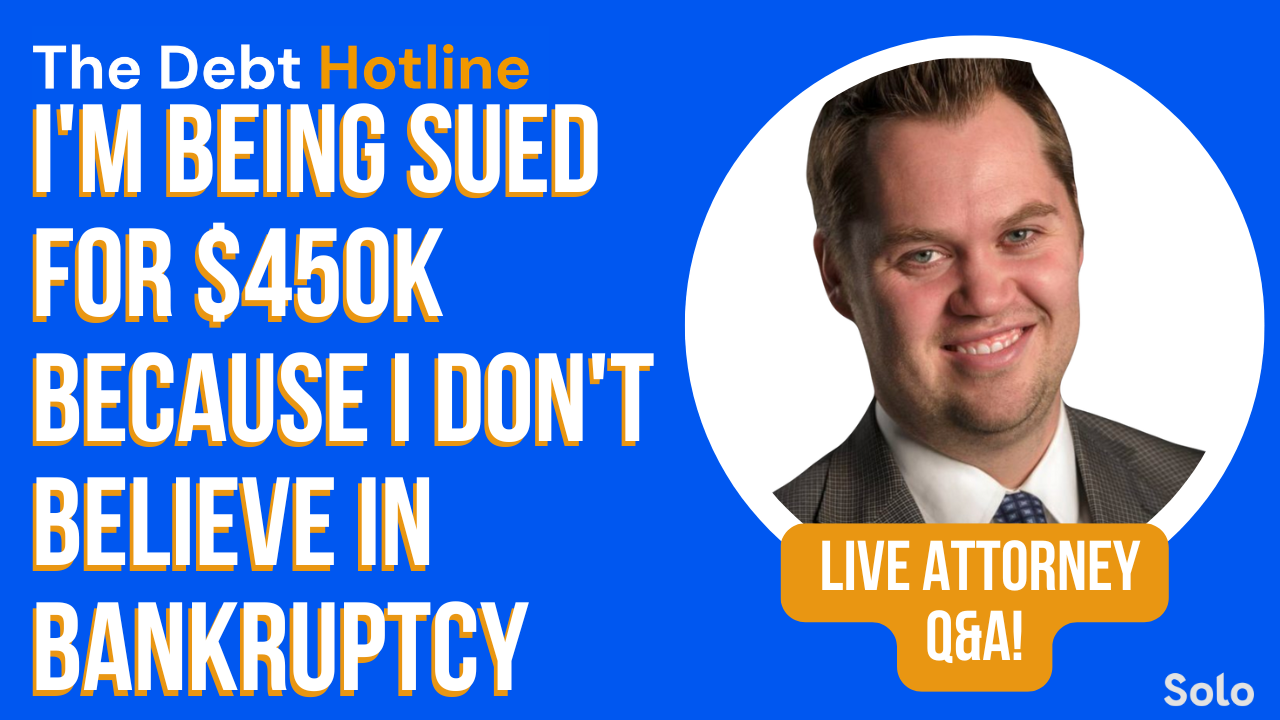
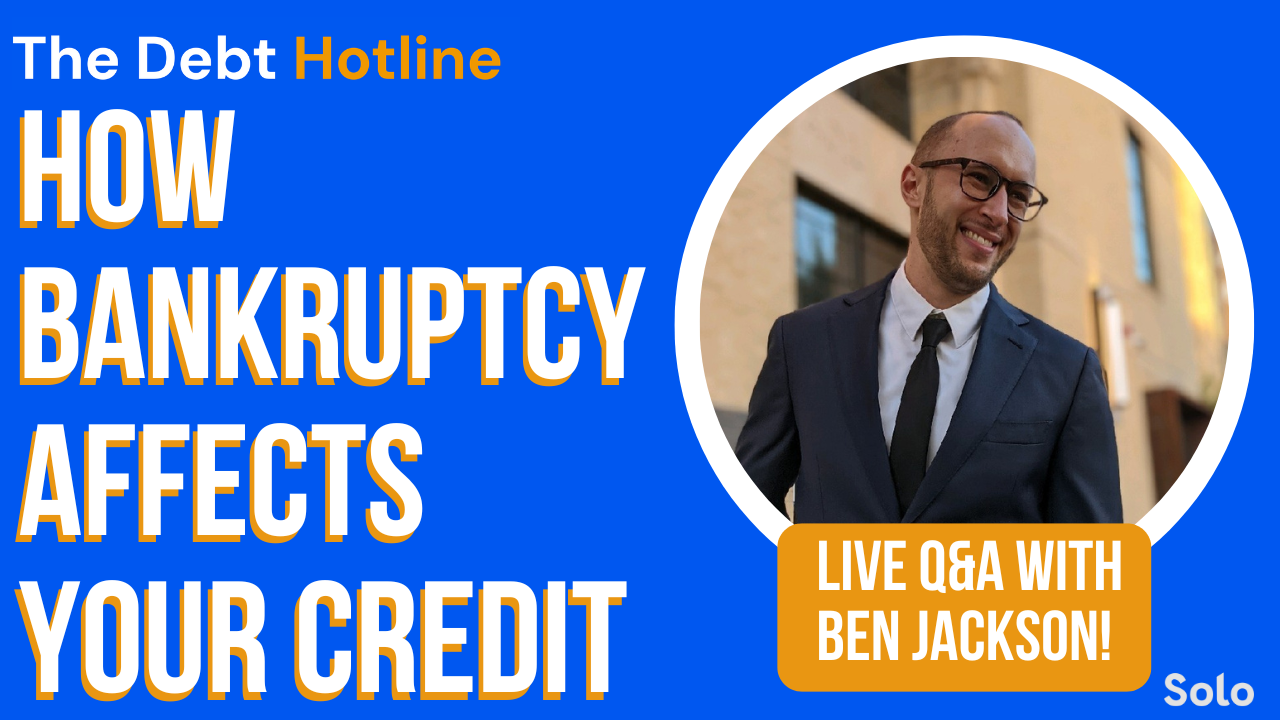
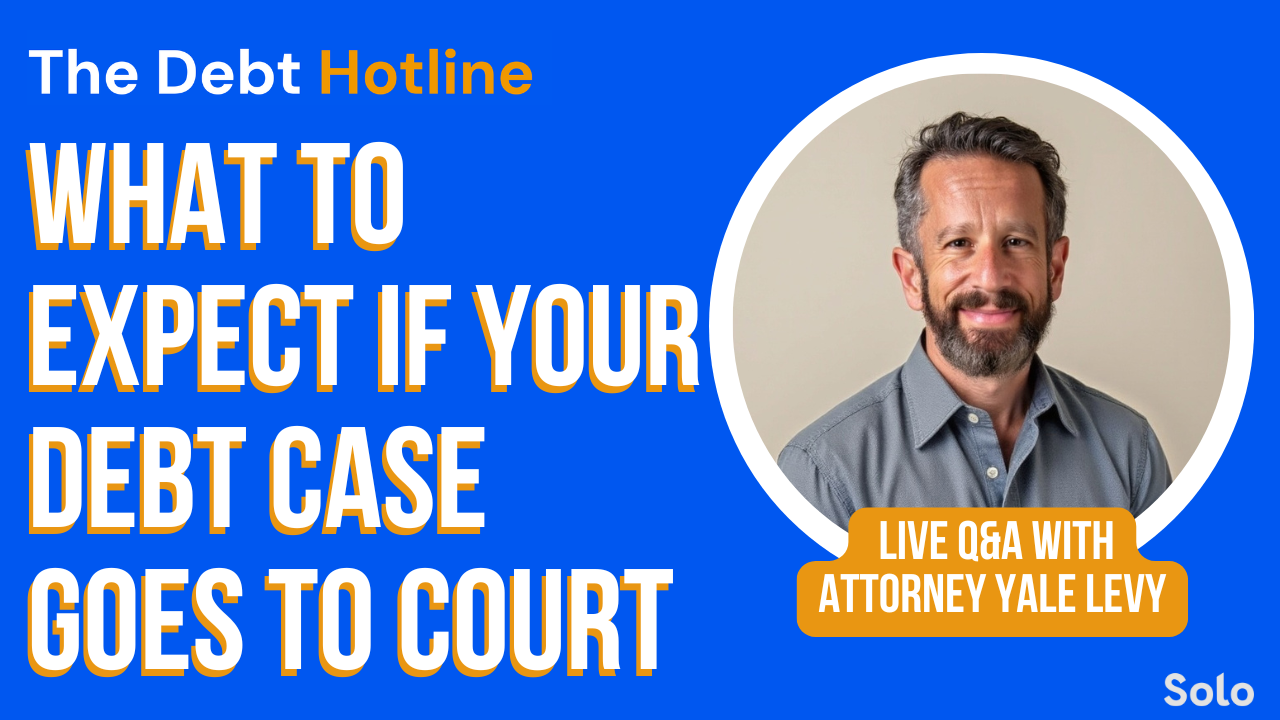

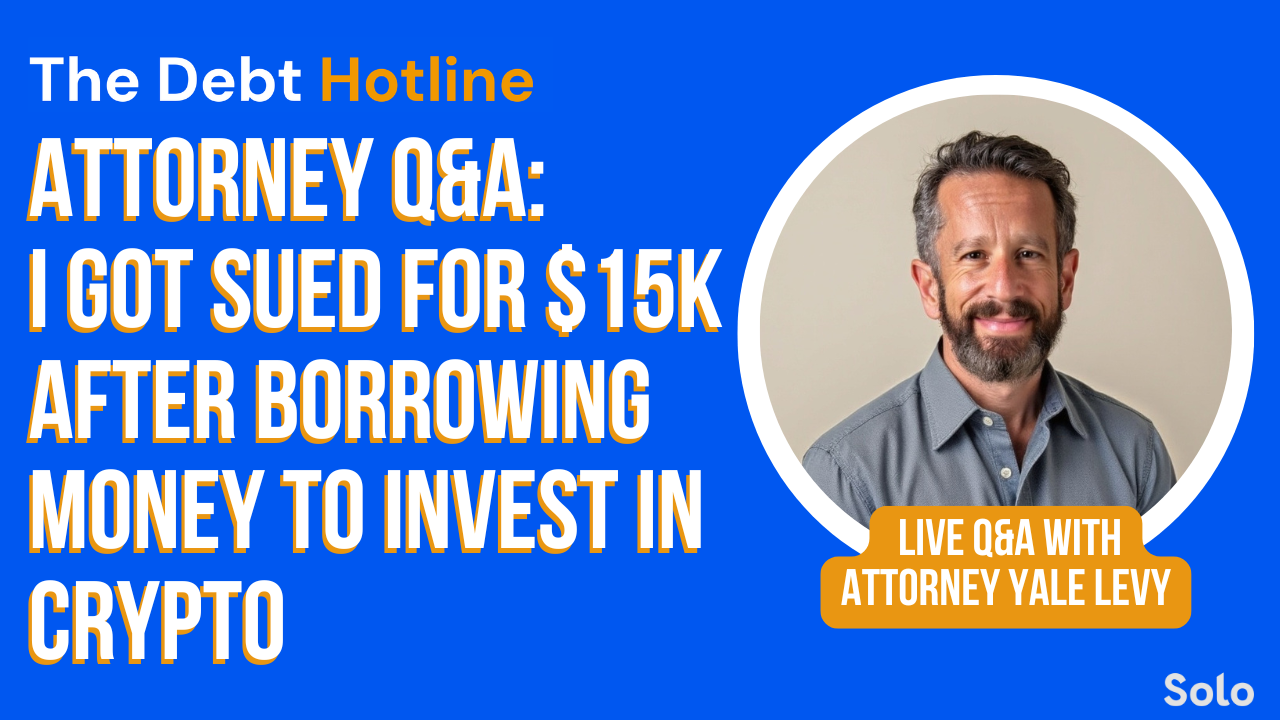
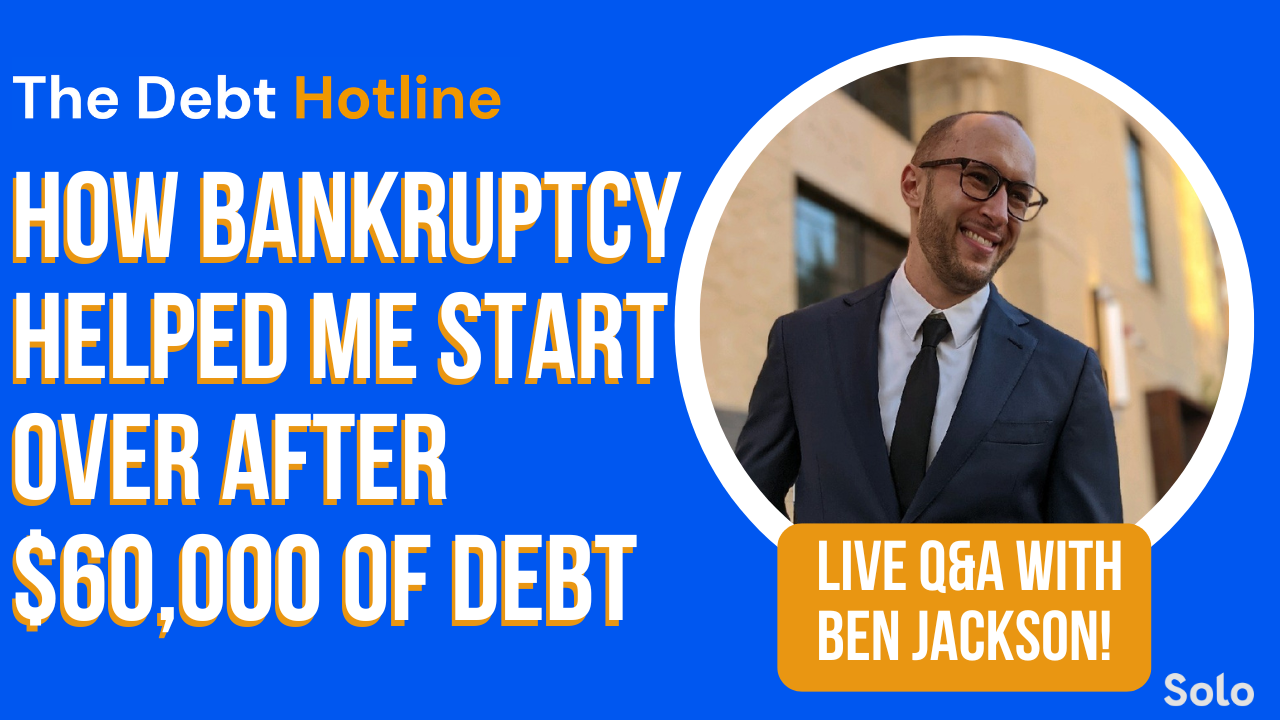
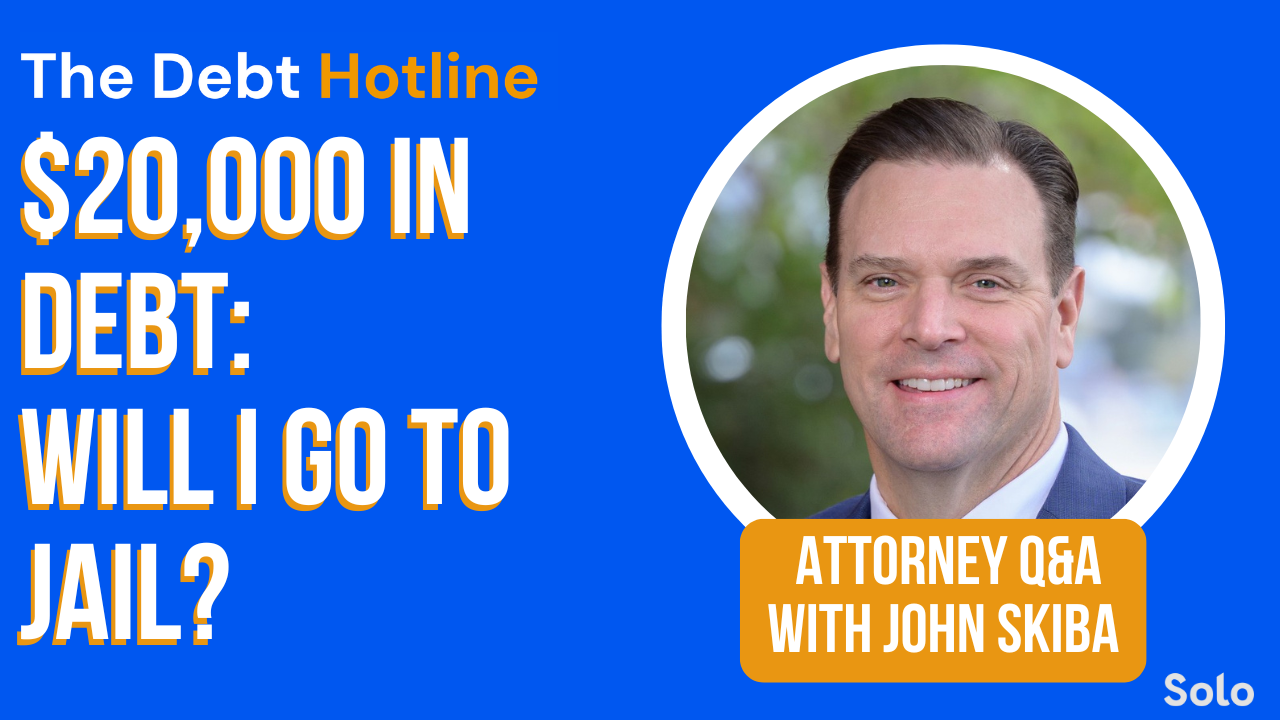
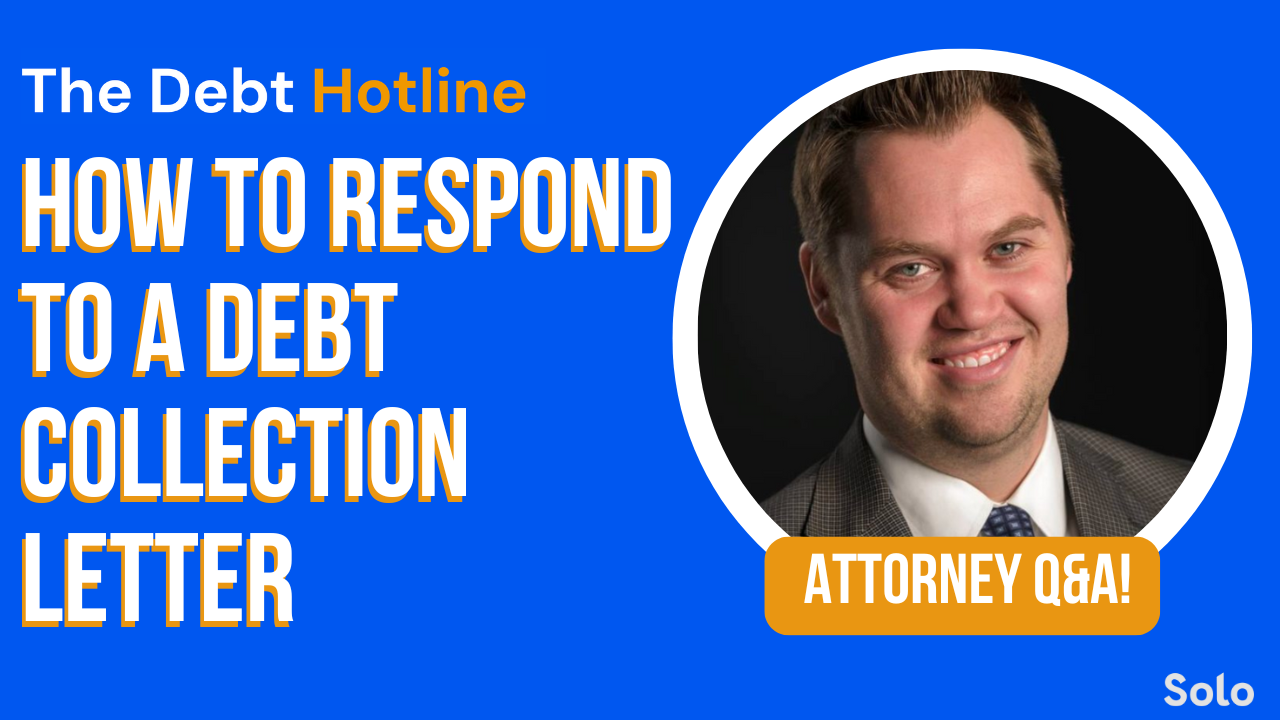
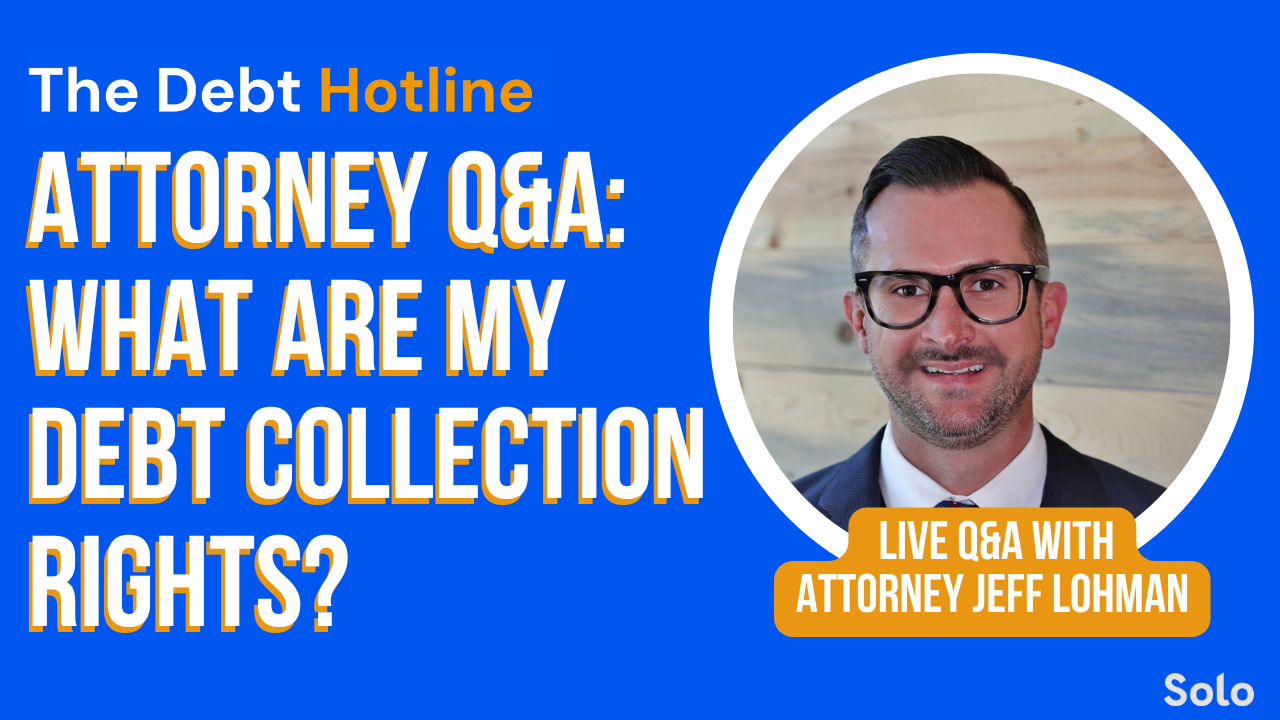

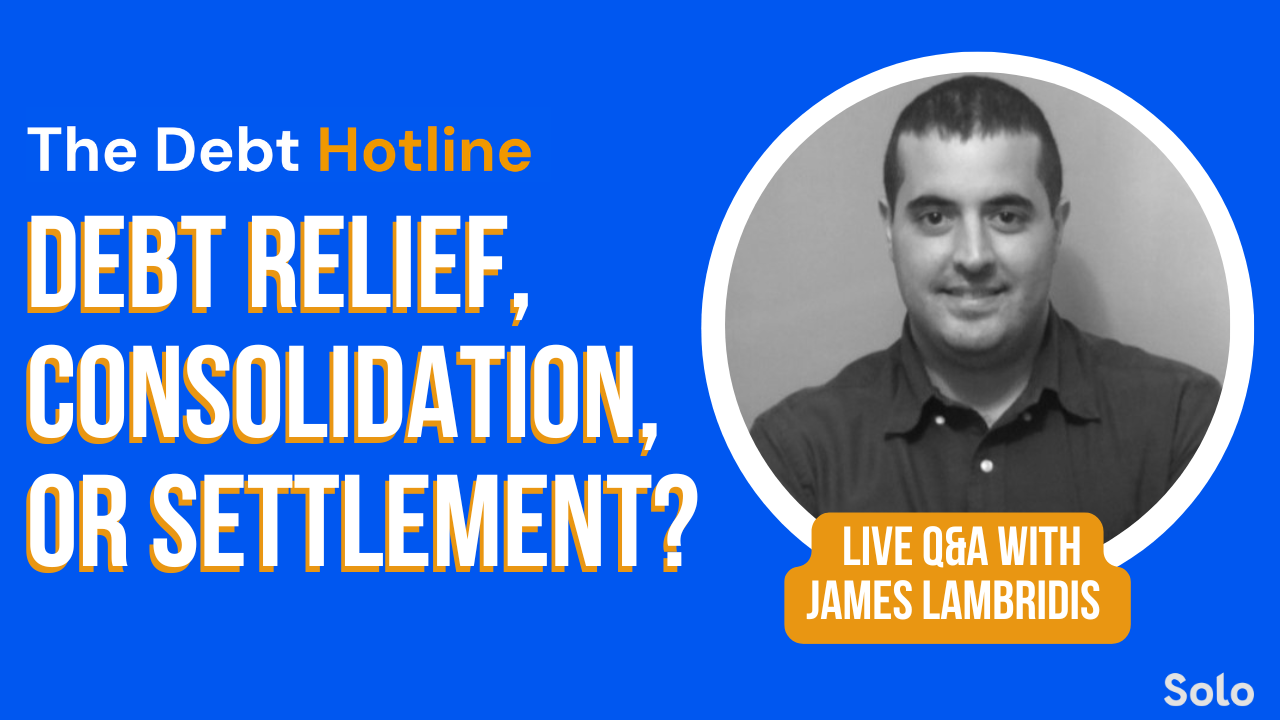
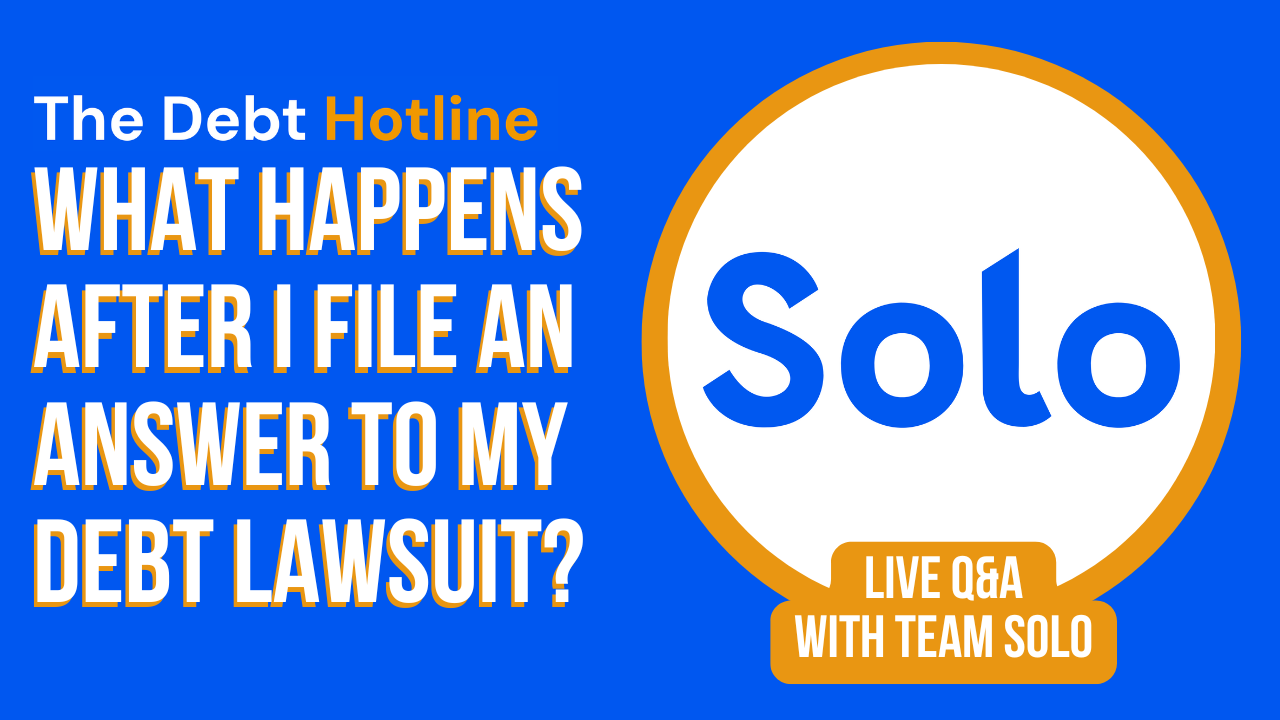
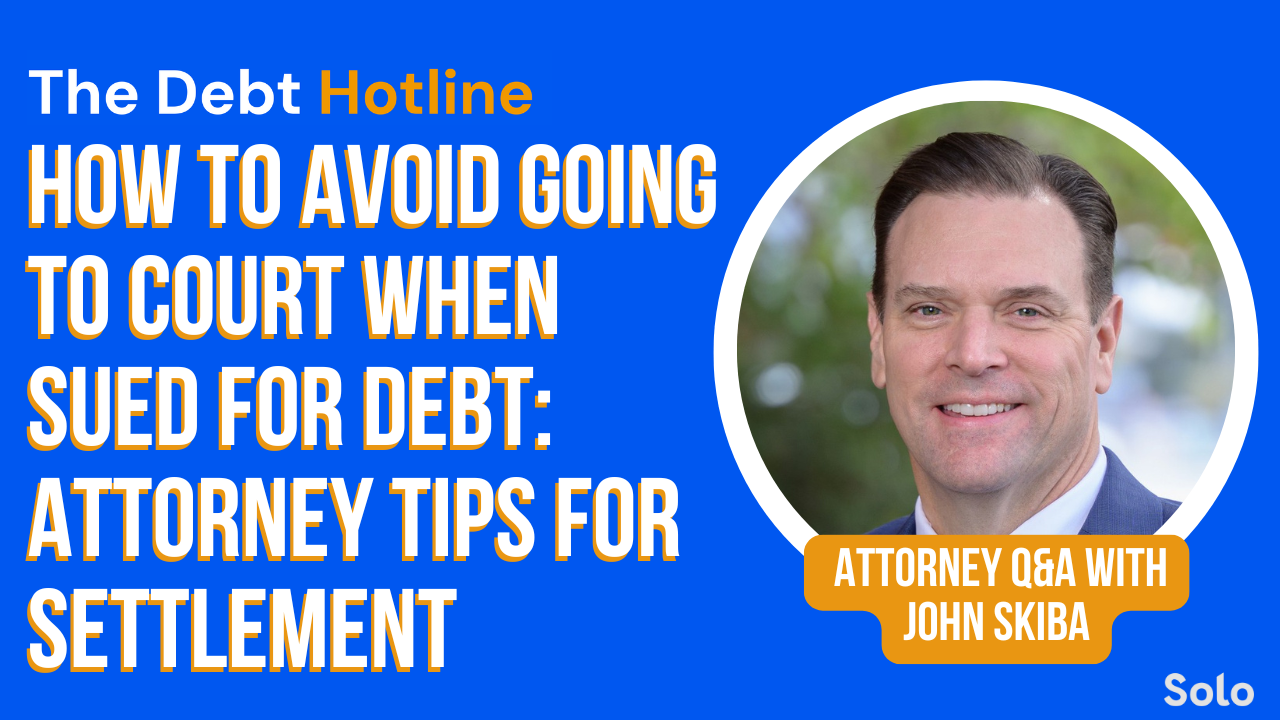


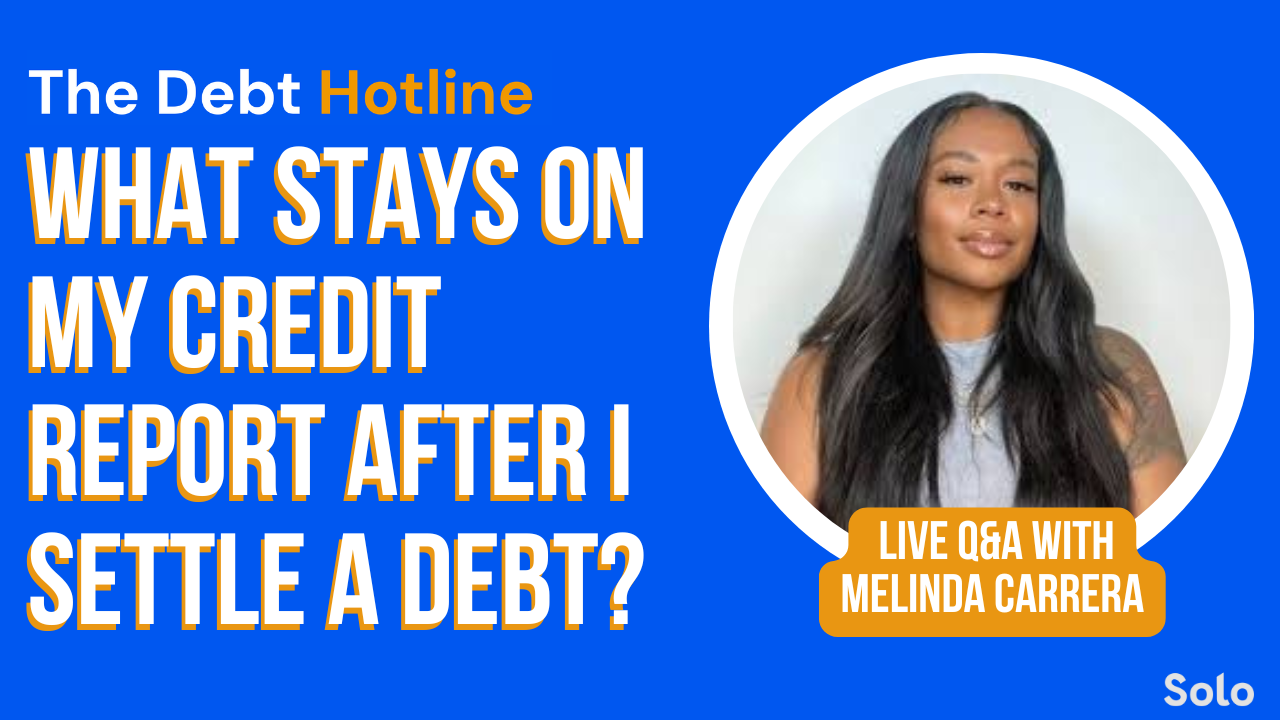
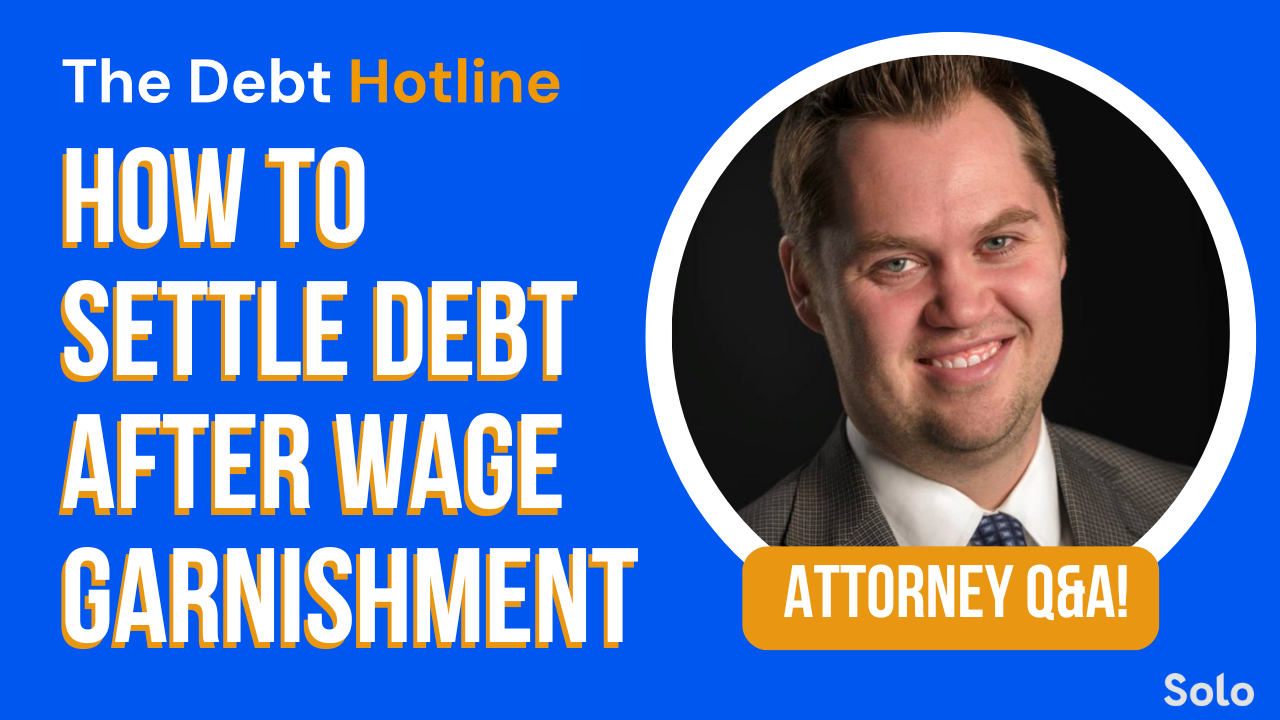
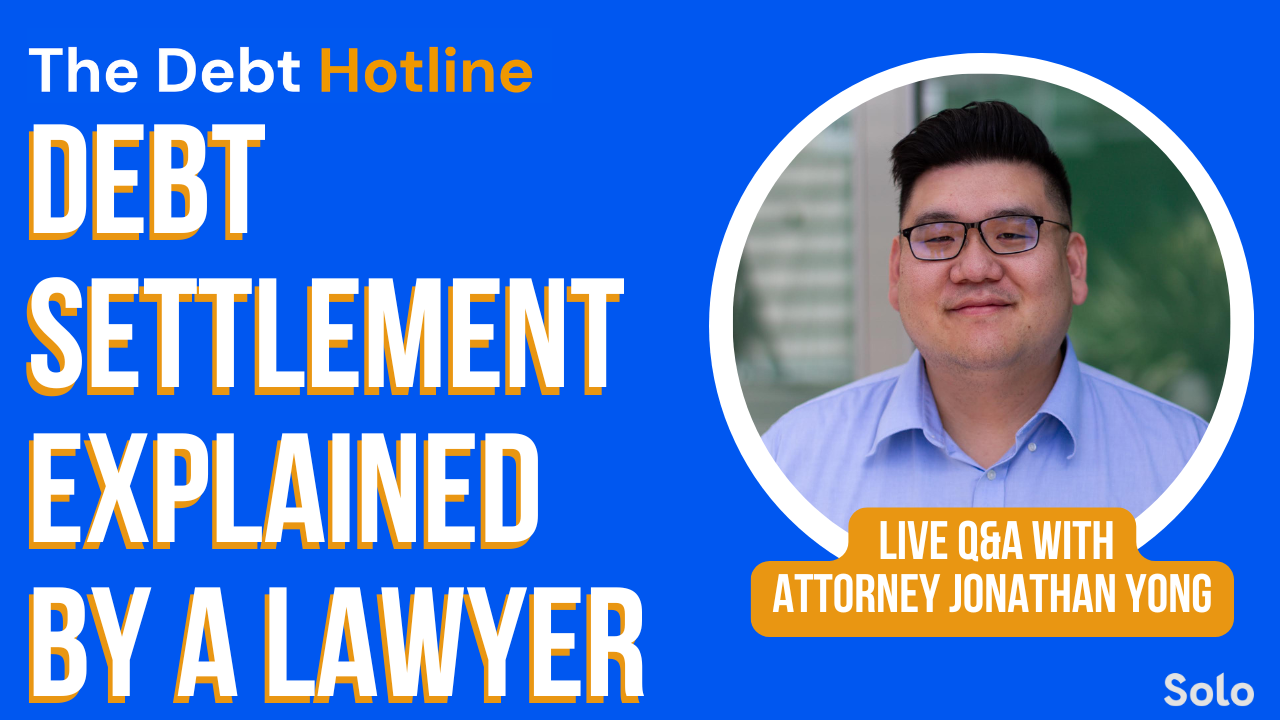
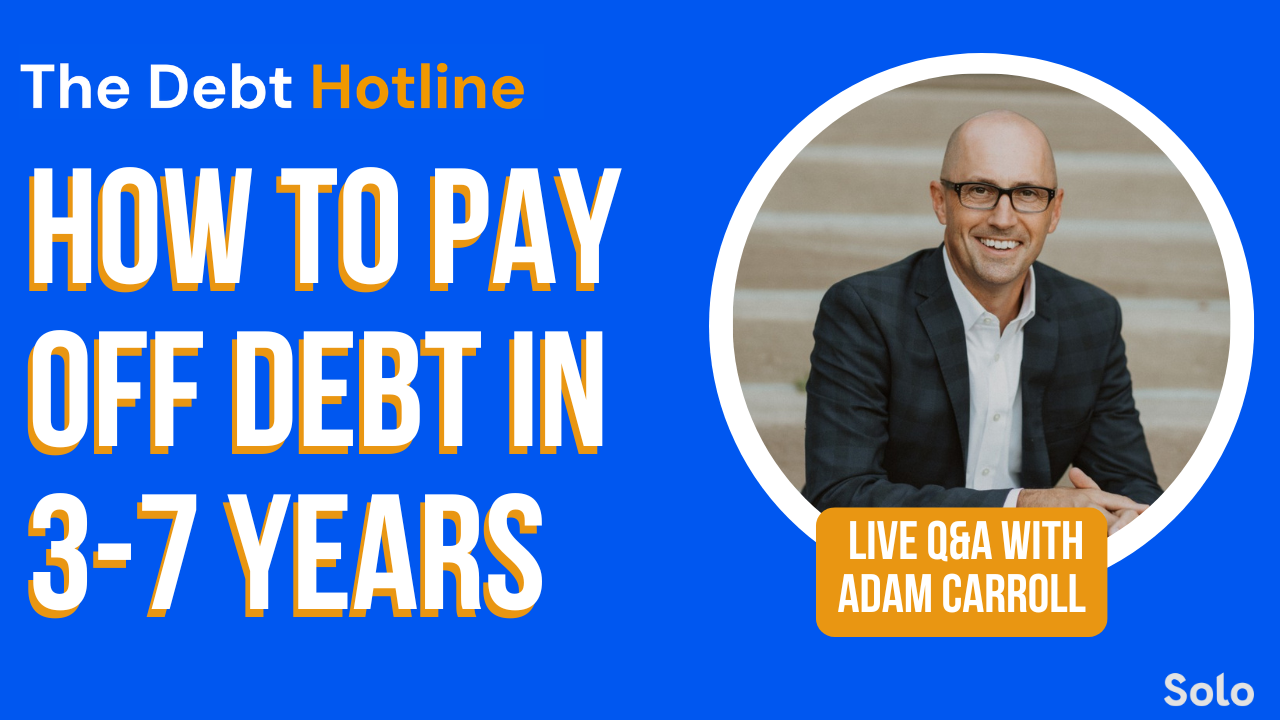
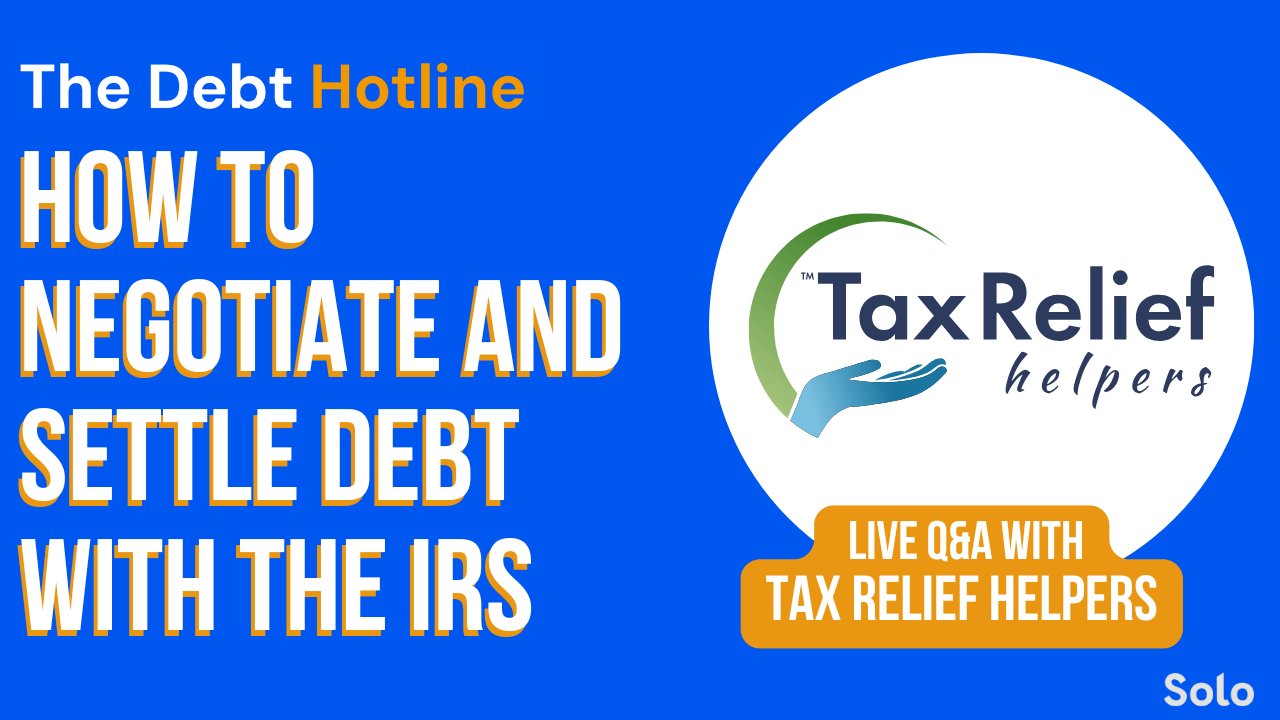
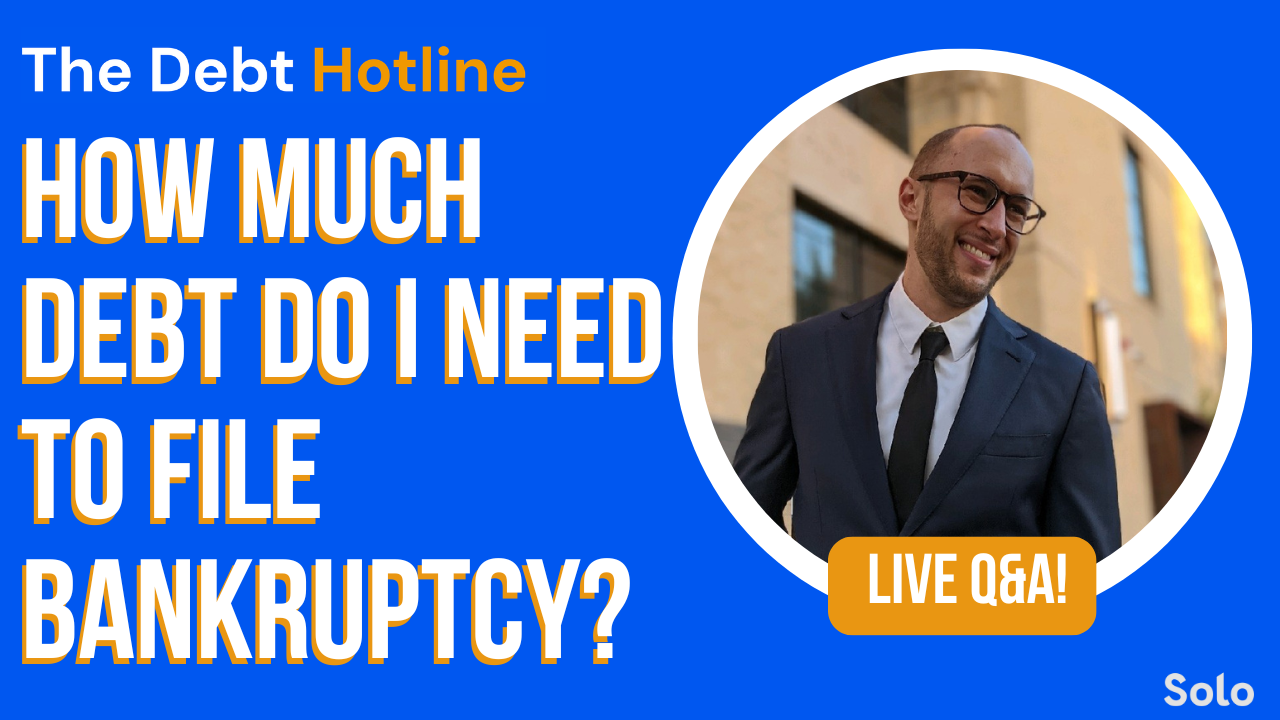


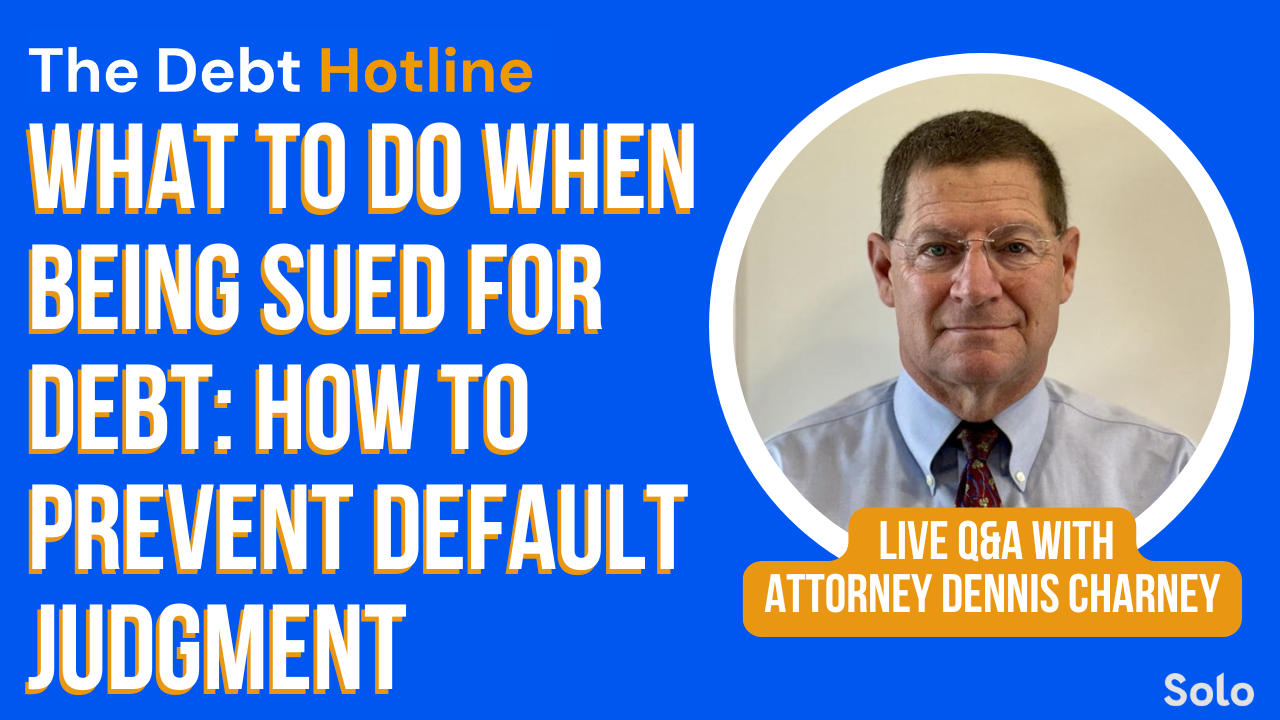
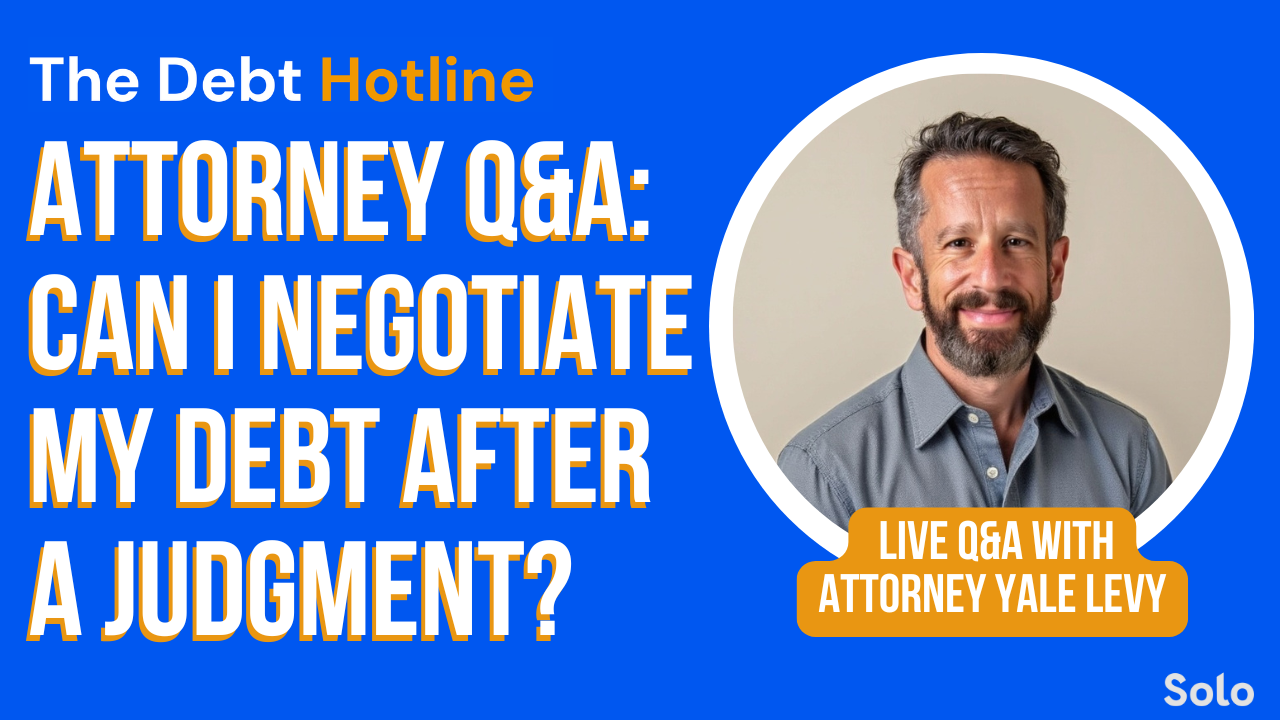
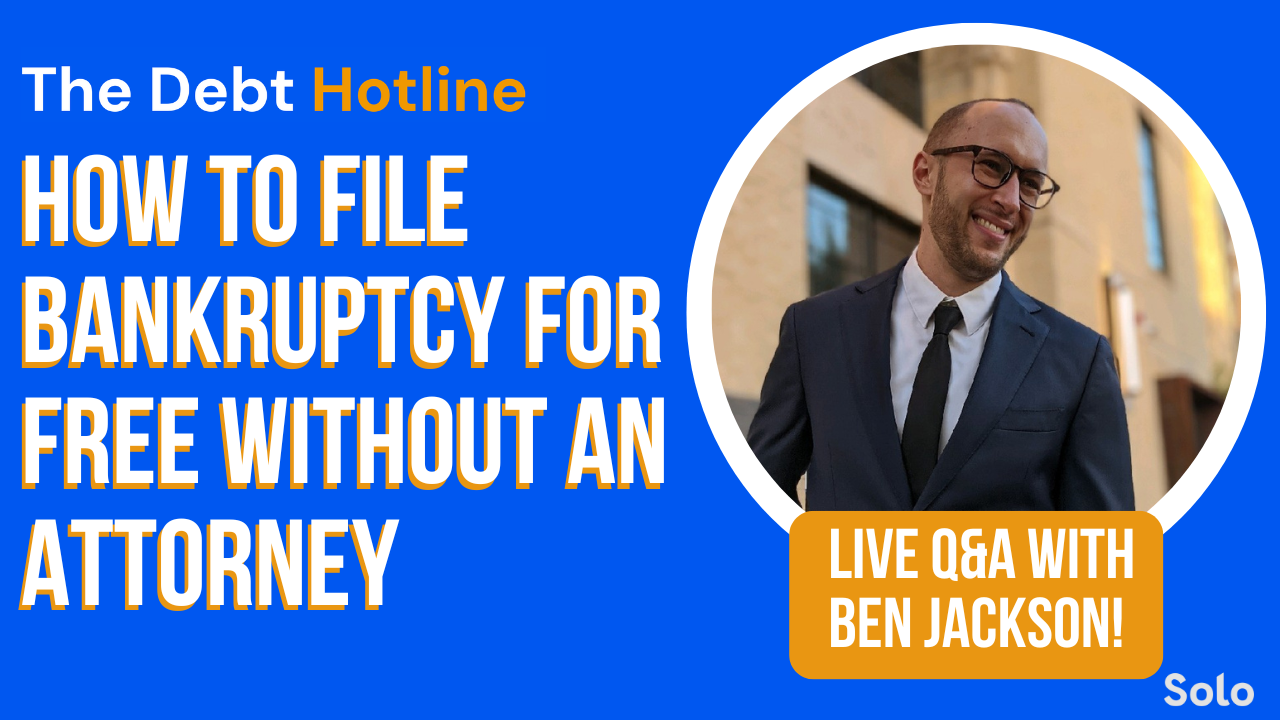
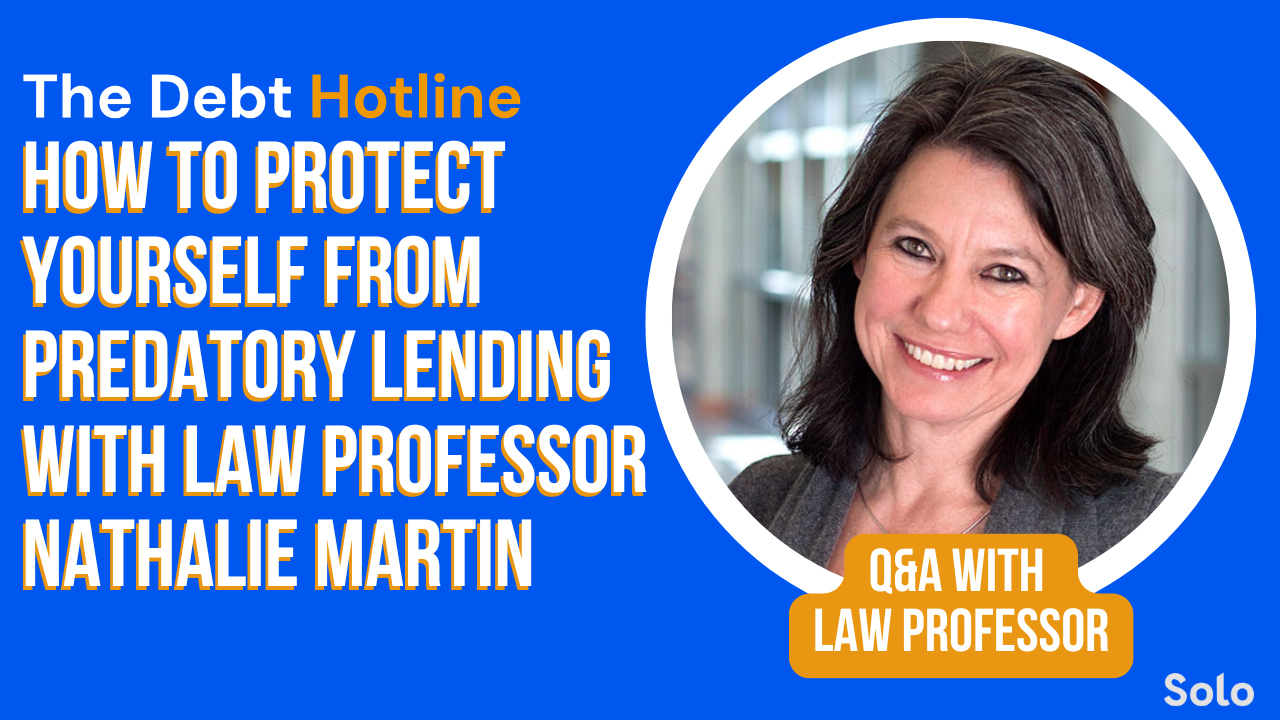
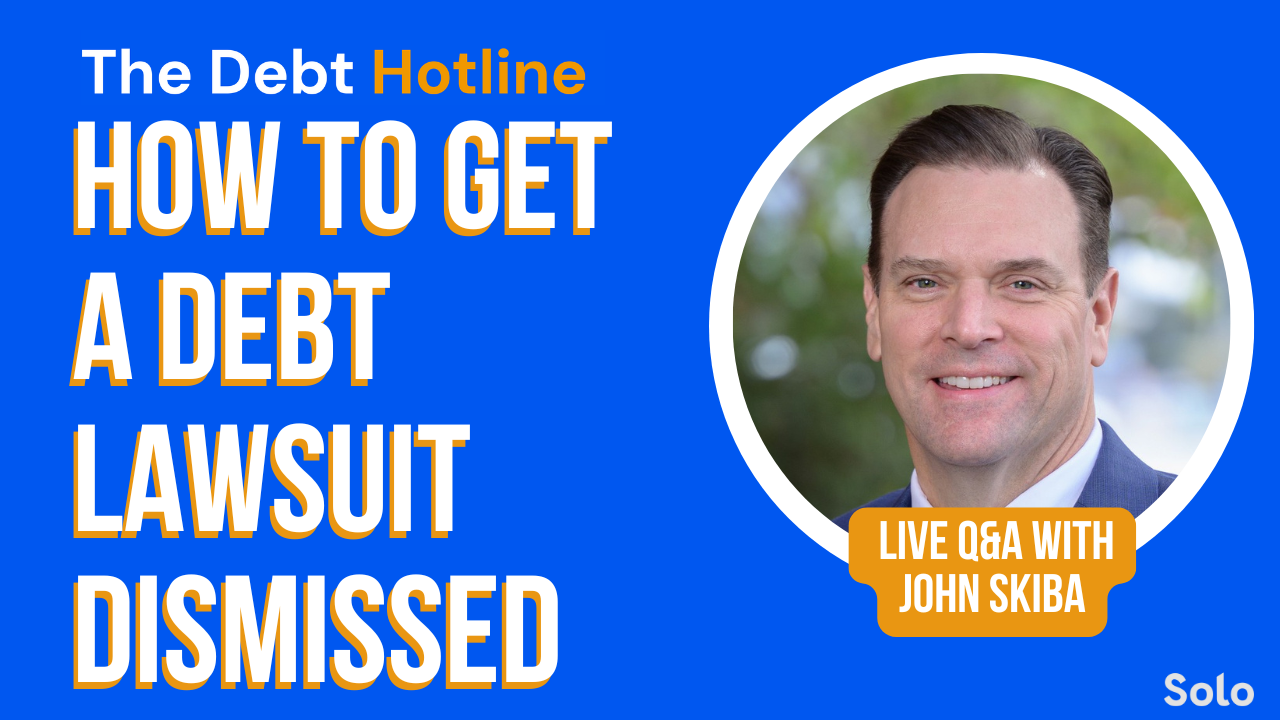
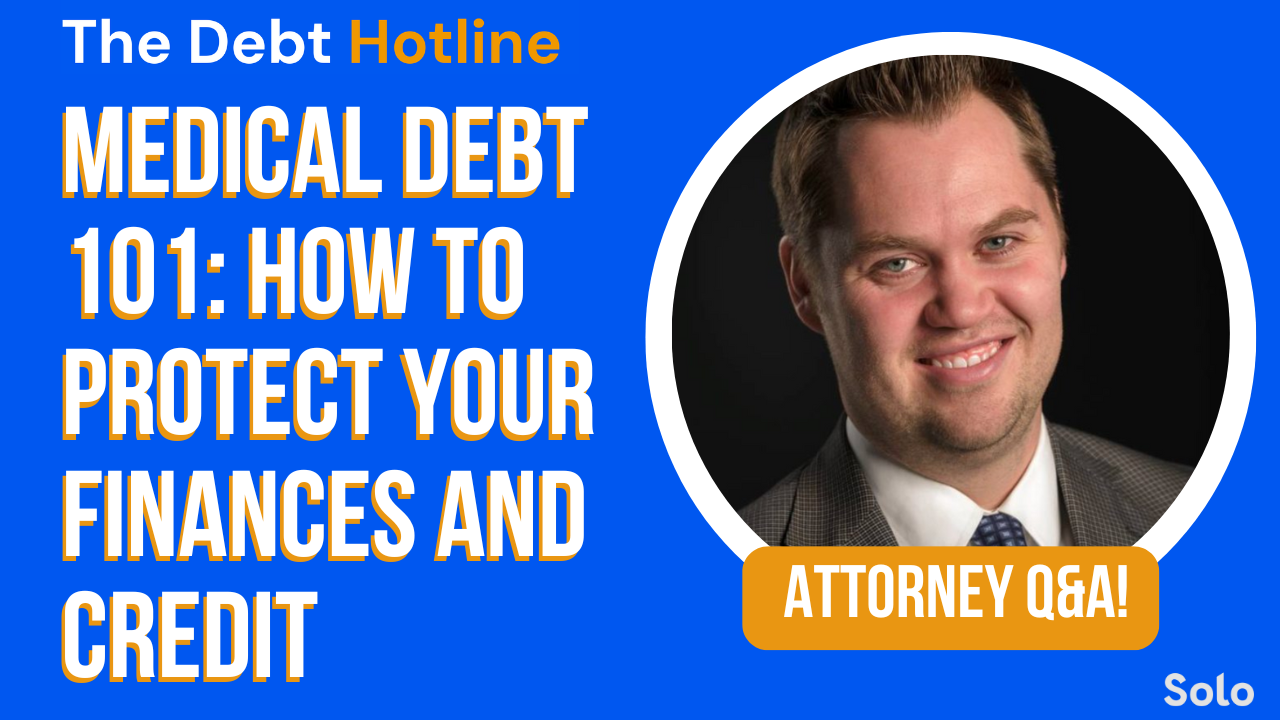

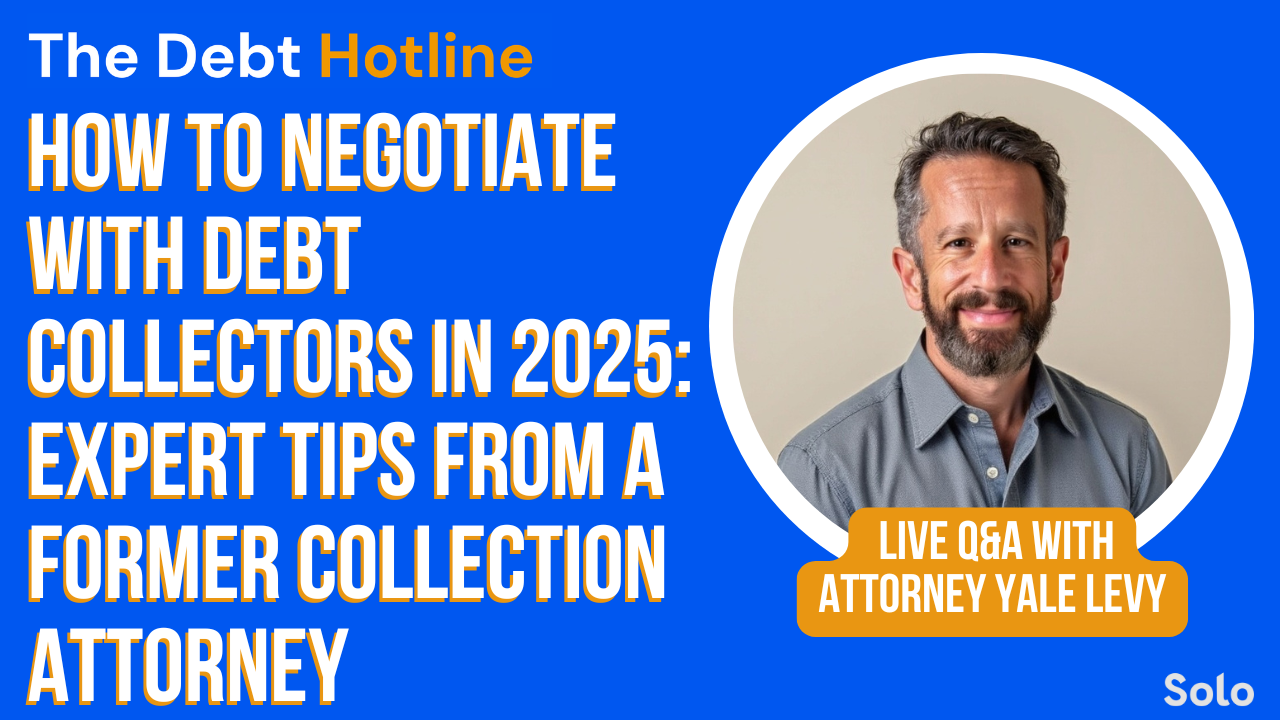
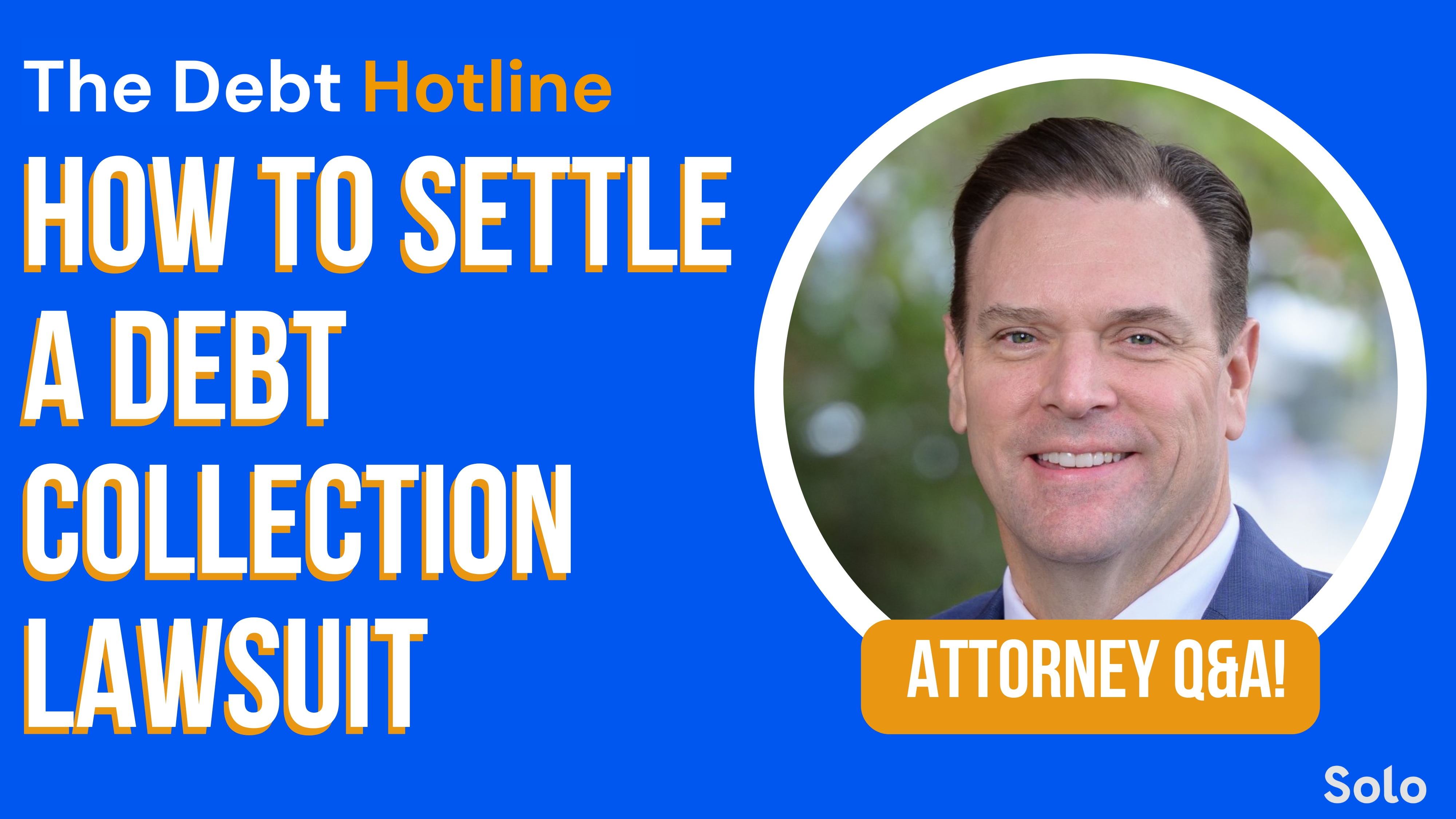














































































































































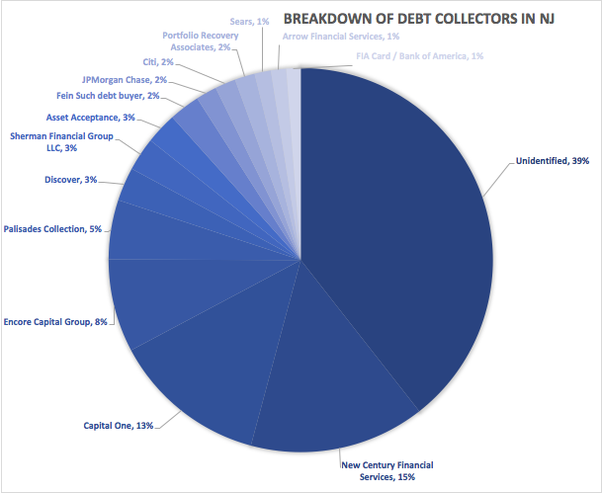

.png)